Bloomberg: Naira Breaks Away from Oil as Confidence in FG’s Reforms Grows
Appreciates to N1540/$ on parallel market

Appreciates to N1540/$ on parallel market
Mark declares party has no preferred presidential choice, pledges transparency Lukman: Coalition won’t handover structures to Atiku, Obi, Amaechi, others, says Dumebi Kachikwu long expelled
Idris: Coalition backers bias over alleged reforms stagnation









E-sports competitions
Engineering Corner
AI Labs Fun Zone And more





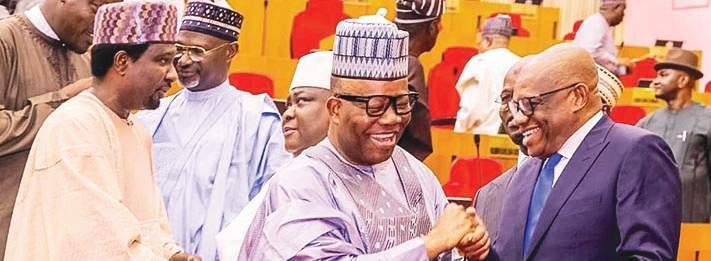
CJN: It’s democratic tool for wealth creation, national stability Urges judges to be responsive to evolving commercial realities EFCC convicts 12 of 58 entities operating ponzi schemes N’Assemby moves to transition IST to normal court
Ndubuisi Francis in Abuja
Vice President, Senator Kashim Shettima has identified the capital market as a critical tool for diversifying the nation’s economy away from over-reliance on a single commodity, with a view to fostering indigenous industrialisation, and attracting both domestic and foreign direct investments.
A well-functioning capital market, he argued, can unlock latent wealth, deepen financial inclusion, and ultimately improve the living standards of the citizens.
The Vice President spoke in Abuja, Monday at the opening of a two-day Capacity Building Interactive Workshop on Capital Market Law, Ethics and Judicial Interpretations for Judges of Superior Courts, jointly convened by the Securities and Exchange Commission (SEC)and the National Judicial Institute (NJI).
Participants at the workshop included judges, parliamentarians, regulators, legal and capital market experts who are deliberating on ways to modernise dispute resolution in Nigeria’s capital market and ensure the system keeps pace with globally evolving financial practices.
Represented by the Special Adviser to the President on Economic Matters, Tope Fasua, the VP described the capital market as the conduit through which national savings are channeled
into productive ventures, driving the wheels of progress and prosperity.
According to him, the theme of the workshop, “Repositioning the Nigerian Capital Market for National Economic Transformation through Effective Dispute Resolution,” was not merely a topic for discussion; but “a clarion call, a strategic imperative that resonates deeply with the economic agenda of this administration.”
Shettima stressed that this underscored the undeniable truth that a robust, efficient, and trustworthy capital market is the bedrock upon which sustainable national economic transformation can be built.
The Vice President observed the capital market is far more than just a platform for buying and selling securities, but is the lifeblood of modern economies, a sophisticated ecosystem that mobilises long-term capital for productive investments.
“It connects savers with investors, providing the necessary liquidity for businesses to expand, innovate, and create jobs. It is where infrastructure projects find funding, where small and medium enterprises (SMEs) can scale, and where the dreams of entrepreneurs can take flight.
“In Nigeria, a nation brimming with potential and a youthful, dynamic population, the capital market holds an even greater significance. It is a critical tool for diversifying our
economy away from over-reliance on a single commodity, fostering indigenous industrialization, and attracting both domestic and foreign direct investments.
“A well-functioning capital market can unlock latent wealth, deepen financial inclusion, and ultimately improve the living standards of our citizens. It is the conduit through which national savings are channeled into productive ventures, driving the wheels of progress and prosperity,” he stated.
Considering the sheer scale of national aspirations, including massive infrastructure development, a thriving digital economy, a revitalised agricultural sector, and a diversified industrial base, he submitted that none of these can be achieved without substantial, long-term capital, which is only available in the capital market.
According to him while the banking sector is vital, and primarily provides short-term financing, he explained that it is the capital market, with its
capacity for equity and long-term debt instruments, that offers the patient capital required for the transformative projects.
“It is the platform for public-private partnerships, for securitizing future revenues, and for allowing ordinary Nigerians to partake in the growth story of our nation,” he stressed.
However, he noted that the effectiveness of any capital market hinges on one fundamental and non-negotiable element--trust, add-
ing that investors, whether local or international, institutional or retail, will only commit their hard-earned capital where they are confident that their investments are secure, that transactions are transparent, and that their rights are protected.
This confidence, he stressed, is built on a foundation of strong regulatory frameworks, efficient market operations, and, crucially, an effective and impartial system of dispute resolution.
Sunday Aborisade in Abuja
In a significant diplomatic and legislative milestone, Nigeria and Malawi have taken a major step toward deepening bilateral relations and strengthening democratic institutions across Africa.
This comes as the National Institute for Legislative and Democratic Studies (NILDS) yesterday hosted a capacity-building workshop for a delegation from the Parliament of Malawi, led by its First Deputy Speaker, Hon. Madalitso Kazombo.
The workshop, which opened
The Centre for Social Justice (CSJ) has lampooned the federal government for neglecting local tractor manufacturers as well as other homegrown agricultural innovations for foreign products and goods.
The criticism followed the recent importation of 2,000 tractors from Belarus.
Lead Director, CSJ, Eze Onyekpere while speaking in Abuja, at the National Workshop on Improving Visibility and Linkages between Agricultural Research Extension Services and Farming for Sustainable Food Value Chain in Nigeria, yesterday, queried the rationale behind abandoning indigenous research outputs in favour of
foreign imports, adjudging the move a disservice to agriculture development in the country.
He said: “Government can afford to do better. But the important thing is, what is the value of producing results and letting it lie on the shelf?
For instance, the National Center for Agricultural Mechanisation has produced mini-tractors, weeders, harvesters, and threshers.
“Recently, the President just launched 2,000 tractors. And I wanted to hear where they got it from. Of all places in the world, they were imported from Belarus.
“I was expecting if it’s not Nigeria maybe he should have said he got it from the United States, Britain, China, Japan, Germany, and suddenly it’s from Belarus. So what are we doing with the result of their research?”
He also decried the poor impact of publicly funded research institutes which affects agricultural productivity, emphasising that research outcomes should not sit on shelves or remain in academic journals, but be translated into real-world solutions that meet the needs of farmers particularly the smallholder women who are the backbone of Nigeria’s food system.
Onyekpere said: “We found out that we have so many research institutes that are publicly funded, from those in different crops to fisheries to animal husbandry.
“But we’ve not had improved productivity, improved yield per hectare, and been able to tackle the prevalent pests and diseases across the nation and across so many crop value chains.
at the NILDS permanent site in Abuja, was designed to enhance the institutional capacity of Malawi’s lawmakers and parliamentary staff.
It also highlighted Nigeria’s growing role as a leader in regional parliamentary diplomacy and legislative development.
Welcoming the Malawian delegation, Director-General of NILDS, Prof. Abubakar Sulaiman, emphasised the importance of sustained collaboration among African parliaments to entrench democratic values, legislative effectiveness, and people-centered governance on the continent.
According to Sulaiman, “This programme is not just about legislative training; it is a clear demonstration of Africa’s readiness to solve its problems by building strong institutions through cooperation and mutual support.
“NILDS is proud to facilitate this exchange of knowledge and best practices.”
The workshop, which would run throughout the week, is set to focus on critical aspects of parliamentary work, including legislative drafting, effective oversight, committee operations, policy analysis, and constituency engagement strategies.
Participants would also have the opportunity to interact with Nigerian lawmakers and visit key democratic institutions in the country.
In his keynote address, Kazombo expressed gratitude to NILDS and the Nigerian National Assembly for their warm hospitality and commitment to African solidarity. He described the visit as “a learning mission” that would strengthen legislative competencies and broaden
perspectives for lawmakers back home.
Kazombo said, “We are here to deepen our understanding of legislative processes, to exchange ideas, and to learn from the Nigerian experience.
“Nigeria has one of the most robust democratic systems in Africa, and the work being done by NILDS is a clear example of how institutional support can drive democratic excellence.” Kazombo further called for sustained engagement between African legislatures to build resilience, improve accountability, and respond more effectively to the challenges faced by citizens. He said, “As parliamentarians, our mandate is not only to make laws but to empower our people through quality representation.
Ahmad Sorondinki in Kano
Addressing journalists yesterday, at a joint press conference by Comptroller Kano, Jigawa Command Dalhatu Abubakar and Zonal Director, EFCC Kano Command Zonal director Ibrahim Shazali said, “Today is another milestone achievement which is the interception of undeclared foreign currencies at Mallam Aminu Kano International Airport.”
Abubakar added: “The suspects named - Ahmed Salisu with a Ghanian Passport G5347658 arrived the
A Ghanaian national, Ahmad Salisu, was on Monday arrested by the Nigeria Customs Service in collaboration with the Economic and Financial Crimes Commission (EFCC) at Mallam Aminu Kano International Airport (MAKIA) for allegedly laundering N650. The suspect with Passport G5347658 arrived the country from Saudi Arabia onboard Ethiopian Airlines at about 12:15 hours on July 7, 2025, was found in possession US dollars, pounds sterling, and West African Francs (CFA).
country from Saudi Arabia onboard Ethiopian Airlines at about 1215hrs on 7 July 2025.
“This monetary exhibit and suspects, before us today, were arrested by the officers of the Service, working in close synergy with other agencies and partners within and outside the country.
“On arrival, the suspect, like other passengers, was duly reminded of his obligation to declare any foreign currencies or negotiable instruments exceeding 10,000 USD in his possession, but declined to do so.”

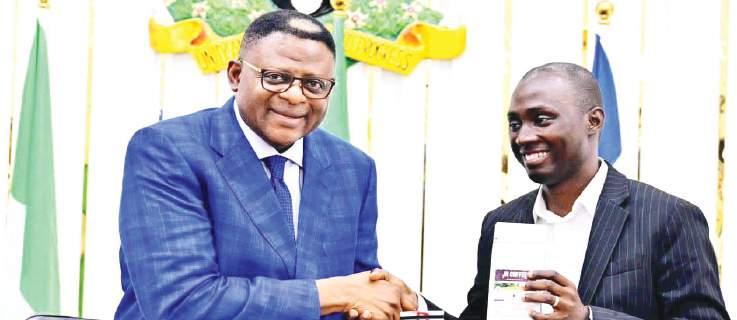
L-R:
The United States of America (USA) has implemented a new visa policy that drastically reduces the validity period and entry privileges for most
non-immigrant, non-diplomatic visa holders from Nigeria and some other countries.
Under the updated reciprocity guidelines announced by the U.S. Department of State, effective immediately, most Nigerian travellers
would now be issued single-entry visas valid for just three months.
In a statement yesterday, the U.S. Mission in Nigeria emphasised that the move was not punitive but part of standard global practice.
It added that Nigeria’s current
visa policies for the US citizens were also a factor in the decision.
“The United States Department of State has announced updates to its reciprocal non-immigrant visa policy, impac1ting several countries, including Nigeria.
The federal government yesterday reiterated its commitment to providing Nigerians with a reliable electricity supply, stressing that to achieve the $32.8 billion needed to achieve this milestone will require the deployment of innovative solutions.
The Minister of Power, Chief Adebayo Adelabu, said this at the ‘Mission 300’ Stakeholders Engagement meeting, held at the Transcorp Hilton Hotel in Abuja, where he announced that $15.5 billion of the total sum is expected to be sourced from the private sector.
Mission 300 is an initiative focused on connecting 300 million people in Sub-Saharan Africa to electricity by 2030. Led by the World Bank Group and the African Development Bank Group (AfDB), it aims to address the significant energy access gap on the continent and accelerate the transformation of Africa’s energy sector.
Adelabu stated that the federal
government was setting the power sector on the path of sustainability and bankability by prioritising the different reforms being undertaken in the sector, explaining that these are critical to the economic growth and development of the nation.
He said the stakeholders meeting would provide an opportunity to align, strategise, and to build the partnerships needed to move from Nigeria Energy Compact, to concrete results, calling on development partners, the private sector, philanthropic actors, the public sector, and the civil society organisations to rally around this mission.
“Mobilising this level of financing will demand innovation, coordination, and a shared commitment. In this room today are many of the institutions and individuals who can help us shape the future of Nigeria’s energy sector.
“Let us take this opportunity to ask hard questions, identify the practical solutions, and develop actionable plans that will make universal access a reality not just
in the policy space, but in the daily lives of our citizens by powering our hospitals, our schools, our industries, and our homes”, Adelabu said.
He announced the priorities of the government in power sector reforms to include addressing the market liquidity issues and initiating required sector reforms.
“Currently, there’s a huge outstanding debt to the Power Generation Companies in the form of unpaid government subsidies which stands at about N4 trillion as of December 2024. The federal government is already working out modalities to defray this obligation and to ensure that further obligations are not accrued going forward.
“The government is working on a plan to transition the sector to a fully cost-reflective regime while implementing targeted subsidies for the economically vulnerable citizens in the country.
“Improving our power generation through recovery of idle capacities and expanding energy mix to ensure energy security, and to dilute the
Emma Okonji
The federal government has commissioned the fully refurbished and restored Kano Digital Industrial Park, reaffirming its commitment to inclusive digital growth, youth empowerment, and strong private sector collaboration.
The facility which suffered significant damage during the August 2024 protests has now been fully restored through a generous intervention by IHS Nigeria.
power pool with cheaper and cleaner energy sources (is in course),” he added.
Other areas he identified included: Expanding transmission infrastructure to deliver more power, ensuring stability of the national grid to put an end to several grid disturbances and collapses previously observed, and to further strengthen the coordination and management of the national grid.
Besides, he stated the resolve of the government in ensuring viability and performance improvement of the distribution segment of the power sector through strategic programmes like the Presidential Metering Initiative (PMI) and the World Bank-funded Distribution Sector Recovery Program (DISREP).
“Effective immediately, most non-immigrant and non-diplomatic visas issued to citizens of Nigeria will be single-entry visas with a three-month validity period.
“Those U.S. non-immigrant visas issued prior to July 8, 2025, will retain their status and validity.
“We wish to underscore that, as is standard globally, visa reciprocity is a continuous process and is subject to review and change at any time, such as increasing or decreasing permitted entries and duration of validity.
“You can view the latest information on visa reciprocity schedules for all countries at travel.state.gov.”
It added: “U.S. visa criteria and standards are designed to protect the integrity of the U.S. immigration systems. These standards are based on global technical and security benchmarks.
“The U.S. Mission is working with the Government of Nigeria to ensure that Nigeria can meet the criteria.
“Examples of standard criteria include, Secure Travel Documents: Ensuring countries issue secure travel documents with verified traveller identities.
“Visa Overstay Management: Implementing measures to limit overstays by travellers on the U.S.
visas.
Information Sharing: Sharing relevant security and/or criminal record information to protect public safety.
“The United States values its longstanding relationship with Nigeria and remains committed to expanding our partnership based on mutual respect, shared security priorities, and economic opportunity, keeping both our countries safer and stronger.”
It commend ongoing efforts by Nigeria’s immigration and security agencies to meet standards of international best practices.
“We continue to engage with Nigerian government officials to address the remaining challenges.
“Nigerian travelers are encouraged to respect and adhere to the terms of their visas and ensure travel documents are authentic, accurate, and up to date.
“The United States remains a committed partner in deepening people-to-people ties with Nigeria via business, educational, and cultural exchanges. We look forward to continued cooperation at all levels with the Nigerian public and government officials to ensure safe and lawful travel between the United States and all countries,” it added.
David-Chyddy Eleke in Awka
the ones protecting you from Fulani herdsmen.
“They live in the bushes for months, but no one has ever asked how these so-called liberators survive in the forest. They have to feed, who is paying for their services, don’t they have needs?
ment’s (Fulani) Ranching compliant State and sitting the state on a keg of jihadist gunpowder.”
Delivering his opening remarks, the Executive Vice Chairman of the NCC, Dr. Aminu Maida, emphasised the strategic importance of the park and reaffirmed the Commission’s commitment to enabling Nigeria’s digital future.
“The re-commissioning of the NCC Digital Industrial Park in Kano is a landmark moment in our journey
The commissioning ceremony, which held recently, was led by the President of Nigeria, ably represented by the Honourable Minister of Communications, Innovation and Digital Economy, Dr. Bosun Tijani.
to accelerate ICT innovation and empower the next generation of digital pioneers.
“This facility will serve as a catalyst for digital inclusion, economic transformation, and youth empowerment not just in Kano, but across the entire Northwest region,” Maida said.
Speaking on behalf of the governor of Kano State, the Deputy Governor, Aminu Abdussalam Gwarzo, reaffirmed the state’s digital ambition and expressed deep appreciation for the partnership that made the park’s restoration possible.
Anambra State Governor, Prof. Chukwuma Soludo, has told Anambra indigenes resident in the US that criminals terrorising the South east were not Fulani but Igbo indigenes. There have been the notion that most of the kidnap activities taking place in the South East were done by Fulani terrorists living in bushes in the zone and disguising as herdsmen, which intent to conquer.
But addressing indigene of Anambra in the US, during a town hall meeting in Maryland, the governor insisted that 99.99 percent of criminals arrested in Anambra were not Fulani, but Igbo.
“The so-called liberators hiding in the forests are homegrown criminals feeding fat on blood money. They come under the guise that they are
“In my three years and three months in office, 99.99% of the kidnappers and other criminals we’ve arrested are Igbo. Let’s stop the lies. Igbo are kidnapping and killing fellow Igbo, not Fulani.”
But a rights group, International Society for Civil Liberties and Rule of Law (Intersociety) has countered the governor, insisting that herdsmen were actually in the bushes in the zone.
He accused Soludo’s administration of “shielding Jihadist herdsmen since 2022 and dangerously dragging Anambra State into federal govern-
In a press statement by the Board of Trustees Chairman of the group, Mr Emeka Umeagbalasi, it said, “We’re strongly puncturing Governor Charles Soludo’s Maryland speech in USA, exonerating Jihadist Fulani Herdsmen in Anambra’s Forest and Farmland Insecurity.”
Umeagbalasi added that some communities in Awka South, Awka North, Oyi, Ayamelum, Orumba South and North, Dunukofia, all have camps habited by Fulani terrorists herdsmen.
“The state government has also severally been found to have joined conventional security establishments in the state and beyond in shielding these jihadists and shifting blames over their atrocities to militant IPOB or ESN or Unknown Gunmen.”

Building Powerful Business Partnerships for Progress

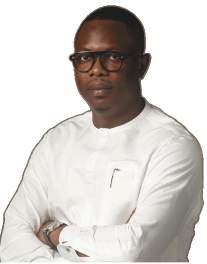


Date: 10th July 2025 Time: 11:00 AM (WAT) Venue: UBA House, 57 Marina, Lagos.
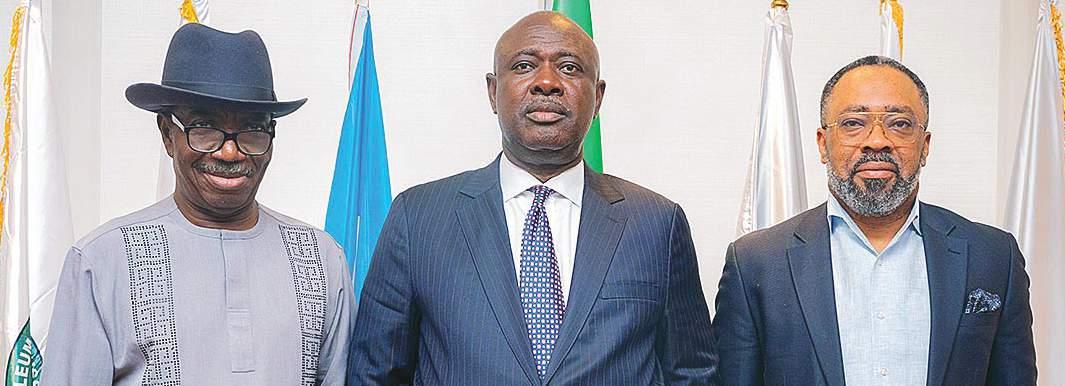
Amid growing tension between Nigeria’s bicameral legislature, the Senate on Tuesday pushed back strongly against accusations of legislative delays, revealing it approved six concurrence bills from the House of Representatives just last week.
The red chamber’s leadership, during plenary at the National Assembly Complex in Abuja, described claims from the House as unfounded and reiterated its commitment to cooperative lawmaking in the overriding public interest.
Senate President Godswill Akpabio and Senate Leader Opeyemi Bamidele made the clarifications in direct response to the House’s recent resolution to suspend consideration of Senate-originated bills.
The green chamber had cited what it termed persistent delays and inaction on over 140 House-passed bills, several of them reportedly sponsored by Speaker Rt. Hon. Tajudeen Abbas.
Akpabio, however, dismissed the claims, insisting the Senate cannot
joke with concurrence bills from the House of Representatives.
He stressed the upper chamber remains committed to working with its counterparts in the green chamber to advance legislative governance. Akpabio said: “It takes two hands to clap. We have been attending to the bills from the House of Representatives. We are still going to attend to them. We will continue to work together in the interest of Nigeria and Nigerians.”
Corroborating the Senate President’s position, Senator Bamidele noted the first two items on the Senate’s order paper for the day were concurrence bills from the House, emphasizing the upper chamber had acted on six such bills just last week alone.
“For the record, we have been doing what we are supposed to do,” Bamidele told colleagues, adding: “Only last week, the Senate concurred to six bills from the House of Representatives. We know we have the principle of reciprocity that governs our operations, but this does not mean garbage in, garbage out.”
He further stated that while cooperation remains critical, due diligence remains a constitutional duty.
The Senate Leader said: “We will continue to consider concurrence bills
The comedy industry in Port Harcourt is speculated to have grown into multi-billion naira per year business and is now attracting global attention, viewership, and foreign sponsorships.
This is as Talkoholic Unlimited, organisers of the Port Harcourt biggest indoor comedy show, ‘Mayor of Pitakwa Comedy Show’, has kick-started early plans for a spectacular event in 2026.
Mayor of Pitakwa Comedy Show which is hosted by a popular Port Harcourt-based comedian, Mr. Johnson Johnson (KO Baba), is held around April every year in the city of Port Harcourt.
Speaking at the unveiling of the theme for the 2026 event and its sponsor, yesterday, founder of Talkoholic Unlimited, KO Baba announced the 2026 theme of the event as, “KO Baba and His 12 Kings.”
He explained that for the event in 2026, he will be featuring 12 topflight artists from 12 cities in Nigeria, adding that the events
would also be streamed in the cities of origin of the invited artists.
KO Baba also used the event to unveil one of his partners, Sollong, which he said is a mobile device that pays users for patronising their device.
For 2026, the foreign android phone brand, Sollong, is said to have snapped the headline sponsor of the event billed for Easter Monday, 2026, while other sponsors are said to line up for slots.
Already, the annual show is said to make waves outside Nigeria to the extent that some foreign sponsors have indicated interest to use the show to reach the youths of the Niger Delta, after allegedly reviewing past performances where halls were filled up and tickets sold out days before the shows.
This is said to have boosted other comedy shows in the Garden City that also attract large sellouts and international attention.
Revealing the secrets of Port Harcourt entertainment industry, the Comedian-In-Chief, said he deploys local talents to occupy at least 80% of the comedians that
from the House of Representatives the same way they consider ours.
“We will ensure it is done in line with national interest and our legislative responsibilities under the 1999 Constitution.”
The development comes amid a rare public disagreement between both chambers of the National Assembly, potentially threatening the tempo of legislative business.
Despite the rift, the Senate leader-
ship maintained that inter-chamber collaboration remains non-negotiable. The remarks appear aimed at de-escalating tensions and reassuring the public of the National Assembly’s commitment to effective lawmaking.
Adedayo Akinwale in Abuja
The Corporate Accountability and Public Participation Africa (CAPPA) has urged the federal government to increase the Sugar Sweetened Beverages (SSB) tax from N10 per litre to at least N130 per litre. It added that a more robust SSB tax would reduce the consumption of sugar-laden drinks, lower the incidence of preventable illnesses, and improve national health outcomes.
The Executive Director of CAPPA,
Akinbode Oluwafemi, made the call on Tuesday in Abuja at the media roundtable on SSB tax, saying it offers a practical way to expand Nigeria’s fiscal space without increasing broad-based taxes.
He warned that Nigeria was in the throes of a public health crisis with the excessive consumption of unhealthy diets, particularly Sugar Sweetened Beverages (SSB).
Oluwafemi emphasised that at a time when oil revenues are volatile and public financing needs are growing, modifying consumption habits while raising domestic resources is both efficient and equitable.
He noted: “Nigeria is in the throes of a public health crisis, a
would feature in ‘Mayor of Pitakwa’ shows every year.
He said he is bent on building the comedy industry in Port Harcourt to compete with those of the biggest cities in the world.
He said: “My desire is to promote local content and show that you must not have to move over to Lagos as only way to succeed in the entertainment industry. It makes the local talents better and bigger. We want to show that your environment cannot limit you. It’s you that can limit yourself.”
KO Baba said his brand has become so strong globally that some teams from the United Nations agencies sought him and one other comedian out as platforms that have achieved consistency and are strong enough to reach the youths.
The Port Harcourt-based Akwa Ibom-born performer declared he stood to defy the notion that a talent must flee to Lagos to make it in the entertainment industry. “Without fleeing to Lagos, I have made it, and I want to make it bigger in April 2026. Big brands are now backing us.”
ticking time bomb driven by the excessive consumption of unhealthy diets, particularly SSBs.
“These sugar-sweetened beverages, popularly known as soft drinks and their likes, are killing us slowly, turning our streets into graveyards and our hospitals into crowded waiting rooms.”
The Executive Director said according to scientific and medical evidence, they are directly fueling the explosive rise in noncommunicable diseases (NCDs), including the slump-and-die trend we are currently witnessing across various parts of the country.
He noted a recent investigation by a leading national daily revealed that Nigerians spend an
estimated N1.92 trillion annually on healthcare related to these preventable conditions.
He added: “Increase the SSB tax so that it raises the final retail price of sugary drinks by 20 or 30 percent - or ideally 50 per cent, in line with WHO recommendations.
“Specifically, we are calling on the Nigerian government to increase the SSB tax from N10 per litre to at least N130 per litre. This will reduce consumption and push manufacturers to reformulate their products.
“Earmark revenue for healthcare, NCD prevention, nutrition education, basic health services in underserved communities, and school feeding programmes.”
nume ekeghe
Access Bank Plc, in partnership with UNICEF and Fifth Chukker, is again rallying global support for inclusive education in Nigeria through its annual Charity Polo Day, aimed at raising funds to build classrooms and improve learning opportunities for underprivileged children.
Access Bank, in a statement, noted the event’s 2025 edition will take place on Saturday, July 12, at the prestigious Guards Polo Club in Windsor, United Kingdom, bringing together diplomats, philanthropists, and business leaders for a day that blends sport, elegance, and social impact.
This annual charity event has become a hallmark of Access Bank’s enduring commitment to sustainable community development, particularly in the area of inclusive education. Over the past decade, this initiative has helped build and
equip classroom blocks in Kaduna State, directly impacting the lives of 14,000 children, and offering them a path to learning, growth, and opportunity.
Chairman of Access Holdings, Aigboje Aig-Imoukhuede, stated: “This is a platform that unites global changemakers around one common cause: investing in the future of Africa through education. The partnership with Fifth Chukker and UNICEF is symbolic and transformative.”
The 2025 edition will host a distinguished gathering of guests, including high-profile philanthropists, diplomats, captains of industry, among others. Guests will enjoy an exquisite polo tournament and a showcase of the real impact their support is making in underserved communities.
The funds raised at this year’s event will go towards constructing additional classroom blocks, enhanc-
ing learning environments, and supporting the long-term educational needs of children in rural Nigeria. Group Managing Director of Access Bank, Roosevelt Ogbonna added: “At Access Bank, we believe education is a fundamental right. By aligning our brand with purpose, we are proud to demonstrate that financial success and social impact can and must go hand in hand.” Also, Managing Director and Chief Executive Officer, Access Bank UK, Jamie Simmonds, emphasised the strategic significance of the initiative. His words: “This event reflects the essence of Access Bank UK’s vision, to serve as a bridge between continents, connecting purpose with prosperity. By championing education through this platform, we reinforce our belief that empowering young minds across Africa ultimately shapes a more inclusive and sustainable future for all.”

OFFICE OF THE EXECUTIVE
CHAIRMAN
20 SOKODE CRESCENT ZONE 5 WUSE, PMB 33, GARKI ABUJA, NIGERIA
www.firs.gov.ng
The Federal Inland Revenue Service (the Service) wishes to notify the public, particularly all Large Taxpayers, of the commencement of the National E-Invoicing Solution – the Merchant-Buyer model – with effect from 1st August 2025.
2. The E-Invoicing Solution is a strategic initiative designed to promote transparency, efficiency, and real-time visibility into business transactions across Nigeria. It aligns with global best practices in tax administration and supports the Federal Government’s goal of modernising tax administration and improving taxpayer compliance.
3. Since the commencement of the pilot phase in November 2024, the Service has successfully deployed the system to selected Large Taxpayers, conducted onboarding exercises, and engaged stakeholders through various sector-specific sessions covering major sectors of the economy. Tax Consultants and professional bodies were also engaged to ensure a broad and inclusive stakeholder process.
4. Effective 1st August 2025, the voluntary pilot phase shall come to an end, and all Large Taxpayers (businesses having annual turnover of N5 billion and above) are required to:
a) register and onboard to the e-Invoicing platform.
b) integrate their invoicing systems with the FIRS platform in accordance with the Merchant-Buyer model specifications.
c) commence real-time invoice generation, validation, and transmission through designated e-invoicing channels.
5. This notice marks the transition to the mandatory use of the e-Invoicing system for eligible taxpayers. The Service will soon commence compliance monitoring and enforcement activities in line with relevant provisions of the tax laws.
6. The Service will support seamless transition by providing:
a) Technical assistance to taxpayers and solution providers;
b) Continuous training sessions and onboarding workshops; and
c) Access to integration documentation, system requirements, and FAQs via the dedicated portal: https://www.einvoice.firs.gov.ng
7. Taxpayers who participated in the pilot phase shall be fully transitioned to the production environment of the system starting August 2025.
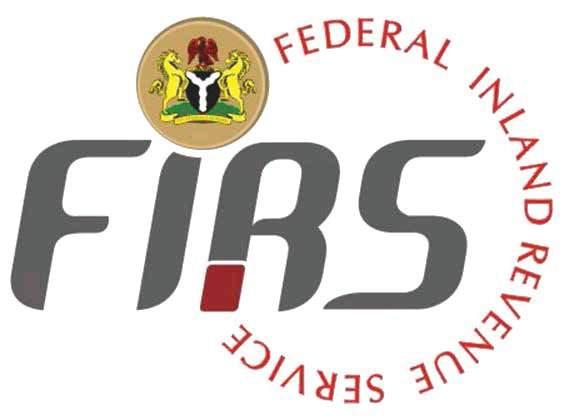
The Service remains committed to working collaboratively with all stakeholders to ensure a smooth, transparent, and inclusive rollout of the e-invoicing regime.
For inquiries and technical support, please contact the e-Invoicing Helpdesk via the portal.
Signed: Zacch Adedeji PhD Executive Chairman Federal Inland Revenue Service

In compliance with Infrastructure Concession Regulatory Commission (ICRC) Act 2005 & National Policy on Public-Private Partnership (PPP)
Sequel to the advert published on 14th April, 2025 on This Day, Daily Sun, and Daily Trust news papers requesting the submission of all relevant documents from Monday 14th April, 2025 to Wednesday 30th April, 2025, the underlisted Proponents are hereby notified of the status of their Public-Private Partnership (PPP) procurement processes and are required to immediately submit all pending documents listed in the table below to the PPP Unit. This is in preparation for securing the necessary approvals from the Federal Executive Council (FEC) for the respective projects.
Please note that the Ministry is desirous to implement all the pending Public, Private Partnership (PPP) projects without further delay Therefore, all Proponents are expected to liaise with the PPP Unit for prompt finalization of all pending processes within two(2) weeks from the date of this publication.
S/N CONCESSIONAIRE LOCATION KM OF ROUTE DBOMT/O&M
i.
(DBOMT)
ii. Enyimba Economic City Dev. Company Consortium Onitsha – OwerriAba 124x 2 Design-BuildOperate-MaintainTransfer (DBOMT)
iii. Enyimba Economic City Dev. Company Consortium Enugu – Port Harcourt 218 x2 Design-BuildOperate-MaintainTransfer (DBOMT)
iv. Dafac Consortium Kano-Maiduguri (Kano-Shuari)
101 x2 Operate & Maintain (O&M)
v Dafac Consortium Kano-Maiduguri (Portiskum Damaturu) 96 x2 Design-BuildOperate-MaintainTransfer (DBOMT)
v Africa Finance Corporation Consortium Lagos – BadagrySeme 79 x2 Design-BuildOperate-MaintainTransfer (DBOMT)
vii. Africa Finance Corporation Consortium Shagamu – Benin 258 x2 Design-BuildOperate-MaintainTransfer (DBOMT)
Finalization of Addendum; Financial Close
Proponent to submit acceptance of the Addendum
Finalization of Addendum; Financial Close
Proponent to submit acceptance of the Addendum
Finalization of Addendum; Financial Close
Proponent to submit acceptance of the Addendum
Finalization of Addendum; Financial Close
Proponent to submit acceptance of the Addendum
Finalization of FBC; FEC Approval; Execution of Concession Agreement; Financial Close
Proponent to submit FBC documents
Renegotiation with PDT Members; Finalization of Addendum; Execution of Addendum; Financial Close
Proponent to submit acceptance of the Addendum and BEME for Renegotiation to commence
Renegotiation with PDT Members; Finalization of Addendum; Execution of Addendum; Financial Close
Proponent to submit acceptance of the Addendum and BEME for Renegotiation to commence
3 PREFERRED BIDDERS UNDER HIGHWAY DEVELOPMENT & MANAGEMENT INITIATIVE (HDMI) 2, VALUE-ADDED CONCESSION (VAC): S/N CONCESSIONAIRE LOCATION KM OF ROUTE DBOMT/O&M STATUS
i. Mota-Engil Africa Eleme- Junct onEket- Oron 149.7 x2 Design-Bui dOperate-MaintainTransfer (DBOMT)
ii.
and Negotiation
Proponent to iaise with PPP Unit to schedu
Concession Group Lagos – Ibadan Expressway
iii. Balosh Integrated Services Ltd Murtala Mohammed Internationa Airport Link Road,
6. The Federal Ministry of Works remains fully committed to the Public-Private Partnership (PPP) model as a strategic tool for delivering sustainable infrastructure across the country The Ministry recognizes the vital role of private sector participation in bridging infrastructure gaps and is dedicated to creating an enabling environment that ensures transparency, efficiency, and mutual value in all PPP engagements.


RFB No: NG-KWARA RAAMP-490658-CS-CQS
Credit No: 6519-NG
RFB Description: CONSULTANCY SERVICES FOR GENDER BASED VIOLENCE SERVICE
PROVIDER IN KWARA STATE FOR RURAL ACCESS & AGRICULTURAL MARKETING PROJECT (RAAMP)
Country: Nigeria
Issued Date: 9th July, 2025
The Federal Government of Nigeria through the Federal Ministry of Agriculture and Rural Development has received financing from the World Bank and the L’Agence Francaise Development (French Development Agency of AFD) and on-lent the financing to thirteen participating States (namely Abia, Akwa-Ibom, Bauchi, Kan, Katsina, Kebbi, Kogi, Kwara, Ondo, Ogun, Oyo, Plateau and Sokoto) toward the cost of the Rural Access and Agricultural Marketing Project (RAAMP) and intends to apply part of the proceeds toward payments under the contract for CONSULTANCY SERVICES FOR GENDER BASED VIOLENCE SERVICE PROVIDER IN KWARA STATE FOR RURAL ACCESS & AGRICULTURAL MARKETING PROJECT (RAAMP).
This contract will be financed by the International Development Association (IDA). Procurement process will be governed by the World Bank’s Procurement Regulations.
Objective: The objective of the assignment is to support the SPIUs in responding to SEA/SH incidents that may occur in the project , ensure that effective mechanisms (case management, psychosocial support, legal, and referrals to meet the immediate needs of GBV survivors) are in place to render timely and appropriate services using Survivor – Centered approach.
The Consulting Services (“the Services”) includes;
1. The scope of work of the consultancy includes, but not necessarily limited to, the following:
a. Prevention Services:
o Facilitate, in coordination with the PIUs, Supervision Engineers and Contractors, sensitization & awareness campaigns in project beneficiary communities on the rights and options of beneficiaries on reporting incidents of SEA/SH and the available services to be accessed;
o Establish GBV/SEA prevention mechanisms and structures in the project communities and labor camps and ensure that the structures are well known throughout the project and that points of contacts are made widely available. This will include Peer education program: The Service Provider shall use the Peer Education (PE) approach used in the National HIV/AIDS prevention strategy to design and deliver key knowledge and practices to construction workers. The knowledge to be delivered through the PE program will cover (i) understanding GBV risk factors (ii) types of GBV and SEA (iii) conduct regarded as GBV and SEA (iv) provisions of the VAPP Act related to GBV (v) essential life skills relevant to GBV prevention (vi) code of conduct requirements. The service provider will conduct Peer Educator Training sessions and also provide continuous support and mentorship to all trained peer educators during the life of the project. The identification of peer educators among contractor staff will be sensitive to various occupational categories and the hierarchy within the contractor firm. Developing a key messaging strategy: The service provider will develop key GBV/ SEA prevention messages. Information, Education and Communication (IEC) materials will be designed, produced and circulated on all project work sites, offices, accommodation facilities and beneficiary communities. IEC materials will be developed and produced in a location-sensitive manner.
Activate GBV-GRM channels and operations: The Service Provider will serve as the GBV-GRM Intermediary as specified in the project GRM document. In this capacity, the provider will work with the SPIU to consult with Women and Girls for the purpose of determining the most appropriate complaint channels for reporting GBV cases. The channels will be popularized within all project communities by the Service Provider. The provider shall make arrangements for personnel and procedures to receive such complaints and respond in line with GBV-GRM arrangements established in the GRM document.
o Train all contractor staff on GBV/SEA and key responsibilities and expectations of contractor staff.
o Provide awareness-raising sessions on SEA/SH for all staff, consultants, contractors and other stakeholders on a quarterly basis, with particular emphasis on newly engaged staff. To ensure sustainability, the service provider will work closely with the SEA/SH focal unit of SPIUs to accomplish this;
o Work with human resources personnel across the entire project management hierarchy (SPIUs-Engineer-Contractors) to include content on GBV/SEA prevention in employment contracts, Code of Conduct documents and staff inductions for all contractors, consultants, temporary staff and casual labor within the project;
o Support all project SPIU in operationalizing GBV/SEA Prevention and Response Plans; and
o Identify significant risks and propose risk mitigation measures to address such risks.
b. Response Services: Provide an effective GBV case management support to a GBV survivor, which implies acting as a GBV case manager and providing services to the survivor. As a GBV case manager, the service provider is expected to do the following:
o Establish arrangements for receiving all GBV-related complaints arising from the conduct of all entities related to the projects being implemented under RAAMP. As required under the Prevention Services specified in this Terms of Reference, the organization will be effectively positioned to receive such complaints either directly from survivors or through referral from the regular project GRM. The processes for handling GBV-related complaints shall comply with the principles established in the project GRM document.
o Provide the survivor with information on available services so she/he can make informed choices, including choices about using GBV/SEA/SH services and the possible consequences of accessing those services (e.g. whether or not the case will be automatically reported to the police, expectations of the interview and/or examination process, etc.).
o Prioritize the survivor’s immediate needs, including her/his safety and security and access to health care and counselling. Work with the survivor to develop a plan that identifies what the survivor needs and how her/his needs will be met.
o When required, and with the survivor’s informed consent, act as an advocate on behalf of a survivor (e.g. to follow up on her/his access to other services or to speak with other community or family members – avoiding the survivors’ re-victimization) .
o Ensure informed consent and confidentiality, respect the survivor’s wishes and provide services and support without discrimination.
o Ensure that all confidential information is channeled correctly and handled with the utmost discretion. Provide information on GBV cases in an aggregate form. No identifiable information on the survivor should be provided in the GRM.
o Provide referrals to suitable and preferred service(s) for each survivor within the survivorcentered continuum of care. The output of the Mapping of Services carried out by RAAMP will guide all referrals to be undertaken the service provider.
o Ensure that all cases are properly tracked and followed up to ensure that the survivor receives optimum survivor-centered care.
o Coordinate response among other service providers to ensure survivors have access to quality and timely response services.
o Provide information to the SEA/SH committee to be established by the SPIU to determine if reported cases are related to the project and would require further disciplinary action by the contractor and SPIU
o When needed, provide capacity building to Stakeholders so as to strengthen their capacity in responding to GBV cases.
Minimum Service Package and Standards
2. The consultancy firm should be able to provide at least Psychosocial support or health care services to survivors of SEA/SH before linking them to other services with the informed consent of the survivors. Services to be provided by the GBV service provider will comply with the Essential Services Package for Women and Girls Subject to Violence Core Elements and Quality Guidelines published by United Nations Joint Global Programme on Essential Services for Women and Girls Subject to Violence.
Duration of Service
3. The consultancy services will be required for a period of One year and renewable upon evaluation of consultant’s performance. The consultancy is expected to commence in June.
General Qualification
a) Have a unit, or via joint venture (JV) or MOU, an office in each of the project participating States that will coordinate the provision of survivor-centred services for GBV survivors.
b) Extensive knowledge of Gender Based Violence and Sexual exploitation and Abuse Issues. Prior experience working on these issues, providing health/psycho-social, legal, shelter, advocacy support to survivors.
c) Strong understanding of country and project context, including both a solid understanding of the policy and legislative framework, gender related social norms and local dynamics, GBV/SEA prevalence as well as a well-established capacity to operate efficiently in project environment. Such qualification could be evidenced through the implementation, management or supervision of development programs in this country or similarly situated contexts.
d) Experience in the management of social risk issues and active engagement with beneficiaries, civil society or local communities is required. Relevant experience in communication and relationships with the community and experience with the design, implementation and/or monitoring of GBV-grievance redress or citizen feedback mechanisms in development projects.
e) Prior experience working with civil society and communities in project area would be particularly relevant to the proposed assignment considering the high social risks.
f) In order to strengthen their qualifications, Staff speaking local languages and familiar with local cultural norms and protocols will be required for the team working directly with the persons affected by the project.
g) Prior experience as a GBV Service provider of World Bank projects is not required but would be an advantage. If no prior experience as a GBV Service provider for the World Bank, the selected candidate should have at least demonstrated experience supervising development programs and activities financed by other international or multilateral organization in a similar context.
h) The selected service provider should have in physical address or place within the community for use as the service provision hub.
i) The selected service provider must be capable to deploy the right mix of personnel in all project communities indicated by the SPIU
The attention of interested Consultants is drawn to section III, paragraphs; 3.14, 3.16 and 3.17 of the World Bank’s Procurement Regulation for IPF Borrowers” November 2020 (Fourth Edition Procurement Regulations”), setting forth the World Bank’s policy on conflict of interest.
1. Interested eligible Consulting Firms may obtain further information from the State Project Coordinator Kwara State Rural Access and Agricultural Marketing Project (RAAMP), State Project Implementation Unit (SPIU) during office hours 0900 to 1600 at the address given below.
2. REOIs must be delivered to the address below on or before 12:00noon on 8th August, 2025
Kwara State Rural Access and Agricultural Marketing Project (RAAMP), State Project Implementation Unit (SPIU), Sulu Gambari Road, GRA, Ilorin, Nigeria, Telephone: +2348069378681, +2348169265623
Email address: Kwara-RAAMP@hotmail.com
Signed:
Acting State Project Coordinator
Acting Group Politics Editor DEJI ELUMOYE
Email: deji.elumoye@thisdaylive.com
08033025611 sms only
Either for the ruling party, the all Progressives Congress or the opposition coalition, african Democratic Congress, the 2027 general election is neither a done deal nor a walkover. olawale olaleye writes.
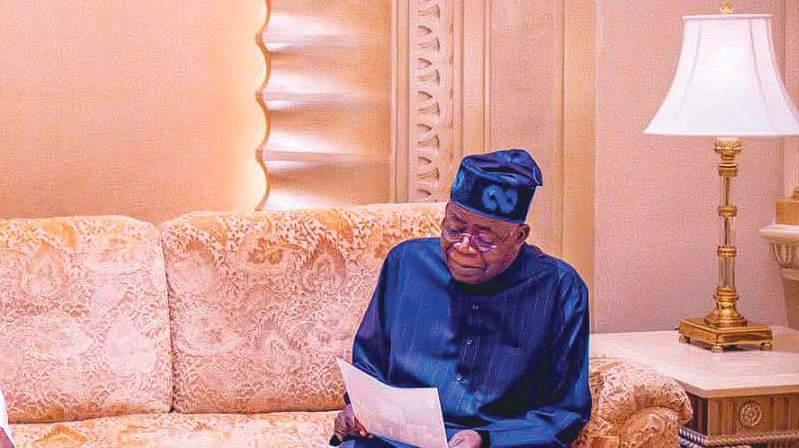
Zainab, daughter of Alhaji Buba Galadima, a prominent northern voice, was recently on Mic On, a podcast anchored by Seun Okinbaloye of Channels TV. As part of her submission, she warned: “A storm is coming.” The reference was to the likely response from the north in 2027 and what she had foreseen as a “daughter of the soil”.
Candid, smart, intelligent, progressive, visionary, and unequivocal, Zainab knew exactly what she had hinted at. But the title above is just an adoption of her concern of the current state of play in the north nay the 2027 general election. This intervention has nothing to do with her submission or the interview with Okinbaloye.
It is about the African Democratic Congress (ADC), an existing political party newly adopted by the opposition coalition and the reactions that had since greeted it. If you must espouse the truth without mealy-mouthing, no one but the APC had given the ADC the huge and unsolicited publicity it currently enjoys.
Either out of sheer panic to the development, which they didn’t expect would take off the way it did or a function of some fussy excitement to impress President Bola Tinubu, the responses so far from the corridors of power belie, not just logic but creative narrative and strategic communication. Who alerts his enemy to his weakness in a battle? It oozes naivety, too.
Except renowned political historians could dispute this, it is trite to infer that there’s been no coalition or merger in the nation’s political history that has taken off this way. In a matter of weeks, the coalition brought together top politicians from across the regions, who started meeting in their large numbers from day one and kept increasing each day till they “hired” an existing party, unveiled it and appointed their interim leadership. That’s not some tea party adventure.
First, the ruling APC didn’t think the idea would birth successfully. It had expected a stillbirth. But the moment safe delivery was announced, the response changed. “Oh, it can’t be a healthy baby.” “The child must be suffering some Down syndrome that is still being covered up.” Some even predicted that the baby would die soon.
But no one remembered it was the same fate that the ruling APC suffered at birth. Some of the career political jobbers, who have now switched camps and helped to sell this narrative, were on the other side then. No one gave the APC a chance. Little wonder, some of the politicians, who were originally part of the movement, ran back as a result of the poor rating the APC was then handed.
President Tinubu, who suddenly single-handedly appropriated Muhammadu Buhari’s electoral success, also had reservations about the man. He hardly believed in him. Or, who, again, was alleged to have bought a nomination form for a former
Speaker of the House of Representatives, Hon Aminu Bello Tambuwal, to contest against Buhari before the rest of the proBuhari stakeholders shot down the idea as counterproductive and late in the day?
Maybe someday one or two of those who played active roles in the formation of the APC and the emergence of Buhari would talk or write about the alleged lobbying to have the ballot papers for the APC presidential convention printed at some ‘Lagos press’ before they changed plans and had them printed in Dubai.
The ballot papers arrived on the day of the election to the shock of many people with solid security that could not be tampered with. The APC gamble only showed prospect after its Lagos convention, which eventually produced Buhari, was hugely successful.
It is surprising, therefore, that the only thing that appears like the strategy of the ruling party in the current dispensation is the hope that the ADC would implode and its members disagree once a presidential candidate emerges.
This, they reckon, would produce aggrieved parties that would break away like a certain former governor, who became a tool in the hands of the opposition to destroy
Either out of sheer panic to the development, which they didn’t expect would take off the way it did or a function of some fussy excitement to impress President Bola Tinubu, the responses so far from the corridors of power belie, not just logic but creative narrative and strategic communication. Who alerts his enemy to his weakness in a battle? It oozes naivety, too.
his own party because delegates made a different choice. Those delegates must be clairvoyant, seeing what the fellow has become today.
While the confidence of the ruling party is good for the optics, it is largely hinged on false premises. The party appears to thrive more on propaganda than evidence-based claims. Of the truth, there seems to be more trouble in the APC paradise than many can imagine in the camp of the ADC. Apart from the panic responses that have so far dotted the space, the alleged attempt to frustrate the unveiling of the party spoke louder than what anyone could dismiss.
Thus, rather than dissipate needless energy on the ADC, the ruling party, after producing a ‘minority president’ with paltry 36.61 per cent electoral success, has to go and fix the current disapproval ratings alleged to be prevalent in many parts of the country.
For instance, in the North West, where the majority of the people still feel short-changed after churning out huge votes for the APC, it would take more than incentivising them to regain their trust. This is politics – the only thing they know and do. It is deeper than dangling carrots. The resentment swirls every day, and no serious party and government should gloss over it.
The APC, by compulsion, must keep an eye on the North East where there is a brewing resentment against it over the alleged plan to drop their son, Vice-President Kashim Shettima, from the joint presidential ticket in 2027. That this anger is already bringing many of Atiku Abubakar’s political rivals back to him should worry the ruling party. As a matter of urgency, the APC has to continuously engage with the North Central, which is unhappy that the party and government have not been able to resolve its security crises since the time of Buhari,
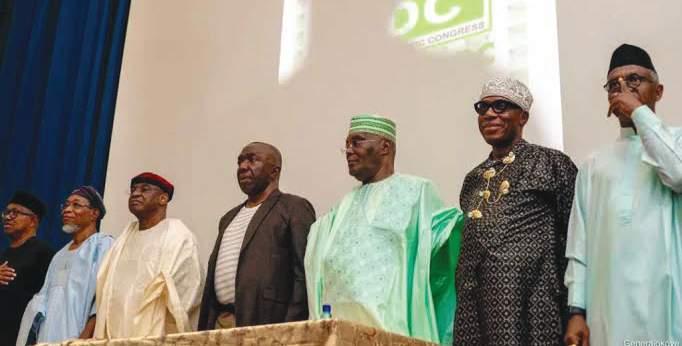
spanning over ten years. In their case, talk is already considered cheap. They want the result.
It is not certain if the APC could ever do anything to change the fate awaiting it in the Southeast. Maybe that’s not where to even waste time and resources. These Southeast governors? None of them can rein in the voters from that zone. Rely on them at your risk.
The South-south is already giving a mercurial 50-50 vibe. But the deliberately poor and malicious handling of the Rivers State crisis is definitely going to take its toll on the rating of the party and the president. Tinubu showed his hands quite early.
If Rivers deserved an emergency situation because of “two fighting” with near-zero death recorded and in which the president openly took a side, then the president should have carved out and pronounced Benue, Plateau and Borno as states no longer existing in the federation, given the disturbing security situation there.
Whoever witnessed the voting pattern in the southwest, especially in Lagos, must have seen an ultra-civilised voting population in action. Those voters were irrepressible, determined, and knew what they wanted. They were very specific and unequivocal.
It was either Peter Obi for president or no one else. Nobody, not even if Tinubu had personally visited each polling unit, could have changed anything. They publicly said it and also promised right there at the polling centres, where they manned their votes, that they would return Governor Babajide Sanwo-Olu during the governorship election the following week. They did exactly just that.
Some mischief makers, many of them seeking favour from the president, had insinuated that the governor could not have escaped the same fate if the elections had held the same day. But they forgot that the National Assembly elections held the same day as the president’s and the APC cleared nearly all the seats in landslide victory. That, of course, is something to critically dimension ahead of the next elections.
The resentment was against the president and not the party. But has the situation changed? Maybe not. At least, expectations are that the APC must have started commissioning serious polls, preparatory to the 2027 elections. This would serve as some reliable guide, going into the elections,
which are not going to come easy for any of the parties. The APC should let the ADC contend with its beginner challenges. Interestingly, by its alphabetical order, the coalition party might come first on the ballot (you know what that could mean at elections). So, the APC should get to work if it truly intends to compete fairly in 2027 and not rely on some “wuruwuru to the answer” strategy.
If the ADC holds a successful and rancour-free national convention, produces a good presidential candidate without any aggrieved contender to the ticket threatening the unity of the house, and given the current state of the nation, then the APC should know that a storm is fast approaching and might wreak unprecedented havoc.
In 2027, power shift would not be an issue. Religion would also not be a concern. If a Muslim-Muslim ticket is doable, a north or south leadership – back to back – is also doable. But the state of the nation, dwelling on issues of the economy, security, social welfare, food security, tax, education, power, infrastructure, stability et al – would decide the fate of the parties in 2027.
After all, the constitution didn’t say two terms of eight years are mandatory. So, if power had shifted to the south in 2023 on account of rotational presidency, the choice of where it goes in 2027 is with the people, who would vote on whether or not their lives had changed between now and then.
Unfortunately, for the ADC, the picture that many objective observers could see of it is one of an aggrieved group, desperate to grab power, not
out of common ideology towards development but an opportunity to seek vengeance.
The posturing of a former Kaduna State governor, Malam Nasir El-Rufai, has depicted nothing beyond anger and vengeance. This is supposed to be a frontline member of the group, who had long gone on the offensive. His stand is also not different from that of a former governor of Osun State, Ogbeni Rauf Aregbesola. The bitterness is too discernible to encourage a positive reading of an auspicious opposition coalition.
Again, if truth must be told, the opposition should blame itself for whatever has become of their place in the body politic today. The alleged gravitation toward a one-party state, for example, was one needless distraction that the opposition dwelt too much on. If the opposition could come together, mobilise like-minds to form a strong tower against the ruling party. What is wrong with the APC, too, consolidating its current stand by bringing more people into its fold? It’s a game of numbers, after all.
But the point not to miss is, across the parties, these opposition figures, particularly as political entities, have failed to live up to expectations. They seem to lack the capacity to play constructive opposition, let alone manage their parties and its inherent tendencies.
How comprehensible it is that the opposition, in their respective units, has not been able to maintain one house since the APC assumed office, even though they would rather blame external interference as if that would stop by changing shell. Except for a few individuals espousing sometimes differing opinions on national issues, the opposition has never for once come up with sound and common party positions on issues.
Save for the likes of Alhaji Atiku Abubakar, Mr. Peter Obi, Malam Nasir El-Rufai, and a few other opposition leaders addressing different issues at different times, how were
Unfortunately, for the ADC, the picture that many objective observers could see of it is one of an aggrieved group, desperate to grab power, not out of common ideology towards development but an opportunity to seek vengeance.
the parties able to make an impact in the choice of the National Assembly leadership, for example?
Did the opposition parties ever meet to take a position and give directives to their lawmaker members, guiding them in what direction to vote? No! A majority of their lawmakers went rogue immediately after their inauguration, seeing the humongous perks that would come to their office if they learned “good table manner” and stop talking while eating.
When the tax reform bills were introduced, could anyone recall the positions of the parties aside from those espoused by their leaders? Are these really opposition parties? When the president slammed the emergency rule on Rivers State, individual leaders would rather ask to be heard than push a solid party front. Their members sold out even before the matter landed in the National Assembly.
How serious is this sort of opposition in a society where the ruling party does not take prisoners? While the ADC-led coalition seems promising, it is concerning that a majority of the leaders, especially in the PDP and the LP, could not manage the crises in their parties, but would rather abandon the ship and bail out.
Even more confounding is that many of the new ADC leaders have refused to resign from their former parties but are mulling the idea of standing astride in both parties. What manner of politics is that, and to what end? So, half and half, both the ruling party and the opposition have a lot to deal with if they must make any meaningful impact in the 2027 elections.
While this intervention is not to side with any of the parties or their leaders, but to wake the whole of the system to the reality that stares everyone in the face, it must be noted that the next election is not a done deal or a walkover as some might have thought.
Several other factors are germane. Even with rigging as an option, it must be buried into the science of clinical electoral kneading. Otherwise, no one is able to predict the consequence of such a choice in the face of hunger and anger.
However, if 24 hours is indeed a long time in politics, the whole essence of this is that all sides (especially the ruling party), still have some ample time to change their current story and present a better score-sheet during the 2027 elections.
With the expected consequences flowing from the people’s democratic party’s reinstatement of senator samuel anyanwu as its national secretary against the position of south east pdp and the exodus of the party’s heavyweights into the all democratic alliance adopted by the coalition movement, Deji Elumoye writes that the days of the pdp appear numbered.
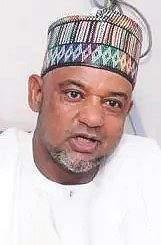
In a popular interview with a national newspaper way back in 2008, at the People’s Democratic Power’s height of power, the party’s National Chairman at the time, late Chief Vincent Ogbulafor, boasted that the PDP would rule Nigeria for 60 years. At that time, the power was already showing some signs of dysfunction. But it did not matter to him.
He said, “Some time ago, I used to read in the newspapers that the umbrella of the PDP is torn. Each time I read that, I would laugh and then say to myself that the umbrella is still strong and very intact and ready to accommodate more people.
“The PDP is a party for all and it is set to rule Nigeria for the next 60 years. I don’t care if Nigeria becomes a one-party state. We can do it and the PDP acan contain all.”
Such impudence, one may say. But his confidence was understanding. After all, in the general election of the preceding year, 2007, the PDP won the presidential seat and clinched 262 of the 360 seats in the House of Representatives, while the main opposition party, All Nigeria People’s Congress could only secure 62 seats, mostly in the North. The PDP also controlled the overwhelming majority in the Senate, winning 85 out of the109 seats. The ANPP, on the other hand, could only muster 16 seats, while the remaining parties shared the rest.
As the African adage goes, when death beckons on the dog, such a dog loses its sense of smell and refuses to heed the whistle of the hunter. Thus, rather than retrace its steps and mend the cracks created by impunity and injustice, the party groomed into chasms. The height of the party’s excesses was in 2015 when former President Goodluck Jonathan not only ran for reelection contrary to the pact he had with the North, but the party only printed only one presidential nomination form for its presidential primary, thereby shutting its doors against other contestants, especially from the North.
However, the difference of the PDP of today under Ambassador Umar Damagun of today and the PDP of those days was that the leadership headed by the National Chairman, Prince Uche Secondus, set the 2015 Post-election Review Committee
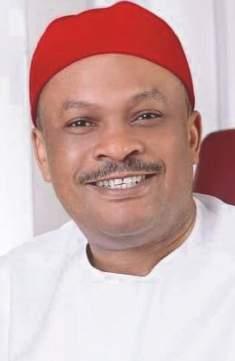
headed by former President of the Senate, Senator Ken Nnamani. The party deployed its members to the six geo-political zones to ascertain why it lost the presidential election and National Assembly seats. The panels for the three zones in the north came back with the finding that the North worked against Jonathan and the PDP for upending the zoning formula and ditching their agreement with North, thereby usurping their remaining turn to run for the office of the president on the platform of the PDP after the death of Alhaji Umar Yar’Adua.
Excerpt from that report submitted on 30th September 2025 reads, “It is also recommended to the party to strictly apply the zoning principle at all levels. In particular, since the last President of PDP extraction came from the southern part of Nigeria, it is recommended that PDP’s presidential candidate in the 2019 general elections should come from the northern part of the country.”
Meanwhile, most analysts agree with the South East PDP that the party’s 2023 presidential ticket should have gone to that zone. Not only does the region, which is the home of Chief Alex Ekwueme, a major co-founder of the PDP and Chairman of the Steering Committee during its formation, it is a zone that has given its all to the PDP. Unfortunately, nobody from the region has flown the PDP presidential banner.
Indeed, many believe that PDP’s troubles of today could be directly
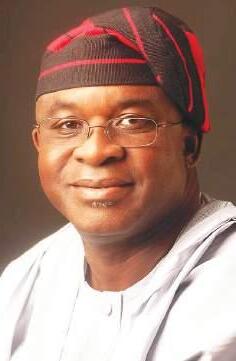
traced to the party’s refusal to zone its presidential ticket to the party. In fact, in his April 2022 piece entitled “PDP and the Consequences of Sailing Against the Wind in 2023,” a prolific analyst and columnist, Majeed Dahiru, warned the PDP vehemently that denying the South, particularly the South East, PDP’s presidential ticket would sound a death knell for the opposition party.
“If the PDP goes ahead to sail against the wind in 2023 by fielding a Northern candidate, the ship of the party will capsize, sink into oblivion, as the party will lose in the North and in the South to the APC and go into extinction in post Buhari Nigeria,” he had said prophetically.
It was this denial of PDP ticket to the region by throwing it open that led to the exit of Mr. Peter Obi and the then governor of Ebonyi State, Dave Umahi to the Labour Party and All Progressives Congress, respectively. Expectedly, South Easterners, who were very much angered by what they saw as their mistreatment of the region, raved with holy anger by casting protest votes against the region. When the dust of 2023 settled, PDP’s presidential candidate, Alhaji Atiku Abubakar, performed poorly in the region. Only Senator Osita Ngwu of Enugu West senatorial zone made it to the Senate until one other person eventually joined him via the court.
But even more instructively, since after the 2023 general election, PDP has not recovered from that injustice done to the South East - as predicted by Majeed Dahiru. With former governor of Rivers State, Nyesom Wike fighting on all fronts over his hurt regarding the outcome of the PDP presidential primaries and, some say, his alleged denial of the vice presidential ticket, the war over the position
While a day in politics is still almost like a year, difficult to predict with certainty, political observers are watching with worries to see how the PDP would chart its way out of the mashy ground it walked itself into.
of the National Secretary, which is indeed the struggle for the soul of the PDP, appear to have finally imploded the PDP.
Following the nomination of Senator Anyanwu as the PDP governorship candidate in Imo State in April 2023, PDP National Working Committee (NWC) had subsequently directed the South East zone to nominate his replacement as the National Secretary of the party. This process produced Hon. Sunday Udeh-Okoye. However, Anyanwu, regarded as FCT Minister, Nyesom Wike’s ‘Man Friday,’ has refused to yield the position, as he sought to remain in office after losing the gubernatorial election. This did not sit well with the South East Caucus and 11 members of the NWC, who have continued to insist on Udeh-Okoye. Matters came to a head when South East PDP rose from their Zonal Executive Committee meeting attended by most the who-is-who in the region, issuing a communique that the zone would be left with no choice but to reconsider its future with the party if their choice of National Secretary was not recognised.
The ambiguous judgement of the Supreme on the matter, which ended up at their bench, did not help matters. After much back and forth by the PDP Governors’ Forum, Board of Trustees, Damagun, and National Executive Committee, the NEC at its last meeting announced that Anyanwu has now been fully reinstated as the National Secretary.
But contrary to the notion that Anyanwu’s reinstatement had calmed the storm and put the PDP on the path of recovery, many believe it marked the end for the PDP. For instance, the National Alliance for Democratic Governance (NADG) in a statement last Thursday, described his reinstatement as a step towards the party’s “final burial.”
The statement entitled “Damagun to be Remembered for Presiding over PDP Final Funeral,” and signed by the group’s President and National Coordinator, Comrade James Ezema, likened PDP’s treatment of the South East to a husband mistreating a loyal wife in favour of “wayward concubines.”
When Governor Caleb Manasseh Mutfwang assumed office as Governor of Plateau State in May 2023, he inherited a region beset by insecurity, and economic challenges. So, it was essential that he focused on addressing these issues, which he did by prioritising agricultural revitalisation, modernising livestock farming, regulating the mining sector, and reviving tourism. But first, his administration sought to rebuild public trust in government through inclusive governance and infrastructural development, while advocating for localised security solutions to combat organised criminality disguised as farmer-herder conflicts. Chiemelie Ezeobi writes that against all odds, the governor is quietly laying the groundwork for a resilient and economically vibrant Plateau—one that is beginning to restore hope, bit by bit
When Caleb Manasseh Mutfwang took office as Governor of Plateau State on 29 May 2023, he wasn’t under any illusions. The challenges were deep and wide: poverty, insecurity, and broken public systems. But from day one, he made it clear—his administration would focus on lifting people out of hardship and restoring hope.
In a recent sit-down with journalists, Governor Mutfwang spoke frankly about the road so far—what’s been done, what’s in motion, and why Plateau must get it right, not just for now, but for generations to come.
In fact, in his speech to commemorate his second year anniversary he had said: “From the outset, we were clear-eyed about the enormous challenges before us, insecurity, economic hardship, institutional decay, and a loss of public confidence. But we were inspired by your resilience, steadfast support and driven by the belief that Plateau will rise and shine again.
“The last two years have tested us. We faced legal distractions that sought to derail the mandate you freely gave us. We endured the pain of continued attacks on our rural communities, the burden of a broken economy, and the scars of many years of neglect. But through it all, we did not falter. We kept faith. We stayed the course. And we have begun to see the signs of a new Plateau, the Plateau of our dream.”
He further stated that the fight to rebuild Plateau State is not just about infrastructure or statistics, but about restoring dignity to its people. Two years on, Governor Mutfwang believes the evidence of change is becoming visible. “We have begun to see the signs of a new Plateau — the Plateau of our dream,” he said.
Securing Lives, Reclaiming Territory
While describing insecurity not merely as a law enforcement problem, but as “an economic war masked as ethno-religious crisis”, which he said had kept farmers off their land and communities under siege, he said “We endured the pain of continued attacks on our rural communities, the burden of a broken economy, and the scars of many years of neglect. But through it all, we did not falter. We kept faith. We stayed the course.”
In this regard, he outlined several security initiatives, including the revitalisation of Operation Rainbow for intelligence gathering and the launch of an Emergency Communications Centre with a toll-free line. “We are supporting our security agencies and local communities to ensure that peace returns to all our towns and villages,” he said. In places like Mangu and Wase, where security forces were fired at while escorting tractors to abandoned farmlands, he described the incidents as evidence of “deliberate economic sabotage”. He added that decentralised intelligence networks and state policing are key to lasting peace.
“We are reclaiming territory and planning to restart grazing activities under controlled reserves,” the Governor revealed, noting that some of these efforts were being carried out in collaboration with the Federal Government and development partners.
While debunking the myth around security votes, the governor noted that because federal security agencies—like the army, police, DSS, and civil defence—are stationed in Plateau, the state has to fund many of their operations.
Until state policing becomes reality, he believes this arrangement is necessary. He also questioned the current centralised security model. “You can’t run security from Abuja and expect it to work in real time,” he said, making a strong case for security federalism.
Laying an Economic Foundation
At the heart of the administration’s development vision are three economic pillars: agriculture, mining, and tourism.
Mutfwang is particularly bullish on agriculture.
“What we used to call Irish potatoes should now rightly be called Plateau Potatoes,” he said, highlighting Plateau’s dominance in potato production and plans to partner with global
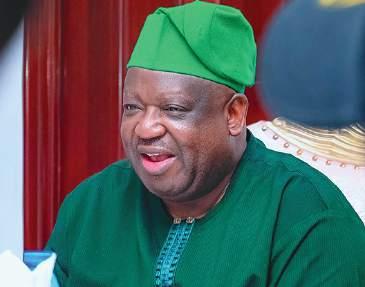
seed companies like Agrico. He disclosed that Plateau would host the African Potato Conference in 2028 — a symbolic nod to the state’s growing agricultural reputation.
It’s not just crops that can transform Plateau’s economy. The governor is betting big on livestock, especially dairy. With its cool climate, Plateau is ideal for raising healthy animals, and eggs from the state reportedly last longer than anywhere else in Nigeria.
To this end, he wants to also revolutionise dairy farming, proposing a shift from open grazing to structured models using high-yield Friesian cattle. “Open grazing is economically obsolete,” he declared. “With a structured model, even a family with two improved cows can earn sustainably. Nigeria still has a huge milk deficit, and Plateau is well-positioned to close that gap.”
He’s building on past efforts to introduce high-yield Frisian cattle that can produce up to 20 litres of milk per day—ten times more than the average cow. These improved breeds are being distributed to households to help them build wealth through dairy.
Nigeria still imports most of its milk, and Mutfwang sees this as a missed opportunity.
“We can meet our own needs and even export, if we do it right,” he said.
To reduce farmer-herder tension, the government is encouraging ranching and constructing a 500-capacity abattoir built to export standards. The meat from older cattle doesn’t meet these standards, which require younger animals aged between 1.5 to 2 years.
To further this ambition, the government created the Ministry of Livestock Development, Veterinary Services and Fisheries to support ranching initiatives and re-purpose the longabandoned Wase grazing reserve. “We hope to elevate Plateau State to become Nigeria’s livestock hub both for local consumption and export,” he said.
Turning Tourism from Slogan to Strategy
Everyone knows Plateau as the “Home of Peace and Tourism.” But for years, it was more motto than reality. That’s changing. The state is now working on a detailed tourism master plan with global partners, targeting areas like sports, culture, health, and adventure. Already, hotel bookings are up, especially in Jos, which sits on the way to the Northeast.
Through public-private partnerships, the government is revamping iconic spots like Hill Station Hotel and Plateau Hotels, while resuscitating agricultural assets like Bark Farms and the ASTC. The Jos Wildlife Park is undergoing transformation, and support has been extended to cultural festivals.
Roads, Transport, and Urban Renewal Roads have become a symbol of change in Plateau. Mutfwang highlighted that the Road Maintenance Agency had rehabilitated about 111 km of urban roads under the Urban Infrastructure Renewal Programme, while the Ministry of Works is reconstructing over 3,000 km of roads initiated but abandoned after the Jang administration. The Ministry of Housing and Urban Development is supervising 66.4 km of roads, with 380 km of rural access roads under construction through the Rural Access and Agricultural Marketing Project.
“Our transportation agenda is not confined to roads alone,” he said. “We signed an MoU with ValueJet Airlines for regular Jos–Abuja and Lagos–Jos flights and partnered with the Nigerian Railway Corporation to revive rail transport.”
In urban mobility, the Tin City Metro service now provides subsidised daily transport for nearly 9,000 passengers, with 15 new buses recently added to the fleet.
Reforming Civil Service and Reviving Institutions
In the civil service, the Governor spoke of progress in restoring lost dignity and capacity. “We cleared the four and a half months’ salary arrears we inherited, resumed regular payment of salaries, gratuity and pensions since 1984, restored promotions and training,” he said. “Plateau workers are fast regaining their pride and the desired motivation to serve.”
He also acknowledged a decade-long recruitment freeze that created a manpower gap. “There are ministries where the next generation of officers is missing entirely. We are rebuilding the civil service from the ground up,” he added.
In education, Mutfwang said confidence was returning. “The Plateau State Polytechnic fell from 13,000 students to 3,000. We’ve now increased enrollment to over 6,000.
Confidence is returning.” He added that tuition fees for Plateau indigenes in state-owned tertiary institutions were slashed by 50 per cent, scholarship funding increased by 300 per cent, and over 148 classroom blocks renovated across all 17 LGAs.
Health, Water and the Environment
The Governor described a “remarkable facelift” in the health sector. “We recruited more consultants, completed the abandoned laboratory complex, and installed equipment valued at about ₦2 billion,” he said. Health insurance enrolment rose from 93,605 in May 2023 to 208,550 by March 2025, while over 9,000 vulnerable citizens are now covered under the Mutfwang Health Initiative. Water supply has also been prioritised. “We awarded a ₦30 billion contract for the Langtang North Water Project and revamped isolated water schemes in Jos South, Bokkos, Mangu, Langtang, and Wase,” he said. Solar-powered boreholes are being installed across all 17 LGAs.
On sanitation, he declared a state of emergency on the environment and revived monthly clean-up exercises. “Today, our streets are cleaner and our cities safer. We have taken steps to reverse our poor ranking in the open defecation index,” he said.
Mining and Legal Reforms
Mining has been part of Plateau’s identity for over a century. But for too long, it was lawless—fuelled by illegal operations, lost lives, and lost revenues.
Thus when Mutfwang suspended mining activities, it was a bold move meant to reset the sector. Young people were abandoning school for quick money in the mines, and communities were suffering.
The state has now set up its own mineral development company to take part directly and ensure the people benefit, not just the middlemen. The Plateau Minerals Development Company was established to bring sanity to the mining sector and enforce environmental standards. “We recently suspended mining to enforce standards. Safety lapses have claimed lives and many resources remain undeclared,” he noted.
In the justice sector, the Governor said his administration had “laid down a sound legal framework” to enhance justice delivery, signing several critical laws to promote mediation and protect the vulnerable.
For the governor, one of his most important wins so far, is restoring people’s trust. To do this, he made deliberate efforts to run an inclusive government by making appointments from across communities to religious and tribes.
“Government must be seen as fair,” he said. And that applies to hiring, too, which was why he has stopped nepotistic practices, especially in tertiary institutions, and insisted on merit.
He reaffirmed his commitment to inclusion across political, religious, and ethnic lines. “Our appointments and projects reflect our core belief in inclusion,” he said. “Local Government Councils across the state are actively implementing various grassroots development projects.”
To displaced communities, he offered reassurance: “We have not forgotten you. We are working in collaboration with the Federal Government and development partners to resettle displaced persons and rebuild broken communities.”
While stressing that prudent financial management made all these interventions possible, Governor Caleb Mutfwang is however under no illusion that he can fix everything in four years, but what he’s trying to do is build a new foundation—for jobs, justice, and peace. He further acknowledged that they may not have reached the mountain top yet, but they are no longer in the valley. “The path ahead is still long, but together, we shall continue to walk it with hope in our hearts and faith in our future. Plateau is rising again — and by the grace of God, we shall all rise with it”.
Bennett Oghifo
The Nigerian Conservation Foundation, the Convention on International Trade in Endangered Species of Wild Fauna and Flora (CITIES), and the Association of Traditional Medicine Practitioners in Nigeria have agreed to work towards the prevention of the extinction of vultures in the country because of their useful role in the environment. According to BirdLife, “Vultures play a critical role in our ecosystems by preventing the spread of diseases. Without them, carcasses rot, leading to
an increase in pests and deadly pathogens that threaten human and animal health. By ignoring the plight of vultures, we risk passing on a dangerous legacy to future generations.”
The Director General of the Nigerian Conservation Foundation, Dr Joseph Onoja, also stated this fact during the brainstorming session at the Lekki Conservation Center recently. Dr. Onoja said. “This (the conference) is part of NCF’s vulture conservation strategy that we developed some years ago. And we did that in response to the rapid decline of our vulture species in Nigeria. And this is
because of the very important role that vultures play in our environment as the environmental sanitation agents. If we lose our vulture species, there are consequences, both for human health, for the economy and for the environment.”
Vultures, he said needed to be conserved for them to play their crucial role, “which is very important for humans. We are at the top of the ecosystem. So when the ecosystem collapses under us, we’ll be in big trouble. And that is why we continue to talk about the fact that we are part of the ecosystem.”
Onoja said, “Over the years,
we found out that the decline of the vulture population is largely due to human activities, from habitat destruction, persecution to use in belief-based activities. So that’s why we say, okay, let’s bring all the practitioners together. Let us discuss, can there be alternatives to these vultures, since we know that they are declining in population, can there be alternatives? And luckily, about two or three years ago, we worked with some practitioners who developed plant-based alternatives to them, and we are trying to see how the adoption of that plant-based alternatives can be
used nationally and probably regionally, as well.”
He said NCF led the West African Vulture action plan that they just launched, which was led by CITES, explaining that “this time around, we’re implementing this to reduce the belief-based use with the CITES Secretariat, and traffic as well, so that we’ll be able to see how we can reduce the demand. I mean, we can have a demand reduction in vulture parts, as they do in belief-based use or in traditional medicine practices.”
He said, “Vultures are critically endangered, all our vulture spe-
cies, apart from the Palmnut Vulture, all our vultures are critically endangered.” Yuan Liu from the CITES Secretariat in Geneva, Switzerland, who was at the meeting, said, “Vultures are appendix two species, which means the trade can be regulated; can be legally happening, but we now deal with the demand for illegally acquired vultures. So for the conservation, our protection of the species, you need to take different measures, for instance, law enforcement, livelihoods and demand reduction. And this particular workshop is about demand reduction.”
Fadekemi Ajakaiye
A new report states that there is a 15 per cent increase in the Lagos housing deficit from approximately 2.95 million units
in 2016 to 3.4 million in 2025.
The report, ‘State of Lagos Housing Market Report (Vol. 3)’, produced by the Roland Igbinoba Real Foundation for Housing and Urban Develop-
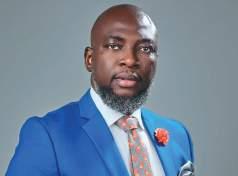
ment (RIRFHUD), paints a mixed picture of progress and persistent inequality in the city’s real estate sector.
The report is based on field surveys, property analytics, and satellite data, making it one of the most comprehensive independent studies of the Lagos real estate landscape to date. It builds on earlier editions from 2009 and 2016 and is expected to shape future investment and policy direction in the sector.
The third edition of the report, unveiled at an event in Victoria Island, Lagos, highlights widening disparities between high-end developments and the struggle for affordable housing in urban and peri-urban areas.
Over 70% of Lagos residents, the report says, remain renters, with many spending between 40% and 60% of their income on rent. “This rent burden is highest
in areas like Lekki, Ikoyi, and Victoria Island, where luxury apartment prices continue to rise despite broader economic challenges.”
The report notes that while luxury real estate and short-let apartments are booming—driven by diaspora investment and developers targeting high-networth clients—the low-income housing segment remains underfunded and underserved. Notably, there is a growing mismatch between private sector supply and actual urban demand.
Among key findings are that Ikorodu, Badagry, and Alimosho were identified as areas with the highest housing demand but minimal new supply; real estate prices rose by 12% year-on-year, despite rising construction costs and economic volatility and short-let rentals and serviced
apartments saw a 15–18% increase in yields in highbrow areas, but vacancy rates are rising in mainland zones due to affordability concerns. Also, infrastructure gaps—particularly in drainage, road access, and electricity—continue to dampen the viability of many residential zones.
The report also warns of deepening informal settlements and unregulated developments, urging stronger partnerships between government and the private sector to deliver inclusive housing. It calls for targeted incentives, including land reforms, tax breaks, and mortgage support for developers building affordable homes.
Within the period under review, report the Lagos housing market continued to evolve within a highly complex and dynamic environment, shaped by macroeconomic volatility, shifting housing demand, escalating construction costs, and a widening gap between luxury and affordable housing delivery. Stakeholders underscored a deepening mismatch between housing supply and actual demand.
Many developers observed that new developments are skewed toward high-end properties, predominantly 3-5 bedroom homes in elite areas, even though a large majority of Lagosians cannot afford such units. As one respondent put it, “The market is saturated with high-end apartments, but the middle-class can’t keep up.” This sentiment was echoed by others who highlighted that the proliferation of luxury units does not align with the income profiles of most potential homebuyers.
Fadekemi Ajakaiye
Even before formal commissioning of the newly reconstructed Port Harcourt Road, Aba, Abia State, joyous traders and residents have relocated to the project site.
Abia State Governor, Alex Otti, had flagged off the reconstruction of the perennially dilapidated 6.7 kilometres of Port Harcourt Road Aba.
The road, which was one of the most deplorable Federal Roads in the state was awarded to acclaimed engineering construction company, Julius Berger at the rate of N30 billion, with an official completion date of 18 months.
According to the specifications, Julius Berger was expected to reconstruct the road as well as build a flood control mechanism
within the area which is part of the flood-ravaged Uratta, Ohabiam and Ndiegoro floodprone area.
At the time of flagging off, Port Harcourt Road, Aba had been abandoned by both residents and commercial traders making the key link road between the state and nearby Rivers state loose artisanship activities and other well-known business activities for which the stretch of road was known.
Speaking during the flag-off, Otti said he was glad that his administration is taking yet another strategic step in fulfilling one of his major campaign promises which is to permanently break the jinx of Port Harcourt Road Aba and revive the longabandoned economic activities along the area.
The road which was com-
pleted last April ahead of an earlier scheduled commissioning date in May, is now a beehive of commercial activities with many residents and traders earlier displaced by construction works, now relocated to the area for business activities.
Last week, people in the area were ecstatic when asked to comment on the new look of Port Harcourt Road.
An Okada rider who gave his name as, Innocent, congratulated the state governor for the will to commission a company like Julius Berger to help to reconstruct Port Harcourt Road.
My name is Innocent a.k.a Fuji Kpokirikpo Nwaaba. Alex Otti the Governor of Abia State, is our number one citizen in this country. Over 28 years now, we have been patrolling around this area, none of the
past governors bothered to make this road look like this, and now within a few months, our governor has done this for
us. You see this Port Harcourt Road before na River Niger, and the other side River Benue. Now, our governor has done the road,
everywhere is now looking like Express Road now. Take a look at the roundabout that has been put here, he said
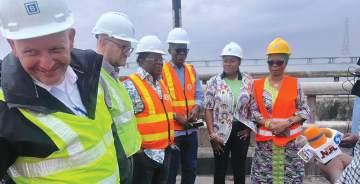
Stakeholders in the Oloibiri Oil Museum and Research Centre, OMPRC project were excited last week as the Nigerian Content Development and Monitoring Board, NCDMB formally handed over construction work on the long-awaited Centre in Otuabagi, Ogbia Local Government Area of Bayelsa State, to top notch engineering construction com-
pany, Julius Berger Nigeria PLC. The development which signalled the completion of all preparatory formalities and the alignment of key stakeholders, paved the way for unhindered commencement of construction work at the historic site where oil production began in Nigeria in 1957.
At the ceremony, which
marked a major milestone in the execution of the landmark project, the Executive Secretary of the NCDMB and Project Lead, Engr. Felix Omatsola Ogbe described the multi-billion-naira initiative, which comprises a world-class Oil and Gas Museum and a Research Testing Centre as a fulfilment of the promoters’ vision to place the Otuabagi
community, home to Oloibiri Oil Well 1, on the global map. He noted that, it is an international tradition to immortalize the origins of oil and gas industries by establishing socioeconomically significant projects in such locations, while stressing that Nigeria should not be an exception even as he highlighted global examples such
as Pennsylvania in the United States, which is renowned for its oil heritage sites including museums research centres, and tourist attractions.
Engr. Ogbe, who was represented at the event by the NCDMB’s Director of Corporate Services, Alhaji Abdulmalik Halilu, told the community, history is in the making and that
a dedicated project management team had been constituted to ensure compliance with timelines and quality standards. He also revealed that a comprehensive governance structure has been established for the museum centre to ensure efficient management, with provisions to give the community a strong sense of ownership


www.thisdaylive.com
ABUJA’S SERIAL TRAFFIC OFFENDERS BABATUNDE
OYATERU highlights some of the deficiencies in the system

POOR QUALITY OF TELECOM SERVICES
Inadequate infrastructure is largely responsible for the fitful services, argues SONNY ARAGBA-AKPORE
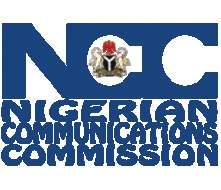
EDITORIAL DEPLORABLE STATE OF CEMETERIES

opinion@thisdaylive.com
The price tag is daunting, but a reliable power supply will unlock the country’s potential, argues ELVIS EROMOSELE

Nigeria is an energy starved nation. Imagine a country in the 21st century with over 200 million people and an unstable power supply. It's a recipe for backwardness. It is also a sad commentary on the failure of successive governments over a hundred years. No wonder the hum of progress is too often drowned out by the silence of power outages.
Today, homes flicker into darkness, businesses grind to a halt, and dreams of economic growth stall in the face of an unreliable electricity grid. The numbers paint a grim picture. Nigeria generates a mere 6,000 megawatts (MW) of electricity against an estimated demand of 40,000 MW needed for a stable, nationwide supply.
The World Bank estimates this power deficit costs the economy $29 billion annually, an economic haemorrhage that highlights the urgency of reform. This may explain why Adebayo Adelabu, Nigeria’s Minister of Power, laid out a bold vision: a $200 billion investment over 20 years to deliver a 24/7 electricity supply. This staggering figure, $10 billion a year, has sparked both hope and scepticism. Can Nigeria transform its beleaguered power sector, and what will it take to light up the nation?
Experts argue that Nigeria’s power crisis is a hydra-headed beast. The issues span generation, transmission, and distribution. The national grid, a relic of decades-old infrastructure, is plagued by inefficiencies. Reports indicate that for every 100 MW generated, 7.79 MW is lost in transmission, a figure that reflects both technical shortcomings and systemic neglect. Vandalism compounds the problem. Indeed, between January 2022 and October 2024, the government spent ₦29.3 billion (roughly $17.7 million) repairing 266 vandalised electricity towers, an average of $66,500 per tower. These fixes however are mere Band-Aids on a system that demands a full overhaul.
The human toll is palpable. In Lagos, small businesses and homeowners alike are compelled to rely on costly petrol/ diesel generators to keep their machines/ households humming. Many businesses spend more than half of their earnings on fuel. Across rural Nigeria, entire communities remain off the grid, their potential stifled by darkness; e.g. Otueke in Bayelsa State. The metering gap, less than half of customers have metres, further complicates matters, leading to estimated billing and revenue losses for distribution companies and discontent from electricity consumers. These challenges are not new, but the scale of the solution proposed is unprecedented.
The $200 billion goal is ambitious. It seeks to achieve a generation capacity of 88,000 MW, enough to ensure uninterrupted electricity nationwide by 2045. This figure encompasses upgrades across the entire value chain, generation, transmission, and distribution. It also accounts for the

integration of renewable energy, grid modernisation, and policy reforms to attract private investment.
Breaking down the numbers, the plan allocates significant funds to each segment. Transmission infrastructure, for instance, requires a massive investment. The Presidential Power Initiative, launched to modernise the grid, has already committed $1.9 million and €62.9 million in its first phase, boosting capacity by 2,000 MW. Yet, industry experts estimate that $100 billion over 20 years is needed just to maintain current service levels, let alone expand them. Distribution upgrades, including metering initiatives, also demand substantial funding.
The Nigerian Electricity Transmission Access Project (NETAP), backed by a $486 million World Bank credit, is a step toward addressing these gaps, but it’s a drop in the bucket compared to the broader need.
So, while the government focuses on grid expansion, decentralised solutions like minigrids and solar projects are gaining traction. In a country where vast rural areas remain unconnected, off-grid systems offer a lifeline.
Mini-grids, in particular, are emerging as a game-changer. In northern Nigeria, communities like Gbangba in Niger State have seen transformative change through solar-powered mini-grids. One shudders to imagine what the people used before the project.
The private sector’s role is critical. Of the $32.8 billion needed by 2030 for universal electricity access, the government plans to provide $17 billion, leaving $15.8 billion to come from private investors. Embedded generation, small-scale power plants serving specific communities or industries, and renewable projects like solar and hydro are seen as cost-effective, but progress is slow. Revenue shortfalls and bureaucratic red tape deter investors, leaving Nigeria’s power sector in a Catch-22: it needs funds
to improve, but improvement is needed to attract funds.
The $200 billion estimate is a road map, but its success hinges on collaboration between government, private investors, and communities.
We can agree that the $200 billion price tag is daunting. But this is not just about money. Implementation efficiency, transparency, and anti-corruption measures are equally critical. Nigeria’s history of mismanaged projects looms large, with critics pointing to past initiatives that fizzled out despite hefty budgets. The truth is that the funds are one thing, but execution is another. Without accountability, $200 billion could vanish into thin air.
Short-term goals offer a glimmer of hope. Experts estimate that $15-30 billion by 2030 could stabilise the grid, expand metering, and deploy more mini-grids. These steps wouldn’t deliver 24/7 power but could significantly reduce outages and connect millions more to electricity. For urban centres like Lagos and Abuja, grid upgrades could mean fewer blackouts. For rural areas, off-grid solutions could bridge the gap, promoting economic growth and improving quality of life.
The stakes are high. A reliable power supply could unlock Nigeria’s potential, fueling industries, creating jobs, and reducing poverty. The World Bank’s $29 billion annual loss estimate underscores the cost of inaction. Yet, the path to transformation is fraught with challenges, technical, financial, and political. As Nigeria grapples with its power crisis, the $200 billion question remains: Can the nation muster the resources and resolve to light up its future?
•Eromosele, a corporate communication professional and public affairs analyst, writes via elviseroms@gmail.com

Nigeria is a country in many ways thatched over by homespun wisdom and aphorisms. Buoyed by oral tradition and deeply held religious habits, Nigerians quickly employ various pithy, colourful sayings, idioms, and encouragements. One of the newest additions is that Nigeria will happen to you. This is a local interpretation of Murphy’s Law, which means Nigeria's failings will break your cocoon no matter how well insulated you believe you are.
Well, on the evening of Easter Monday in the capital city of Abuja, many things broke. An errant driver broke the traffic laws and drove his sports utility vehicle into the side of

my car, breaking several bones in my body. I broke my promise to my children to return home. While it would be easy in retrospect to claim Nigeria had happened to me, accidents happen everywhere. This retrospective is more about what did not happen.
After the accident, I had the good fortune to be taken to a nearby hospital, which fortuitously happened to be the NNPC Multi-specialist hospital. Upon arrival, the accident and emergency ward staff did not insist on a police report or a financial deposit before rendering triage services. This does not happen usually. As I discovered in the following days, the hospital covered a wide range of specialities and had first-rate medical facilities, which meant I could receive the full suite of my treatment in one place. The hospital, however, was little known to the public, as it had only begun receiving general patients recently. Many of my guests would remark on how impressive the facilities were and how unaware they were of their existence. Some would joke that they hoped it would remain clandestine, so their quality would not be compromised.
My experience was remarkable, but it was also rare. Nigerian medical facilities too often turn away accident victims, demanding a myriad of administrative prerequisites which are as impractical as they are punitive. Too many Nigerians have stories like this. But how a nation heals itself matters; how it regenerates itself, replenishes its population, cares for the ailing, and keeps its citizens alive and well is foundational for development and prosperity. According to a Nigeria Governors’ Forum report, spending on healthcare has increased in recent years; between 2016 and 2022, it tripled, going from ₦305.1 billion to ₦ 876.4 billion, a 187 per cent increase. However, given its population, this still falls below the country’s basic needs for public health. The government spends an average of 4.5 per cent of the national budget on the sector, but has pledged to increase the allocation. The shortfall may be evident in the average life expectancy for Nigerians, which at 54.46 years, is one of the lowest on the continent, averaging 64.38 years. Additionally, while a demographic dividend is imminent, the population will eventually age, by 2050, when there will be a discernible population boom,
10 per cent of the population will be elderly, and current healthcare systems are not built to deal with this shift in demographics and the disease burden.
There are also no institutional social safety nets or government-mandated social insurance, which means a quarter of households spend more than 10 per cent of their income on out-of-pocket expenses. All these numbers highlight how rare my experience was. Many Nigerians will not have access to top-line medical facilities, and when they do, many may be unable to afford them.
Another thing that did not happen was the traffic code enforcement. As far as I know, the errant driver who caused the accident is still driving, and his license will not be penalised. To come to terms with this is to understand the psychology of the capital city. It is a city that should symbolise code and conduct, that houses all the arms of government, those who make the laws, implement and adjudicate them, and yet Abuja is awash with serial traffic offenders—for the simple reason that many who flout traffic laws are employed by or are family members of the same officials who are meant to uphold the law. There is also a culture of drag racing and drifting that is well established in Abuja, which contributes to the wanton disregard for public safety. Many of those involved are the scions of prominent political families.
According to the Federal Safety Corps, 70,530 people were involved in accidents in 2024, with 5421 lives lost. This number may be underreported, mainly given the number of accidents in remote, unpublicized places. When compared to more industrialised and motorised societies, the numbers may pale. However, those societies have better hospital per capita ratios. According to World Bank estimates, the ratio is 0.5 hospital beds per 1000 people.
Many of those critically or fatally injured in Nigeria would not have had access to quality medical facilities, and those who did may not have been able to afford it. My experience was remarkable, and I was fortunate to have access and the means to afford it. I must commend the staff of the NNPC Medical Services, Abuja, especially Dr Valentine Ogbu, Dr Halima Mayaki, Kefas Yakubu and Victor Adejo. As fortunate as my experience was, there are still some things that did not happen that highlight the deficiencies in the system. The police arrived at the scene shortly after the accident, but there was no ambulance service. Good-natured observers pulled me from the wreckage, and one was kind enough to take me to the hospital. There is also no traffic camera footage of the accident to adjudicate liability if it came to that.
Nigeria happened to me, and I survived because of it. Still, in a country with Nigeria’s ambitions and resources, my experience and survival should not be remarkable or miraculous; it should be the standard. The system's deficiencies and failures often result from a policy-implementation gap and not some cosmic injustice or celestial misfortune. Usually, too, in the place of critical exposition, Nigerians resort to homespun wisdom and idioms to encourage themselves. One that I heard a lot of was, ‘What does not kill you makes you stronger’. The problem with that is, in our part of the world, what did not kill you should never have been given the chance.
•Dr Oyateru is a communication and development professional
Inadequate infrastructure is largely responsible for the fitful services, argues SONNY ARAGBA-AKPORE

Early last week, the Association of Licensed Telecommunications Operators of Nigeria (ALTON) announced a temporary suspension of Subscriber Identification Module (SIM) card services nationwide to address concerns raised by the National Identity Management Commission (NIMC) on migration of SIM related services to the national platform.
In a statement issued on Tuesday July 1, 2025 and signed by ALTON chairman, Gbenga Adebayo an engineer and publicity secretary, Damian Udeh, said the transition, which affects processes such as SIM swap, SIM replacement, new SIM activations, and Mobile Number Portability (MNP), has introduced unforeseen technical challenges, temporarily disrupting real-time identity verification services nationwide.
Although it claimed it was giving such directives on the instructions of NIMC, there are also strong indications that the steps were being taken to forestall and minimize further congestion on the various networks which have continued to experience outages leading to uncomfortable customer experience.
Poor services have been traced to tired and sometimes decaying infrastructure as Mobile Network Operators (MNOs) are believed to have been traumatized by rising foreign exchange rates, dwindling revenue occasioned by customer apathy to subscriptions as a result of a comatose economy and unrealistic purchasing power.There are also issues of right of way challenges created by local government and state officials.
While operators emphasize services in the urban and semi urban areas where the economy appears resilient, rural dwellers have been left to bemoan a fate that makes them resort to their own devices to communicate.
Even in the so-called urban centres, there are several black spots so much so that no urban dwellers can lay claim to robust services and as a result, subscribers are plagued constantly by incomplete calls, drop calls and poor data services.
Except for those who may pretend that all is well, the situation is not as rosy as we imagine. Strangely, ALTON and its members are helpless.
Even the regulator, the Nigerian Communications Commission (NCC) appears handicapped as it cannot go beyond dishing out guidelines to improve service delivery in an economy guided by business decisions.
Beautiful as such guidelines and policies may seem, the operators are clearly the ones to determine how fast and far they can run especially since any race or decision is based on funding, more so when foreign direct investment (FDI) has been on a steep decline in the last few years.
Although not generally discussed, one critical factor is the shortage of foreign exchange in Nigeria.
enshrined in the Key Performance Indicators (KPIs) and Thresholds specifically for operators’ guidance.
The regulations define specific KPIs for 2G, 3G, and 4G networks, focusing on critical metrics such as: Drop Call Rate: The percentage of calls that are unexpectedly terminated. Call Setup Success Rate: The percentage of calls successfully connected.
Traffic Congestion: The level of network congestion affecting call and data services. Operators were required to meet these KPIs to ensure optimal service delivery.
Penalties were also prescribed for failure to comply . These penalties include a fine of ₦5 million per infraction, plus an additional ₦500,000 for each day the violation persists .
The regulator categorized the country into three priority reporting areas to tailor service quality efforts: For instance, Priority one Areas including Lagos, Abuja, Rivers State Require 100% compliance with QoS KPIs. While priority two Areas: Require 80% compliance. Priority three Areas: Require at least 70% compliance. This tiered approach ensures that regions with higher demand receive focused attention. Telecom operators were expected to submit monthly QoS reports to the NCC, detailing their performance against the established KPIs.
“The NCC employs various methods to assess compliance, including drive tests, consumer surveys, and data from Network Operating Centres (NOCs).”
Although the NCC has the authority to impose administrative fines on operators who fail to meet QoS standards but it is not clear how this could be done especially when the operators are handicapped. .
The NCC fines range from ₦5 million to ₦15 million per infraction, with daily penalties of ₦500,000 to ₦2.5 million for ongoing violations .
“These regulations aim to improve the overall telecommunications experience for Nigerian consumers by ensuring consistent and reliable service delivery across the country,” NCC documents submit.

Due to paucity of local funding, operators rely heavily on foreign exchange for imported equipment and services—ranging from base stations, towers and routers to software licensing and satellite connectivity, and so foreign exchange sourcing remains a nightmare and operators face delays in importing vital infrastructure components. Costs of equipment rise, especially when they have to source foreign currency from the parallel market at higher rates. Payments to international vendors are delayed, straining business relationships and slowing maintenance or support services; and expanding projects are stalled, as the deployment of 4G and 5G networks is hindered. ALTON stated last week that “this disruption (of SIM service suspension) follows a recent directive from NIMC, mandating our Mobile Network Operator (MNO) members to transition to a new identity verification platform. The migration process, which is central to the verification required for SIM registration and other services, has unfortunately impacted service availability. In 2024, the NCC established comprehensive Quality of Service (QoS) thresholds to enhance the performance of telecommunications services in the country. These standards, outlined in the Nigerian Communications (Quality of Service) Regulations, 2024, and the accompanying Business Rules, set clear expectations for telecom operators across various network segments. These were
In reality, poor quality of service is traceable to a myriad of factors including inadequate infrastructure which are poorly maintained or outdated network infrastructure leading to frequent breakdowns and service interruptions. There are also insufficient investments in expanding network coverage, especially in rural areas. The recurrence of poor and unreliable electricity supply forces telecom operators to rely heavily on expensive generators, increasing operational costs and causing downtime.
High subscriber density without proportional infrastructure expansion causes network congestion, leading to dropped calls and slow data speeds.
Regulatory challenges especially in delays and inconsistencies in government policies and regulatory frameworks hinder timely upgrades and improvements in telecom services.
Lack of efficient customer support and service management contributes to unresolved complaints and customer dissatisfaction. Frequent vandalism of telecom equipment and theft of cables disrupt network services and increase maintenance costs.
Scarcity of adequate frequency spectrum allocated to operators restricts network capacity and quality. There is deficiency in expertise through shortage of skilled technical personnel that affects the maintenance and optimization of telecom networks.
Above all high operational costs and economic instability limit the ability of operators to invest in quality infrastructure.
•Aragba-Akpore is a member of THISDAY Editorial Board

Editor, Editorial Page PETER ISHAKA
Email peter.ishaka@thisdaylive.com
The authorities must pay adequate attention to public cemeteries
By law, cemeteries are the statutory responsibility of the 774 local government areas in Nigeria. But with that level of government almost in comatose, it is not surprising that most of the cemeteries across the country reflect the value we attach to remembering the dead. Take, for instance, the Iyana-Isasi Cemetery on the Lagos-Badagry Expressway. Just like many other public burial grounds, it falls short of the requisite health standards. Overcrowded and ill-maintained, it is a place where the dead are buried in waterlogged, shallow graves. Besides the distress to grieving families and the health hazards posed by the environment, the cemetery forbids gravestones or markers to identify burial spots.
Ordinarily, well maintained cemeteries add to the beauty and general ambience of communities. They also serve as tourist attractions in some climes. However, many so-called final resting places in Nigeria are in deplorable conditions. They are poorly maintained, poorly protected, and there is often the problem of access. Even worse, many of them are in poor sanitary state, posing danger to health and the environment. For instance, cemeteries in many states in the North suffer from poor maintenance. The Kaura Goje cemetery in Nasarawa Local Government Area of Kano State is always flooded when the rains are heavy. The same fate afflicts some other cemeteries like Dantsinke and Getsi in the ancient city of Kano where graves collapse on a regular basis.

cemeteries, and the growing need to bury the dead, particularly in urban areas, public cemeteries are being cited in many unlikely places.
Indeed, a recent study on burial practices within the vicinity of an active municipal cemetery in the Gwange area of the Maiduguri metropolis, Borno State, revealed a significant threat to groundwater quality over time. A similar study in Port Harcourt, Bonny, Okrika and Degema in Rivers State unearthed poorly maintained cemeteries. And for a long time, the nauseating conditions of public cemeteries at Epe, Badagry and Ikorodu in Lagos State have been become an environmental nightmare to many residents.
Ill-maintained cemeteries constitute a major health hazard for communities living around such environment, especially at a time the country is battling bouts of disease outbreak
T H I S D AY
EDITOR SHAKA MOMODU
DEPUTY EDITOR WALE OLALEYE
MANAGING DIRECTOR ENIOLA BELLO
DEPUTY MANAGING DIRECTOR ISRAEL IWEGBU
CHAIRMAN EDITORIAL BOARD OLUSEGUN ADENIYI
EDITOR NATION’S CAPITAL IYOBOSA UWUGIAREN THE OMBUDSMAN KAYODE KOMOLAFE

From Lagos to Enugu, Port Harcourt to Potiskum, Kano to Maiduguri, it is obvious that the local government areas in many of the 36 states are incapable of managing the cemeteries. But the real concern is the danger they constitute to public health. Many of the cemeteries cited in flood-prone areas are hazardous as decomposing bodies in unmanaged graves can pollute the groundwater, posing long-term risks to the surrounding environment. Unfortunately, due to limited spaces in many existing
IEDITOR-IN-CHIEF/CHAIRMAN NDUKA OBAIGBENA
GROUP EXECUTIVE DIRECTORS ENIOLA BELLO, KAYODE KOMOLAFE, ISRAEL IWEGBU, EMMANUEL EFENI
DIVISIONAL DIRECTORS SHAKA MOMODU, PETER IWEGBU, ANTHONY OGEDENGBE
DEPUTY DIVISIONAL DIRECTOR OJOGUN VICTOR DANBOYI
SNR. ASSOCIATE DIRECTOR ERIC OJEH
ASSOCIATE DIRECTOR PATRICK EIMIUHI
CONTROLLERS ABIMBOLA TAIWO, UCHENNA DIBIAGWU, NDUKA MOSERI
DIRECTOR, PRINTING PRODUCTION CHUKS ONWUDINJO
TO SEND EMAIL: first name.surname@thisdaylive.com
Letters to the Editor
The Atan Cemetery in Yaba, one of Nigeria’s oldest cemeteries, is in bad shape. It is mostly overgrown by weeds, particularly the public section. Many of the graves have caved in. Even the public section of the Ikoyi cemetery, home to the rich in Lagos State, is also in sorry state, and gradually losing its shine as many grave sites have collapsed while others are covered by weeds. This is despite that improper maintenance of grave sites may pose problems as some communicable diseases outbreaks have been linked to broken down graves, especially during the raining season.
Perhaps in a bid to stem the growing crisis of overcrowded cemeteries, former Lagos State Governor Babatunde Fashola signed a bill into law in 2013, permitting the voluntary cremation of bodies and unclaimed corpses. It was a law for the books as it was abandoned wholesale. But it is shameful that we cannot accord a measure of dignity to the dead in our country. That this is a general malaise in practically all our ill-maintained cemeteries across the country is why authorities should be concerned. This development constitutes a major health hazard for communities living around such an environment, especially at a time the country is battling bouts of disease outbreak.
Letters in response to specific publications in THISDAY should be brief (150-300 words) and straight to the point. Interested readers may send such letters along with their contact details to opinion@thisdaylive.com. We also welcome comments and opinions on topical local, national and international issues provided they are well-written and should also not be longer than (750- 1000 words). They should be sent to opinion@thisdaylive. com along with photograph, email address and phone numbers of the writer.
n the early hours of 4th July, 2025, I lost my son, Ndubuisi Kanayo Iheanacho Udutchay—my pride, my joy, and the embodiment of hope for the future. Armed robbers snatched his life away in the cruelest of ways at his residence in Independence Layout, Enugu, leaving behind a shattered father, family and a society that ought to demand better.
On the fateful night of 3rd July, 2025, he had returned home, parked his car, and alighted to open the gate to his house. It was at that moment of vulnerability that the heartless robbers struck. They had most likely trailed him with the sinister intent of snatching his vehicle or abducting him. What followed was a scene of chaos, fear, and senseless violence. The robbers shot sporadically into the air, unleashing terror on a quiet neigbourhood. Amid theconfusion, some courageous neighbours attempted to interrupt the robbery. But that disruption, rather than scared the criminals, provoked them.
They panicked, and in their bid to escape, they shot my son in the stomach and fled with his mobile phone, leaving him bleeding and broken. Ndubuisi was rushed to the Parklane Hospital in Enugu where he was operated upon.
As a father, nothing can prepare one for the sight of his son lying in a hospital bed, fighting to live, struggling to breathe, and clutching the fragile thread between life and death. For a moment, we had hope. He was young, strong, and had dreams.
He had just begun to walk the path of a meaningful life. But at 2am on July 4th, that hope was crushed. My son breathed his last. He died not just of the robbers’ bullet, but of a system that failed to protect him. Ndubuisi was born on 14th October, 1992. He was a promising lawyer,
a graduate of the University of Nigeria, Enugu campus, and almost celebrating his 33rd birthday. One of those children that gave parents reason to believe Nigeria could be great again. He was diligent, passionate, and humane. His journey throughschool and into the legal profession was driven by a desire to serve justice, to stand for what is right, and to contribute meaningfully to society. He was a child every father would be proud of — respectful, responsible, and full of promise.
Regrettably, his laughter, which used to echo down the halls, is now a memory. His meticulous advice, his youthful energy, his burning desire to serve justice—they are gone, snuffed out by a reckless act that was both senseless and preventable.
As I write this, my heart bleeds. I am a father in mourning. I am a father in anguish.
I am a father whose son was murdered by the very violence we have normalized in this country. My son’s life was worth more than a phone or a car. He was worth more than the fear that drove armed men to shoot blindly. He was worth every ounce of effort our leaders should be investing in security and justice reform.
I write not only to express my grief, but to scream in anger, in despair, and in deep frustration. How long shall we continue to bury the future because of the failures of the present? My son’s death is not an isolated case. Across the country, the stories are the same. Sons and daughters full of promise are wasted daily by criminals emboldened by a society that seems numb to tragedy. What will become of a nation where the dreams of its youth are silenced at gun-point?
I want answers, but more than that, I want change. I want my son's
death to matter.
I want his blood to speak not in vengeance, but in transformation. Let his death stir something in our leaders, in our security agencies, in our lawmakers. Let this loss not just be another statistic. I raise this voice not only for my beloved son, Ndubuisi, but for every victim of insecurity in Nigeria. We are tired of candlelightprocessions, condolences and statements. We want action and reform. We want a country where dreams are nurtured, not destroyed. Where lawyers, doctors, engineers, artisans, and all our children can live without fear of being murdered in front of their homes.
My son is gone and no amount of words will bring him back. But I will not be silent. For the sake of other sons and daughters, I will speak. For the sake of our collective sanity and existence, we must speak. Let us not wait until tragedy visits our doorsteps before we cry for justice.
As I mourn, I hold onto one thing, and that is hope. The hope that someday, this country will be safe. That other fathers will not suffer as I do now. That a time will come when human life is sacred, when young Nigerians can live out their dreams without fear. That one day, when I join my son, I can tell him that Nigeria did not forget him. That his death made a difference. That his blood became a seed for national re-awakening.
Rest, my son. Rest until Nigeria becomes the nation you dreamt of; one where no father buries his son because he simply came home.
•Chief Henry Udutchay, Abuja

Kayode Tokede
The ongoing rally in the Nigerian equities market has further widened the gap between blue-chip firms and other listed companies as a total of 19 out of the 150 listed firms contributed 82.39 per cent or N62.578 trillion of the N75.951 trillion market capitalisation of listed securities on the Nigerian Exchange Limited (NGX) as of June 2025.
The 19 blue-chip firms cut across cement makers, financial institutions, oil and gas, telecommunication, agriculture and Fast-Moving Consumer Goods (FMCG), and power generating companies.
Both foreign and domestic investors’ demand for these companies has impacted the NGX market capitalisation, which gained N5.49 trillion and N13.2 trillion in June 2025 and half year (H1) 2025, respectively.
These 19 companies are well-
established, financially sound, and reputable, with a history of reliable performance and regular dividend payout to shareholders.
As of June 2025, Airtel Africa Plc remain the highest market capitalised stock, followed by BUA Foods Plc. BUA Foods has overtaken Dangote Cement and MTN Nigeria Communication, the second and third most capitalised stocks on the Exchange before now.
Although the stock price of Airtel Africa dropped by 2.6 per cent to N2,310.50 per share in June 2025 from N2,372.00 per share when it closed in May 2025, the telecommunication company’s market capitalisation closed June 2025 at N8.68 trillion.
BUA Foods’ market capitalisation stood at N8.26 trillion amid a 4.32 per cent increase in stock price to N459.00 per share as of June 2025 from N440.00 per share, the stock opened for trading in the month under review.
MTN Nigeria’s market capitalisation closed June 2025 at N7.51 trillion when its stock price gained 27.6 per cent in one month to close at N357.50 per share from N280.10 per share it opened for trading in the month under review.
The Q1 2025 migration to profitability played a critical role in the upward movement of MTN Nigeria Communications’ stock price on NGX that translates into its market capitalisation.
For Dangote Cement, its market capitalisation dropped to N7.4 trillion as of June 2025 as its stock price traded flat at N440.00 per share.
Meanwhile, the cement manufacturing company’s stock price has depreciated by 8.1per cent in its Year-to-Date (YtD) from N478.80 per share it opened for trading.
Further findings by THISDAY revealed that BUA Cement and Seplat Energy Plc were the only two companies with a N3 trillion
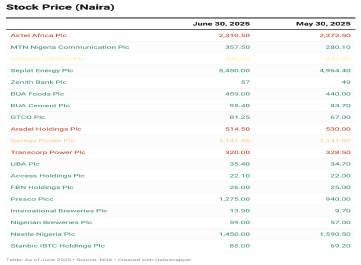
market capitalisation threshold as of June 2025.
Closing June 2025 at N95.40 per share, BUA Cement’s market capitalisation increased to N3.23 trillion, while Seplat Energy’s market capitalisation stood at N3.21 trillion.
The stock price of Seplat Energy gained 9.8 per cent to close June 2025 at N5,450.00 per share from N4,964.40 it closed at trading May 2025.
Guaranty Trust Holding Company Plc (GTCO), Zenith Bank Plc, Aradel Holdings Plc, Geregu Power Plc, Transcorp Power Plc, and International Breweries Plc, ended June 2025 with a market capitalisation above N2 trillion.
A breakdown showed that: GTCO closed June with a market capitalisation of N2.77 trillion; Geregu Power, N2.85 trillion; Zenith Bank, N2.34 trillion; Aradel Holdings, N2.24 trillion; International Breweries, N2.34 trillion, and Transcorp Power, N2.4 trillion.
In addition, United Bank for Africa Plc and six other companies’ market capitalisation were above the N1 trillion mark.
In the month under review, UBA saw its market capitalisation at N1.45trillion, while Access Holdings’ market capitalisation stood at N1.18 trillion.
Others: FBN Holdings, N1.09 trillion; Presco Plc, N1.28 trillion; Nigerian Breweries, N1.83 trillion; Nestle Nigeria, N1.15 trillion, and Stanbic IBTC Holdings Plc with N1.35 trillion market capitalisation as of June 2025.
Comenting, the Executive Vice Chairman of Highcap Securities Limited, Mr. David Adonri, stated that investors were in the earnings season and that what investors would get from dividends is one of the factors that drives the demand for shares in the stock market.
He noted that the stock market is defying current political uncertainties
because investors are futuristic and the prospect for a yield environment is bright. According to him, “Optimists also see strength in the market from the perspective of corporate fundamentals, which remain strong despite macroeconomic frailties and assault from misfired public policies.”
On his part, the Chief Research Officer, InvestData Consulting Limited, Mr. Omordion Ambrose, noted that the Nigerian stock market is over-concentrated with the attendant ‘keyman’ risks, part of what are major barriers to market development.
“This is demonstrated by the fact that only 19 out of 150 listed companies account for over 80 per cent of stock market capitalisation,” he said. He noted that the over 150 issuers base is relatively small, urging more companies to utilise the opportunity of accessing the funds needed to expand their businesses and get listed.
Sunday Ehigiator
The Lagos State Government, through the Ministry of Commerce, Cooperatives, Trade and Investment, in partnership with AfreximBank and ImpactHER has launched the Lagos SMEs Export Readiness Programme (LASERP) for Small and Medium Enterprises (SMEs) as part of efforts to scale their businesses beyond national borders under the African Continental Free Trade Area (AfCFTA).
Speaking during the opening ceremony of the export readiness training programme organised by the Lagos Ministry of Commerce, Cooperatives, Trade and Investment in partnership with AfreximBank and impactHER in Lagos, the Commissioner for Commerce, Cooperatives, Trade and Commerce, Lagos State, Mrs Folashade Bada Ambrose while delivering her welcome address
described the launch as a defining chapter in Lagos state’s collective commitment to expanding the frontiers of international trade participation for our Micro, Small and Medium Enterprises (MSMEs). She described the initiative’s launch as a bold step towards transforming Lagos-based businesses into globally competitive exporters, building wealth, creating jobs, and amplifying Lagos State and Nigeria’s economic prosperity. She
noted that a total of 253 successful SMEs have been shortlisted for the programme.
“The concept of export readiness is not just a trending term but an economic imperative. In an era marked by regional integration and the African Continental Free Trade Area (AfCFTA) operationalisation, we cannot afford to keep our vibrant enterprises confined to domestic markets. Our MSMEs must evolve from local champions
to continental contenders. Nigeria, and Lagos State, in particular, has long been regarded as the economic engine of West Africa. But being an engine is not enough if we are not propelling forward. This programme is the vehicle that will drive us into new markets, beyond borders, and into the centre of intra-African commerce,” she said.
Expressing appreciation to esteemed partners Afreximbank and ImpactHER for their collaboration,
commitment to facilitating trade and industrialisation across Africa, and empowerment of women-led businesses on the continent, she noted that the week-long training has been meticulously designed to demystify the export process, build practical skills, and create a clear pathway to cross-border trade participation.

The Trade Depot is targeting the Nigerian wine market of $420 million with an Italian Amabile De Rosa sweet wine, with a pledge to commence local manufacturing
of some products it has been importing into the country.
This was disclosed by the Chief Executive Officer of Trade Depot, Mr. Onyekachi Izukanne, during the unveiling of Amabile De Rosa where he declared that
The Director General of the Nigerian Maritime Administration and Safety Agency (NIMASA), Dr. Dayo Mobereola, has reaffirmed the agency’s commitment to strengthening Nigeria’s shipbuilding and repair capacity during an inspection visit to Nigerdock at Snake Island integrated Free Zone, Lagos. Mobereola was at Nigerdock to assess the ongoing maintenance work on the DB Lagos, a special mission vessel used for maritime surveillance and national security operations. The vessel plays a vital role in combating oil theft, smuggling, illegal immigration, and other maritime crimes within Nigeria’s waters.
Speaking during the inspection, Mobereola expressed satisfaction
with the progress made and described the project as a clear demonstration of Nigeria’s capability to handle sophisticated ship repairs and construction.
“What I am seeing here today is a testimony to the fact that we have the ability not only to repair but also to build here in Nigeria,” he stated.
He further emphasized that the inspection aligns with the vision of the Honourable Minister of Marine and Blue Economy, His Excellency Adegboyega Oyetola, who has prioritized the development of local capacity in shipbuilding and repairs. “We at NIMASA are demonstrating our belief in this vision by maintaining our own vessels here,”Mobereola added.
Barely one week after the Lagos State Government banned the production and use of single use plastics, the Manufacturers Association of Nigeria (M AN), has commended the Ogun State Government’s proactive and sustainable approach to managing plastic waste, especially single use plastics in the state.
The MAN said that rather than copying Lagos State’s disingenuous ban of production and use of single use plastics, the Ogun State Government has come out with progressive strategies that balanced environmental sustainability with economic stability.
The Director General of MAN, Mr. Segun Ajayi-Kadir, who gave this commendation, said that the association is appreciative of the Ogun State’s initiatives aimed at reducing plastic waste, promoting recycling and ensuring a cleaner environment.
Ajayi-Kadir particularly noted the resolve of the government to partner with manufacturers and other operators in the plastic value chain to advance its waste to wealth initiative.
He said: “These efforts align
with MAN’s commitment to environmental sustainability and responsible manufacturing practices.”
It should be recalled that the Ogun State Commissioner for Environment, Mr. Ola Oresanya, recently in Abeokuta during this year’s commemoration of World Environment Day with the theme “Beating Plastics,” highlighted that “plastics for cash” and “blue box” initiatives are among its sustainable approach to managing waste and converting them to wealth in the state.
Under these initiatives, “Plastics for Cash” program would enable residents to exchange sorted plastic waste for monetary value or goods, which would create income opportunities for youth, women and informal waste collectors while the “Blue Box” initiative would promote structured house-to-house waste separation and collection that is driven by the Ogun State Waste Management Authority.
Ogun State Government has also strengthened the implementation of these initiatives with the constitution of Plastic Management Committee (PMC) made up of regulatory agencies, manufacturers and academic institutions.
over 50 million bottles of wine are consumed annually in Nigeria.
Izukanne said: “A very big part of our strategy is import substitution. Anything that we import today that can be produced locally, the objective for us over the next three years is that we have that item completely locally produced. As we speak, we are finalising arrangement that will kick off this year with massive manufacturing of operations for a lot of beauty and personal care items in our portfolio.
“The production we are starting this is for export meaning that
we are going to earn foreign exchange. That is the way we want to go. Once we get from the data what the market wants, we will immediately source it, establish demand, create local production. We want an Africa that is producing for itself and trading among itself. That is our mantra as an organisation.”
He described Amabile De Rosa as a premium drink because of the places they are displayed and consumed. Recently, Amabile is the wine of choice at the probably the most high profile event in Nigeria that had 50 heads of state across
Africa in attendant.
Commenting on the Nigerian wine market, Izukanne said that “in Nigeria, we drink about 50 million bottles of wine. Nigeria is a $420 million wine consumption market every year. This volume keeps growing every year and is driven by GenZs and the millennial. And 70 per cent of this consumption is by people under 45 years.”
He added that this growth is also driven by preference for sweet wines. “This implies that there are significant opportunities for sweet wines in our market. Our objective
is to find a partner to develop a wine that is sweet and fun to drink so that consumers will have quality options to go for.
He also said that TDL is targeting the creation of 4,000 jobs within the next two years with the introduction of Amabile Rose.
“We expect that the Nigerian wine market will continue to grow at 5.0 to 10 per cent volume wise year-on-year. In our view from three years from now we will be consuming about 50 million bottles of wine every year. We expect the trend in the retail wine will continue to increase,” he said.
Ebere Nwoji
Insurance operators have ended the maiden Insurance Awareness Week with a call for reforms, sustained awareness and adoption of insurance by Nigerians.
The week-long event, which featured series of activities such as awareness walks, school visits, market outreaches, and a youthfocused innovation challenge, was held simultaneously in Lagos, Ibadan, Port Harcourt and Kano.
The event was organised by the Chartered Insurance Institute of Nigeria (CIIN) to raise insurance awareness and encourage insurance adoption by Nigerians, stakeholders’ engagement and industry collaboration.
In her opening remarks, the CIIN President, Mrs. Yetunde Ilori, emphasised the need for the industry to sustain the awareness, noting, “The awareness we have created during the one week, is not for today alone, it should be
sustained and continued. Insurance Awareness Week did not just start a week ago; it is something we have started planning long ago.”
Ilori, who reaffirmed the institute’s commitment to initiatives that promote learning and engagement within the industry, called on Nigerians to share the vision, underscoring the need for all to embrace insurance to secure Nigeria’s future.
Speaking on the importance of the event, she said, “This is
the first time we are having Insurance Week in the history of the insurance industry. This initiative was designed to reach the grassroots and spotlight the critical role of insurance in the national economy.
She thanked the commissioner for Insurance and other stakeholders for their unwavering support, stating that the weeklong event would not have been achievable without their support and backing.
The President/Chief Executive of Dangote Industries Limited, Alhaji Aliko Dangote has commended the Nigerian Ports Authority (NPA) for the effective way it has handled the implementation of the federal government’s policy on domestic sales of crude oil and refined products in Naira.
To this end, Dangote has donated a brand new Coaster bus to the OSS Committee to further ease its operations.
In a letter signed personally, Dangote assured that his organisation will continue to explore ways of
supporting the committee to sustain its successes in the implementation of the presidential directive.
The Letter reads in part: “In recognition of the enormous responsibility placed on shoulders of the One Stop Shop (OSS) by the President and Commander in Chief of the Armed Forces, and our commitment to ensuring the committee delivers on its mandate, I am pleased to donate to the committee one (1) brand new Coaster bus to facilitate the daily discharge of their operations. We believe this bus will be used productively by the
committee as we continue to look for ways to support and appreciate the efforts of this noble committee
Recall that the Chairman, Technical Sub-Committee, on the implementation of the federal government’s policy on domestic sales of crude oil and refined products in Naira, Zacch Adedeji, had during a recent visit to NPA, commended the One-Stop-Shop (OSS) Team, led by the Nigerian Ports Authority (NPA) for ensuring smooth operations of the directive.
He thanked the team led by NPA for “playing a pivotal role
in the successful implementation of the presidential directive on the domestic sales of crude oil and refined products in Naira” Adedeji said: “We recognize that this pioneering effort is a significant achievement, and no doubt reflects your commitment and patriotism”. “Thus, we encourage you to maintain the hard work and dedication that has made this initiative a success. We also extend our gratitude to all participating agencies for their invaluable cooperation and support,” Adedeji said.
Dike Onwuamaeze
The Lagos Chamber of Commerce and Industry (LCCI) in collaboration with the Providus Bank has trained, mentored and graduated 800 young entrepreneurs who are currently doing well in their various lines of business.
The Director General of LCCI, Dr. Chinyere Almona, stated this last week during the “3rd LCCI Entrepreneurship Mentoring Exhibition and Providus Bank Day Programme,” with the theme
“Transforming Ideas Into Impact: Expanding Sustainable Innovation in Entrepreneurship.”
Almona expressed sincere appreciation to Providus Bank for its unwavering support that has enriched this year’s edition in meaningful ways by deepening the growth of entrepreneurship in Nigeri. She said: “Providus commitment and institutional backing have been instrumental in the successful execution of the Entrepreneurship and MSMEs Development initiative of LCCI.”
She also extended appreciation to Bank of Industry and other partners and sponsors for their generosity and support.
According to her, “this programme began 12 years ago with just 25yound mentees. As at last year we have trained and mentored over 800 young entrepreneurs, many of whom are now doing exceptionally well in their various lines of business, bothe locally and globally.”
The Group Head, Education and Faith Based Institutions, Institutional Banking, Providus Bank, Ms. Ndidi
Mordi, congratulated the mentees for their completion of the programme and emphasized the bank’s role in the development of SMEs in the Nigerian economy.
Mordi said: “We appreciate the impacts of SMEs in nation building, which is the reason we are here as a support system. Our mission as a bank is to transform Nigeria and bring the best out of the country, which we can only do by partnering with organisations such as yours because we have interest in bringing future entrepreneurs like you.”
The Minister of State for Agriculture and Food Security, Sen. Aliyu Abdullahi Sabi in this interview said Nigeria’s agricultural sector is experiencing a facelift with the cultivation of hundreds of hectares of land for food security.This, he said is not about rhetorics, but tangible mechanisms that have been put in place to encourage more engagement with agriculture. He spoke with Kuni Tyessi
What are some of the challenges you are facing as minister of state for agriculture and food security?
We are here to solve challenges, and so if I say I am facing challenges, then it means I’m failing. When we came, there were constraints that we had to tackle. For us to focus is for us to achieve President Bola Tinubu’s eight point agenda. ln this case, we have to achieve food security- and we are talking about poverty reduction, cum economic growth. When we came in 2023, there was high inflation in prices of food and when analyzing the problem, you will agree with me that the prices have gone remarkably low. Whichever way you look at it- the best strategy was to focus on what to do to increase production so that there is more food available.
We also began to look at all the other constrains like imputes fertilizer application, and the likes. Agriculture has seasonality, therefore, the only thing we could do was to use whatever we had. Here we have raining season and dry season. What we did was to tap into the seasons, and were able to turn it to three seasons. We started the first planting in 2023 and planted over 20 hectares out of the over 120 hectares we were targeting in sixteen weed producing states like Jigawa, Kano and Borno. Yobe, including Niger state is still ongoing, but this time, we have increased it to 220 hectares this year.
If you are a farmer and making profit, you will want to continue the following year, and this is why we are looking at techniques that increase cost of production. For example- there is a Federal Executive Council committee that is lookin at the logistics on the cost of foods, and we are also talking about storage which comes at different stages.
We are aware that so many people have gone into farming, and the President once gave a window period where some people were allowed to import food. Should that be a continuous thing? It was not scheduled to be an annual occurrence. The good thing is that Nigeria has never gotten to that position where you go to the market and you lack food. We must give credit to farmers for that.
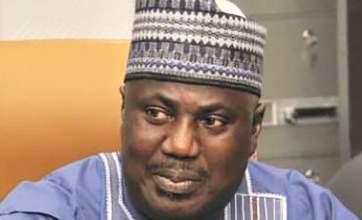
What will it take for Nigeria to have food in abundance?
It will involve so many things. Right now we have gotten over the initial shock, particularly with the stability of the naira. It has come down from its high cost while the dollar is low and has not affected the prices of goods and services. However, we must give kudos to the President.
But Nigerians blame the President for the hardship due to the fuel subsidy removal. What about that?
To be fair to the President, during the presidential campaign, all the candidates said they were going to remove fuel subsidy if they are voted into office. President Tinubu was very courageous for taking that decision and the
funds were poured into the system to improve other infrastructure across the country. Even the price of petrol is coming down. You will agree with me that our roads are improving, and you can go to Kaduna an return on the same day . I did recently and what was unheard of some few years ago have become history as they are now passable and the bad spots have been tackled. Same goes for the Abuja/Minna road which was bad some few years ago and is being worked on.
Insecurity is another problem that has discouraged farmers and many Nigerians from going into faming. Would you say this aspect is also being tackled?
A lot has changed and is still changing,
and things will get better. If you visit most of the affected places, the people will tell you that a lot has changed. Most of the attacks have stopped. I represented Niger-north in the Senate and I know how we used to raise points of order or urgent insecurity matters. Recently, a political actor in my area who went back to farming one of those hot spots brought a bag of beans to my house in appreciation for the peace that has returned to their community and environs. He told me that he farmed where he had not touched in years. He also testified that like himself, many people also farmed. Every one knows the Birnin Gwari area in Kaduna State and how it almost became a no go area. It is free today and markets that have been closed for more than 10 years have all been opened today. Some reporters have been there and reported it on live TV.
Recently I was in Kaduna State where I joined the Governor, Senator Uba Sani to flag off dry season farming in those areas. We are no longer having any problem in some of those spots. The attacks being reported by the media have drastically reduced because the techniques changed when Mr. President gave marching orders to the service chiefs. We must give credit to the President for the kinds of things that have happened in Nigeria and the kinds of shock that people absorb here. If it had happened in other places, it would have caused serious crisis. We must applaud the government for stabilizing the country and I want to assure Nigerian’s that this is going to be much better in the renew hope of the President’s agenda. The Federal Government said it will import modern farming equipment for famers in order to encourage them. I can tell you that the equipment have started arriving it and this is not magic- it is a process. Recently, the Minister of Agriculture and Food Security, Sen. Abba A. Kayari was at Shedda to oversee the delivery of the equipment.
nOTe: story continues in the online edition on www.thisdaylive.com
Fatai Asimi
Recently, Fitch Ratings downgraded Afreximbank’s Long-Term Issuer Default Rating (IDR) from ‘BBB’ to ‘BBB-’ with a Negative Outlook. This decision reflects Fitch’s reassessment of Afreximbank’s credit risk profile stemming from concerns over its exposure to African sovereign borrowers and the management of its loan performance. Notably, Fitch estimated Afreximbank’s non-performing loan (NPL) ratio at 7.1 per cent for 2024, significantly higher than the Bank’s reported 2.3 per cent. This discrepancy arises from differing loan classification methodologies and highlights loans to countries like Ghana, South Sudan, and Zambia as problematic due to restructuring or default status.
Key COnCeRns HigHligHTeD by FiTCH
1. Rising Credit Risk: Fitch flagged concerns about the increased credit risk associated with Afreximbank’s sovereign loan exposure.
2. Sovereign Exposure: Specific loans to African countries with restructuring or default were noted, raising alarms about their performance.
3. Transparency and Risk Management: Fitch criticized Afreximbank for a perceived lack of transparency and reliance on IFRS 9 standards, suggesting these might understate actual credit risk.
4. Restructuring Risks: The agency warned that involvement in future sovereign debt restructurings could weaken Afreximbank’s Preferred Creditor Status, which has been a critical aspect of its creditworthiness.
AFReximbAnK’s RebuTTAl
In response to the downgrade, Afreximbank contended that the evaluation failed to acknowledge the necessary developmental risks it assumes to fulfill its mission as a multilateral development finance institution. The Bank highlighted several points:
• Legal Structure and Preferred Creditor Status: Afreximbank’s legal standing under a multilateral treaty grants it protections typical commercial lenders do not have.
• Alignment with International Standards: The Bank insisted its loan classification and reporting align with IFRS 9, asserting that its reported NPL ratio accurately reflects asset quality.
• Counter-Cyclical Support: Afreximbank
emphasized its history of providing support during crises, demonstrating resilience in financial performance, even amid adversity.
THe DisCOnneCT beTWeen glObAl sTAnDARDs AnD
DevelOpmenT FinAnCe
This situation reveals a significant disconnect between global financial standards and the realities of development finance. The following outlines the perspectives of both Fitch Ratings and Afreximbank:
subject view subject view Afreximbank’s view
Rising Credit Risk The estimated NPL ratio at 7.1% for 2024
Reported lower NPL ratio based on IFRS 9 classification.
Sovereign Exposure Highlighted loans to certain countries are flagged as nonperforming. Considers those loans to be performing under its framework
Transparency Criticized reliance on IFRS 9 and lack of transparency
Declared compliance with international accounting standards.
Restructuring Risk Warned involvement in sovereign restructuring could weaken PCS Asserts Preferred Creditor Status is intact and legally supported
J.p. mORgAn’s RespOnse In contrast to Fitch’s downgrade, J.P. Morgan upgraded Afreximbank’s bonds for 2029 and 2031 from Underweight to Overweight, primarily due to attractive valuations following the bond spread widening by approximately
65 basis points. J.P. Morgan acknowledged the increased risk of sovereign debt restructurings but deemed the financial impact on Afreximbank would be limited due to its strong profitability (15% Return on Average Equity), sizable asset base ($37 billion), and ongoing market access.
AFReximbAnK’s ROle in THe AFRiCAn FinAnCiAl eCOsysTem
Despite the downgrade, Afreximbank’s role as a development finance institution remains critical. It serves as a linchpin in promoting intra-African trade, supporting industrialization, and enhancing economic resilience. Recent macroeconomic trends in key African markets—such as Nigeria, Ghana, and Egypt—indicate recovery and reform, further bolstering Afreximbank’s operational outlook.
ReCOveRy AnD ReFORm in Key eCOnOmies
• Nigeria: GDP growth reached 3.4% in 2024 with expectations for further acceleration due to oil production rebound and strong service sector performance.
• Ghana: After significant macroeconomic strain, Ghana is stabilizing through IMF-backed fiscal consolidation, gradual inflation reduction, and improved debt management.
• Egypt: Structural reforms and strong remittance inflows position Egypt for continued economic resilience.
These developments are crucial not only for Afreximbank’s loan portfolio but also reinforce its mission of promoting sustainable economic growth across the continent.
Supporting Member States: African Solidarity
In light of Fitch’s downgrade, support from African member states and regional institutions has surged, reaffirming Afreximbank’s strategic importance in the African economy. The African Peer Review Mechanism (APRM) issued critiques about Fitch’s methodology, arguing that the rating agency overlooked Afreximbank’s unique governance structure and developmental mandate. This collective backing embodies a powerful affirmation of African unity and confidence in homegrown financial institutions, emphasizing the sentiment that Africa will continue to champion
its institutions amidst global financial dynamics. neeD FOR COnTexTuAliseD CReDiT RATing AgenCy
The disconnect between global credit rating assessments and Africa’s developmental realities prompts a significant recommendation: the establishment of a contextualized credit rating agency. Such an agency would consider Africa’s unique economic landscape, integrating the following key elements:
1. International Standards: Maintain alignment with global frameworks while factoring in local nuances.
2. Contextual Risk Factors: Incorporate assessments of informal sectors, political stability, and infrastructure needs.
3. Development-Weighted Metrics: Evaluate progress in human capital, climate resilience, and regional integration to reflect sustainability.
4. Data Collaboration: Partner with national statistics agencies and multilateral bodies to enhance data quality.
This initiative would focus on enhancing credibility while giving a more holistic view of creditworthiness, ultimately helping to unlock capital for African economies.
COnClusiOn
Despite its recent downgrade, Afreximbank’s significance as a focal point for development finance in Africa remains unshaken. The institution has continued to demonstrate resilience and a strategic approach to enhancing African trade and industrial capacity. The divergences in ratings underscore the need for a broader conversation about how Africa’s developmental challenges are assessed and viewed by global financial institutions.
As Afreximbank continues to expand its base and reinforce risk management practices, it is wellpositioned to overcome current economic headwinds. Moving forward, there must be concerted efforts towards greater African solidarity and institutional reform to create a conducive environment for growth and development, strengthening the narrative of self-reliance and sustainable progress in Africa. In this evolving landscape, Afreximbank will play a crucial role in shaping Africa’s economic future.
• Asimi is the Head of Research and Chief Economist at PanAfrican Capital Group. For comments, kindly reach out to PAC Research Ltd/Gte via pacresearch@pacresearch.org



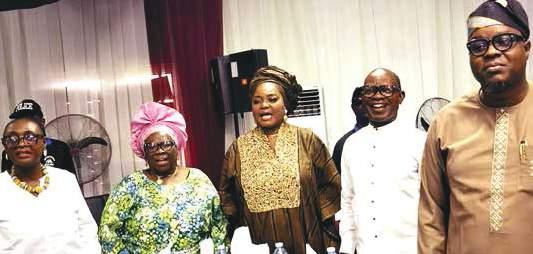
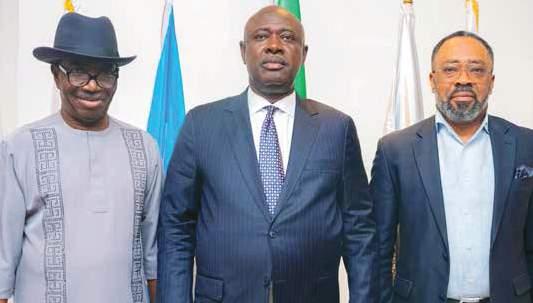
Doris Chinedu-Okoro is the founder and CEO of the Evergreen Group of Schools, a network of educational institutions based in Enugu State. In this interview with Funmi Ogundare , the convener of the South-East Education Conference, explained how effective and transformational leadership can drive innovation, equity and lasting change in the education system. Excerpts:
What prompted the creation of the recent Southeast Educators’ Conference, and what has been its impact so far?
The South-East Educators’ Conference (SEEC) was born out of a clear and urgent need to bridge the gap between innovation and implementation in education across South-Eastern Nigeria. We saw that while many educators and school leaders were passionate and capable, they lacked access to global best practices, policy engagement platforms, and collaborative learning opportunities. SEEC was designed as a movement to empower educators, foster policy dialogue, and inspire transformation in classrooms and communities. Since its inception, the impact has been profound. The conference has ignited a wave of renewed commitment among educators, inspired institutional improvements, and created a vibrant network of education stakeholders pushing the boundaries of what is possible in education in the South-East. Feedback from participants consistently shows that SEEC has become a hub of hope and actionable insight.
What inspired the theme ‘Advancing Education: Innovation, Leadership and Transformation’ for SEEC 2025?
The theme was inspired by the urgent need to reposition education in the southeast, and indeed across Africa, to meet the realities of the 21st century. We are witnessing a global shift in how knowledge is accessed, delivered, and applied. To stay relevant and effective, our educators must embrace innovation, cultivate strong leadership, and be willing to drive transformational change. This theme captures the essence of our collective responsibility to push beyond outdated systems and reimagine education for future generations.
What is the unique feature of this year’s conference?
SEEC 2025 is groundbreaking in both scope
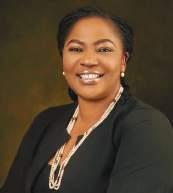
and scale. For the first time, we have intentionally created a multi-stakeholder platform that brings together educators, policymakers, school leaders, and innovators from within and outside the South-East. We also hosted more interactive, skills-based sessions, moving beyond inspiration to action. The calibre of speakers, the diversity of topics, and the actionable tools being offered were designed to leave every attendee equipped, not just inspired. SEEC 2025 isn’t just a conference, it’s a movement.
How did you select the speakers and facilitators for this year’s event?
Our speaker selection process was deliberate and values-driven. We sought out individuals who not only have a proven track record of excellence in education, leadership, or innovation but who also embody the values of
collaboration, integrity, and real-world impact. We wanted facilitators who could speak from experience, practitioners, not just theorists. Many of our speakers have pioneered groundbreaking educational models or led transformative initiatives, making them ideal voices to shape the SEEC 2025 conversation.
What specific outcomes did you hope to achieve through SEEC 2025?
Our goal is threefold: First, to ignite a new level of professional awareness and aspiration among educators. We call it ‘Realising your worth’. Second, to catalyse partnerships that can drive innovation and policy change within our region. And third, to equip attendees with practical tools and strategies they can implement immediately within their schools and communities. We want every participant to leave with a renewed sense of purpose and a clear path toward transformation. We are confident these were all achieved at the conference.
What role do you envision SEEC playing to shape the future of education in Africa?
SEEC is designed to be more than an annual gathering; we envision it as a catalyst for systemic change. By fostering collaboration across borders and sectors, SEEC can help shape a unified, Africa-led agenda for education, one that reflects our unique challenges, leverages our untapped potential, and drives sustainable progress. We believe SEEC can become a continental benchmark for educational development, influencing not just practice, but policy.
What do you think are the most pressing challenges facing education in Nigeria today?
Several challenges come to mind, but the most pressing include; inequitable access to quality education, especially for children in underserved communities, poor teacher preparation and professional development, which directly affects classroom outcomes, outdated curricula that do not align with current realities or future
needs, insufficient infrastructure and funding, and finally, the disconnect between education policy and implementation. These are deeply rooted challenges that require innovative and courageous leadership to overcome.
How do you think leadership can play a transformative role in the education sector?
Leadership is everything. When we have visionary leaders in classrooms, in school management, and at policy-making levels, transformation becomes inevitable. Effective leadership fosters innovation, accountability, and excellence. It sets the tone for values, inspires teachers and students alike, and creates an ecosystem where learning thrives. More importantly, transformational leadership prioritises equity and impact over politics and bureaucracy. If we fix leadership, we can fix education.
How can the private and public sectors better collaborate to improve education in the South-East?
True transformation in education requires a synergy between the private and public sectors. First, collaboration must begin with a shared vision, a collective agreement that every child deserves quality education, regardless of where they are or what school they attend. The government can create frameworks that allow private schools to access capacity-building programmes, infrastructural support, and public grants, while private schools can offer their expertise in innovation, pedagogy, and community engagement. Regular stakeholder meetings, public-private task forces, and policy co-creation initiatives will go a long way in ensuring that policies are not just made for schools, but with them. Together, we can build a system that is not only equitable but also sustainable and forward-thinking.
NOTE: Interested readers should continue in the online edition on www.thisdaylive.com
Rod Smith is the Group Managing Director of International Education at Cambridge University Press and Assessment. He explained to Funmi Ogundare the importance of embedding life skills directly into the education curriculum to help young people continue to develop resilience, adaptability and initiative, as well as how schools can enrich learning by partnering with local entrepreneurs to connect learning to the real world and build valuable links between them and their communities
Why do you think skill-building and entrepreneurship are becoming increasingly important in Nigeria’s education system?
Today, the world seems to be changing more rapidly than we’ve seen before, whether due to advances in technology, climate change, or global financial volatility and this can create uncertainty about the future. So it’s perhaps more important than ever to prepare young people to be adaptable and ready for the world. Entrepreneurship has long-since been a part of higher education in Nigeria and it’s great to see the NERDC approving tools for learning entrepreneurship in primary and secondary schools. The aim is to equip students with the right skills and knowledge to compete on the international stage and this fully aligns with Cambridge’s approach to education. Through our Cambridge Pathway, we want to ensure that our students are ready for the world. We do this by helping students develop not only strong subject knowledge but also a broad set of skills in areas such as communication, creativity, critical thinking, collaboration, and problem-solving. These are key to an entrepreneurial mindset, helping students turn ideas into action, navigate challenges, and build sustainable ventures. Another strength of a Cambridge
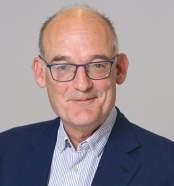
Smith
education is our Global Perspectives curriculum. From primary school onwards, students explore local and global issues, work together to solve problems, and reflect on their experiences. These early opportunities help them develop their initiative, creativity, and leadership. And no good education system today should overlook climate change.
Preparing young people with the ability to mitigate and adapt to the effects of climate change is a key entrepreneurial tool for the future with huge societal benefit locally and globally. This is why, at Cambridge, we are integrating climate change education across all our subjects.
What are the key benefits of integrating vocational training into the school curriculum?
A vocational element in the curriculum supports a more holistic approach to education. At Cambridge, we believe students should have opportunities to develop both academic and practical strengths. That’s why our curriculum is broad, balanced, and flexible; designed to be adapted to individual learner needs and school contexts. We offer a range of vocationally oriented subjects, such as Agriculture, Design and Technology, Food and Nutrition, Travel and Tourism, and Media Studies, as well as professionally focused subjects like Business, IT and Accounting. Vocational training provides hands-on experiences that many students enjoy. But there are other ways to promote practical learning too, such as project-based work, science experiments, and community engagement. These activities encourage students to apply what they learn to real-world scenarios and develop key life skills along
the way, and we know that most successful entrepreneurs are also highly educated. Many of our students go on to study a Business degree at university. Take the example of Mmesoma Okonkwo, a remarkable Nigerian student from Chrisland High School, Victoria Garden City, who won our ‘Top in the World’, Outstanding Cambridge Learner award in 2022 for Cambridge IGCSE English as a second language. Our Cambridge education helped Mmesoma achieve A1 in all 9 subjects in the WAEC, and she wants to pursue a degree in business studies with the dream of eventually running her own multinational business.
Do you see any challenge in sustaining government-initiated youth empowerment programmes?
One common challenge worldwide is that governments often have to shift focus due to budget constraints or a changing environment. That’s why it’s so important to embed life skills directly into the education curriculum. This helps ensure young people continue to develop resilience, adaptability, and initiative, even when individual programmes change.
NOTE: Interested readers should continue in the online edition on www.thisdaylive.com
Oluchi Chibuzor
The Executive Chairman of the Federal Inland Revenue Service (FIRS), Dr. Zacch Adedeji and the Ambassador of the Kingdom of the Netherlands to Nigeria, Bengt van Loosdrecht have commenced the process of the renegotiation of the Double Taxation Agreement between Nigeria and the Netherlands.
The event took place at the Revenue House in Abuja and marked the beginning of a new phase in Nigeria’s international tax relations.
Following the signing of the Tax Reform Bill into law by President Bola Ahmed Tinubu (GCFR) on June 26, 2025, interest in Nigeria’s new tax structure has already started to grow. In less than a week, both local and international stakeholders have begun to respond. Among them is the Kingdom of the Netherlands, one of Nigeria’s long-standing trade and investment partners, which is now the first foreign government to begin formal talks with Nigeria to renegotiate
its existing tax agreement. The aim is to bring the agreement in line with the new reforms and remove outdated terms, especially those relating to double taxation which no longer reflect the current realities.
Zacch welcomed the delegation on behalf of the president, government, and people of the Federal Republic of Nigeria. He described the visit as timely, especially considering recent changes in both domestic and global tax systems.
He said; “Recent developments in the domestic and global tax landscape have made the review of the existing agreement unavoidable. Particularly the tax reforms being carried out by our government, global measures against Base Erosion and Profit Shifting (BEPS), and other evolving international tax standards will render extant agreement out-of-date.”
He further emphasised that the discussions align with the policy direction of the current administration and reflect Nigeria’s commitment to a trans-
parent and fair process; “This renegotiation meets with the policy objectives of the ongoing fiscal and tax reforms initiated by the administration of President Bola Ahmed Tinubu. We are committed to broadening the domestic tax base, strengthening tax administration, and ensuring that our tax system supports inclusive economic growth.”
In his remark, the Ambassador of the Kingdom of the Netherlands to Nigeria, His Excellency Bengt van Loosdrecht, expressed appreciation for the warm welcome and highlighted the spirit of cooperation guiding the negotiations.
He noted; “The fact that we meet here today is an indication of the goodwill and the good faith in which we want to meet with each other. And I can assure you that my colleagues from the Netherlands will act in good faith. That is always an important basis for good negotiations.”
Reflecting on the nature of treaty talks, he expressed optimism about the process and the teams involved.
Shareholders of ASO Savings & Loans Plc have thrown their weights behind ongoing N120 billion recapitalisation of the bank.
Shareholders, who spoke after the annual general meeting (AGM) of the bank, said the steady progress being made under the current board and management has reinforced confidence in the outlook of the bank.
They noted that the holding of the AGM, the first in more than 10 years, signalled the return of the bank to effective compliance and operational excellence.
President, Association for the Advancement of Rights of Nigerian Shareholders (AARNS), Dr Faruk Umar, who spoke on behalf of the shareholders, said the bank has made commendable progress under the current leadership.
“We fully support the bank’s ongoing N120 billion recapitalisation programme and the strategic plan for integration with Union Homes Savings & Loans Plc, which we believe will enhance capacity, unlock new value, and strengthen ASO’s role in Nigeria’s mortgage finance sector. Shareholders assured that they would continue to support the strategic initiatives by the board and management.
The 2025 edition of the African Workforce Summit (AWS) was recently held in Lagos with a call to address Nigeria’s unemployment crisis through provision of practical interventions, such as skill acquisition and various forms of investment. Over two days, the event played host to a diverse audience of early-career professionals, entrepreneurs, employers, and development stakeholders.
The summit, designed to equip young professionals with actionable tools and strategies, featured a range of hands-on activities such as CV revamp stations, live interview simulations, LinkedIn profile consultations, professional headshots, and personalised career guidance sessions.
One of the standout features was a pitch competition, where emerging entrepreneurs presented
their business ideas for a chance to win a $1,000 seed grant.
Speaking at the event, the Convener of AWS, Joel Moses Babatunde, emphasised the summit’s focus on workforce development. “Not everyone will become an entrepreneur, and that is perfectly fine,” he stated. “Some will build their futures through employment, and it is our responsibility to ensure they have the skills, tools, and leadership mindset to succeed.”
The summit also hosted a series of panel discussions and masterclasses addressing key themes such as workplace leadership, innovation, corporate culture, mental wellness, and strategic career development.
Notably, a workshop led by performance coach Olakunle Soji-Oke explored the habits and mindset required for high-impact professional growth,
while HR strategist Emmanuel Faith offered expert guidance on salary negotiations.
Sycamore Group served as the summit’s headline sponsor. Its Cofounder, Onyinye Okonji, reiterated the company’s commitment to youth empowerment.
“We believe platforms like AWS are vital to cultivating a more resilient, skilled, and employable generation,” she said. “Solving the unemployment challenge requires investment in those building solutions.”
Among the most engaging sessions was a multigenerational dialogue on workplace dynamics, featuring Gen Z and Millennial professionals sharing perspectives.
Another highlight was a panel on startup resilience in Africa, moderated by Kayode Okikiolu, with insights from Onyinye Okonji, Ngozi Nwabueze, and Akpor Ikogho.
Grooming People for Better Livelihood Centre has rewarded 1,346 of its members with business support items during the 14th edition of its annual Grooming Splash event held in Lagos.
Speaking at the event in Lagos, the Chief Executive Officer, Grooming People for Better Livelihood Centre, Dr. Godwin Nwabunka said the initiative reflects the Centre’s ongoing commitment to rewarding hard work and supporting small businesses.
According to him, “Grooming Splash is part of the ways we support women; we also have scholarship scheme for the children of these women in secondary schools, and grants for undergraduates as well as post graduate students.”
“Women drawn from Lagos, Oyo, Ogun, Edo, Abia and Abuja received various tools through a computer-generated raffle. The items included 82 deep freezers, 58 5KVA generators, 58 big double-door refrigerators, 82 small double-door refrigerators, 106 3KVA generators, 480
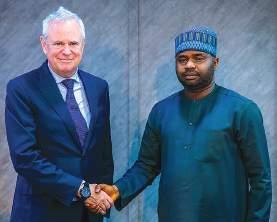
coolers with 150L, and another 480 coolers with 110L. 58 winners were selected from each of our 24 zones across 32 states and the Federal Capital Territory,” Nwabunka said.
On his side, the Executive Director of Programmes, Alexander Enyinnah said the Centre increased the number of prizes this year to reflect the scale of its impact and to reward client commitment.
“Even in challenging economic times, we believe our members deserve to be appreciated,” he said.
Kayode Tokede
The Nigerian stock market yesterday closed trading session on a positive note as gains in Guaranty Trust Holding Company Plc (GTCO) and 57 other stocks pushed the market up by N226.25 billion.
As GTCO gained 1.7per cent to close at N85.95 per share, the Nigerian Exchange Limited All Share Index (NGX ASI) gained by 358.60 basis points or 0.30
per cent to close at 121,653.93 basis points from 121,295.33 basis points it opened for trading.
Also, market capitalisation gained N226 billion to close at N76.758 trillion from N76.532 trillion it closed for trading the previous day.
Market breadth remained robust, with 58 gainers significantly outnumbering 21 laggards, indicating widespread buying interest across sectors.
C&I Leasing, Champion Breweries, Omatek Ventures, and Nigerian Exchange recorded the highest price gain of 10 per cent each to close at N6.60, N14.96, N1.10 and N56.10 respectively, per share.
Neimeth International Pharmaceuticals followed with a gain of 9.95 per cent to close at N9.50, while FTN Cocoa processors, AXA Mansard Insurance and Meyer up by 9.94 per cent each to close at N5.64, N11.06 and
N17.70 respectively, per share.
On the other hand, PZ Cussons Nigeria led the losers’ chart by 10 per cent to close at N26.10, per share.
Vitafoam Nigeria followed with a decline of 9.62 per cent to close at N21.60, while Nigerian Exchange Group declined by 9.17 per cent to close at N27.25, per share.
Ikeja Hotels depreciated by 7.41 per cent to close at N11.25, while Eterna declined by 5.26
per cent to close at N27.00, per share.
Also, the total volume traded rose 22.3 per cent to 1.008 billion units, valued at N19.484 billion, and exchanged in 24,770 deals. Transactions in the shares of Access Holdings topped the activity chart with 124.252 million shares valued at N2.739 billion. Japaul Gold & Venture followed with 123.080 million shares worth N340.917 million, while Mutual Benefits
On market outlook, Afrinvest Limited said, “we anticipate the bullish trend to be sustained in the next trading session as investors continue to hunt for bargains.”
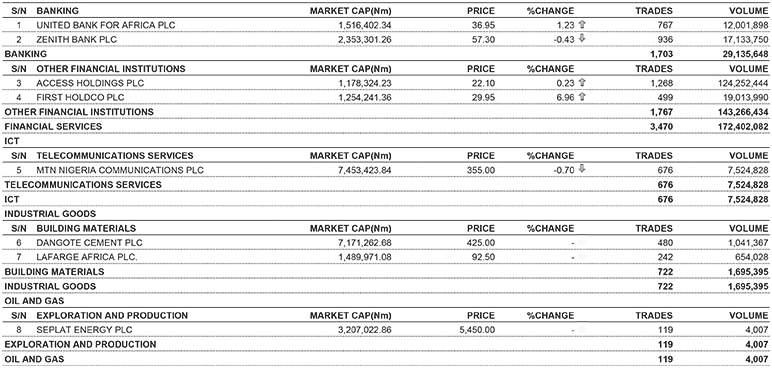
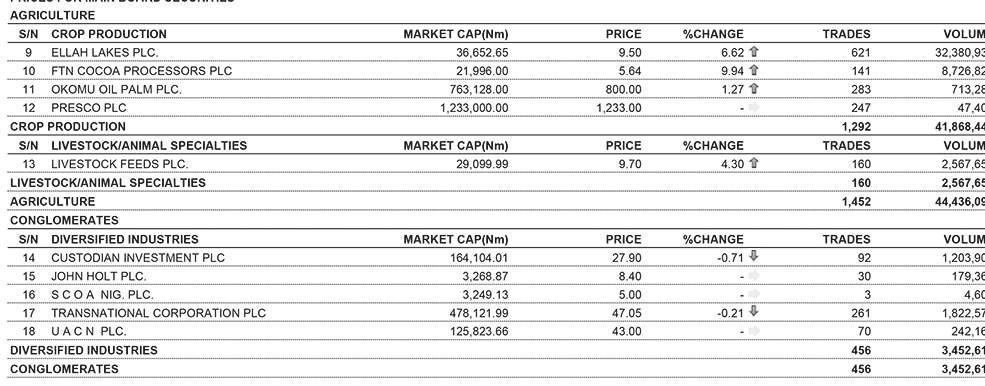

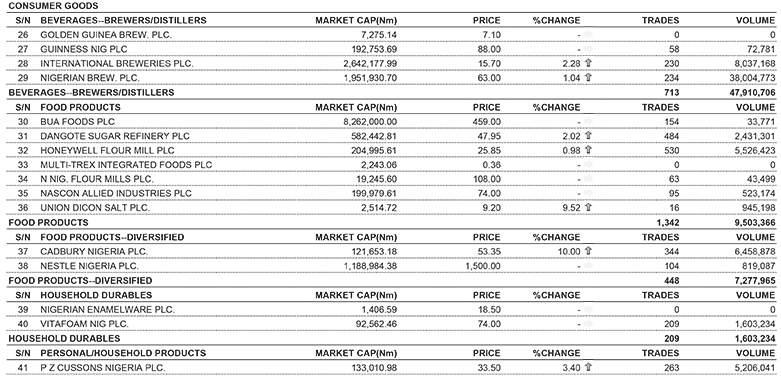

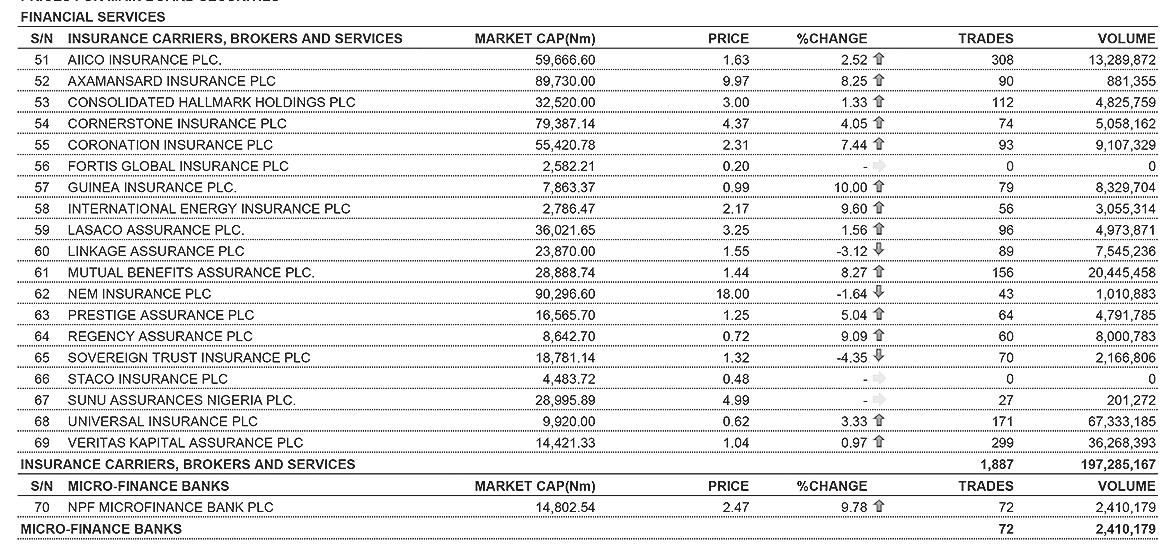

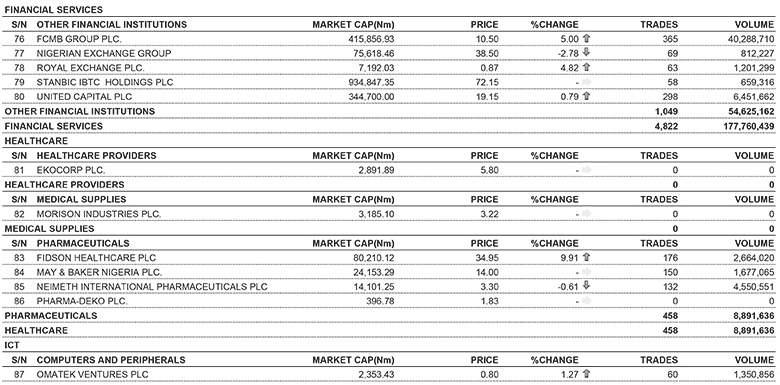
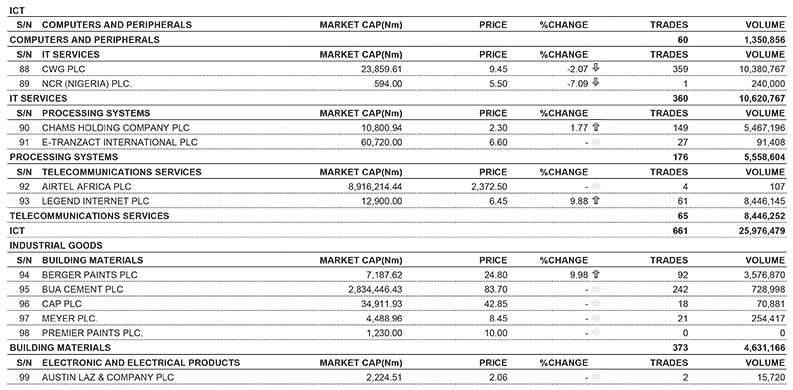

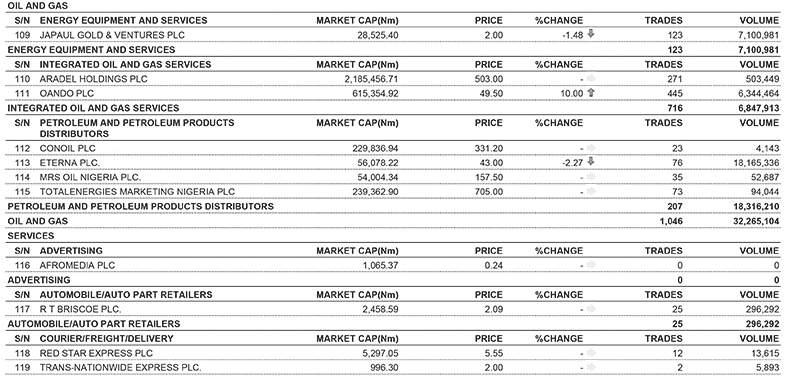

A Mutual fund (Unit Trust) is an investment vehicle managed by a SEC (Securities and Exchange Commission) registered Fund Manager. Investors with similar objectives buy units of the Fund so that the Fund Manager can buy securities that willl generate their desired return.
An ETF (Exchange Traded Fund) is a type of fund which owns the assets (shares of stock, bonds, oil futures, gold bars, foreign currency, etc.) and divides ownership of those assets into shares. Investors can buy these ‘shares’ on the
floor of the Nigerian Stock Exchange.
A REIT (Real Estate Investment Trust) is an investment vehicle that allows both small and large investors to part-own real estate ventures (eg. Offices, Houses, Hospitals) in proportion to their investments. The assets are divided into shares that are traded on the Nigerian Stock Exchange.
GUIDE TO DATA:
Date: All fund prices are quoted in Naira as at 07 Jujy-2025, unless otherwise stated.
Musa ilallah
In the early hours of Wednesday June 18, 2025, a band of terrorists attacked the Naval Base Lake Chad in Baga, Borno State, targeting military equipment at the base, including swamp buggies recently made available by the Governor of Borno State.
A terrible mistake. Naval personnel at the base effectively repelled the attack, neutralising several of the attackers and leaving many others injured.
The Chief of Naval Staff, Vice Admiral Emmanuel Ikechukwu Ogalla, visited the base days after the aborted attack to express gratitude to the officers and men of the base, and boost morale.
If the terrorists thought this attack might dampen military morale, it ended up achieving the opposite; the Nigerian Navy is more than determined to redouble its efforts towards securing the Lake Chad area, with the deployment of more personnel and equipment to bolster the base. In addition, the CNS directed that the swamp buggies, which the terrorists failed to destroy, be put into immediate use to commence clearing of the waterways.
From Lake Chad to Rivers Niger and Benue, to the Atlantic Ocean and Gulf of Guinea, the Nigerian Navy is busy at work, fulfilling its constitutional mandate and protecting Nigeria, West Africa, and Africa. In recent months the Navy has taken delivery of three new ships, NNS SHERE, NNS FARO and NNS IKOGOSI, and three new Agusta Westland 109 Trekker Helicopters, to fortify operational capacity and impact.
Under Vice Admiral Ogalla’s watch, the Navy has recently created a Special Operations Command, that will be based in Makurdi, on the banks of River Benue. Also newly created is the Nigerian Navy Marine Corps, patterned after the famous US Marine Corps. In Enugu, a new Special Operations Composite Base is taking off, designated as the Nigerian Navy Ship (NNS) MADUEKE.
It is noteworthy that no piracy incident has taken place in Nigeria’s waters since the 3rd of March 2022, when the country formally exited the International Maritime Bureau’s (IMB) list of piracy-prone countries.
Under Vice Admiral Ogalla, the Nigerian Navy’s flagship operation, Operation Delta Sanity, launched in January 2024, is decisively confronting and curbing crude oil theft. It was rejigged in December 2024, integrating aerial surveillance and improved intelligence-gathering to deliver even greater impact.

Operation Delta Sanity has turned out tremendous results in the last 18 months: More than 800 illegal refining sites, 2400 dugout pits and 5,400 storage facilities discovered and deactivated; 242 suspects arrested, alongside 76 vessels, and several other pieces of equipment and machines. Indeed, the Nigerian Navy’s contributions to Nigeria’s rising oil and gas production cannot be downplayed. Key Niger delta pipelines like the Trans Niger, Trans Escravos and Trans Forcados have seen substantial increases in uptime since the third quarter of 2024. In fact, just a week ago, the Nigerian National Petroleum Company (NNPC) Limited disclosed that Nigeria attained 100 per cent crude oil pipeline availability throughout the month of June—a feat that has not happened in a very long time.
In all, the contribution of the Nigerian Navy to the Nigerian economy in terms of helping preserve and grow oil revenues, runs into hundreds of billions of Naira. These economic feats are not just in the
area of enabling oil and gas production. The new National Hydrographic Agency, which emerged from the old Nigerian Navy Hydrographic Office, is making waves in its area of expertise: developing state-of-the-art charts of Nigeria’s waterways to enable and advance trade, logistics, and investment.
Just a week ago, the Agency officially presented to the Cross River Government a hydrographic, geophysical and geotechnical report, as well as three new navigational charts, for the proposed Bakassi Deep Seaport Project; completed after months of painstaking work led by the Navy.
Understanding that food security is a vital component of national security, and in line with its commitment to the implementation of President Bola Tinubu’s directive on military participation in agriculture, the Nigerian Navy has just established the Admiralty Integrated Farm Limited (ADIFAL).
This agricultural endeavour by the Nigerian Navy will leverage cutting-edge solutions, including Artificial Intelligence (AI) and the Internet of Things
(IoT), to provide real-time insights that will advance modern agricultural practices and enable ADIFAL attain optimal levels of agricultural productivity.
Under Vice Admiral Ogalla’s watch, the Nigerian Navy has also been doggedly expanding its national and continental footprints. Three highlights are worth mentioning in this regard. First is that the Nigerian Navy is now ranked the third largest in Africa, after Egypt and Algeria. Second is that the Navy is playing a leading role in the operationalisation of a Combined Maritime Task Force—to complement this, Nigeria has affirmed readiness to host the Force headquarters in Lagos. Third is the provision of SeaLift Capability to the African Union. What this means is that the Nigerian Navy will make available strategic transport services to support African Union peace support operations, natural disaster support, humanitarian actions, and personnel movement; this was formalised with an agreement signing ceremony at the African Union Summit in Addis Ababa in February 2025.
The new International Maritime Institute of Nigeria (IMION), established by Vice Admiral Ogalla a year ago, has also taken off, cementing a strong legacy of intellectual and thought leadership by the Service.
In addition to the Navy’s ambitious infrastructure programme—under which dozens of construction and rehabilitation projects are ongoing at Naval bases nationwide—Vice Admiral Ogalla has introduced the commendable concept of ‘CNS Special Intervention Quick Impact Projects’, aimed at serving the Navy’s host communities across the country, and creating an outstanding model of social responsibility.
At the end of May, the Nigerian Navy celebrated its 69th anniversary, with a series of activities that included ‘Open Days’ during which Nigerians had an opportunity to visit, tour and sail on some Navy Ships, including the iconic Landing Ship Tank (LST), NNS KADA. The depth of excitement from those who visited has been captured in videos and photos now permanently memorialized on the internet.
In less than a year from now, the Nigerian Navy will celebrate its 70th anniversary. As that milestone approaches, there is no doubt that the Service is in an excellent place, resolute, motivated, respected and forward-looking; a Navy whose impact is felt across and beyond Nigeria, and of whom the country and indeed all of Africa should be most proud.
•Ilallah, a public affairs analyst, writes from Abuja
Wale igbintade
Legal practitioner and entrepreneur, Ms. Adaobi Alagwu, has said she was tricked into a purported customary marriage by Dr. Tunde Ayeni, based on what she described as lies about his (Ayeni‘s) marital status.
She, therefore, characterised the former Skye Bank Chairman’s recent interview with THISDAY as false, malicious, and defamatory and a distraction from the central issues.
Reacting to the publication titled: “I Regret Ever Meeting Adaobi Alagwu”, Alagwu, through her lawyers, reiterated that she was tricked into a purported customary marriage by Ayeni, stating that the relationship began on the understanding that he (Ayeni) was married under customary law and therefore could legally take

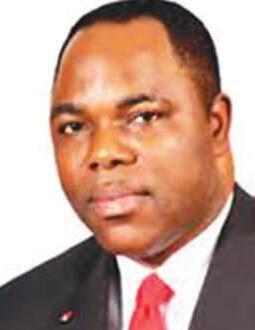
abroad, which was confirmed with 99.9999 per cent certainty that he is the biological father of her child.
“Without doubt, our client and Dr. Tunde Ayeni went out as consenting adults premised primarily on the misrepresentation by Dr. Ayeni of his true marital status. He had represented to our client that he was married under customary law and therefore could also marry her without legal fetters,” part of the letter stated.
However, the letter noted that Ayeni later turned hostile towards Alagwu and her family, launching a campaign of public antagonism without provocation.
“Our unsuspecting client was therefore later tricked into a purported customary marriage with Dr. Ayeni. This relationship begot Baby Ayeni who was named by Dr. Ayeni with all her
given names. Dr. Ayeni is also recorded as the baby’s father in her international passport and official birth records.
“In the course of time, Dr. Ayeni personally sponsored a DNA paternity test abroad and the report was 99.9999 per cent certainty.
Further, Dr. Ayeni was later to develop intense public antagonism towards our client and her family, often spewing verbiage, without reaction in kind by our client,” the letter to THISDAY said. Alagwu, in the letter by her lawyers, maintained that the allegation that she tampered with the DNA process by hacking into Ayeni’s wife’s email was absurd.
“The interview was clearly designed to ridicule, defame and destroy the reputation of our client,” the letter stated.
Sunday Aborisade in Abuja
As part of efforts to deepen digital connectivity and enhance telecommunications infrastructure across Nigeria, the Senate yesterday approved a total budget of N287 billion for the Nigerian Communications Commission (NCC) and the Universal Service Provision Fund (USPF) for the 2025 fiscal year.
The approval followed the adoption of a report presented by the Chairman of the Senate Committee on Communications, Senator Ikra Aliyu Bilbis, during plenary.
According to the approved figures, N272.433 billion was allocated to the NCC, while N15 billion was earmarked for the USPF. USPF is a special intervention fund managed by the Commission to extend communication services to underserved and unserved areas of the country.
A breakdown of the USPF budget showed that N10.9 billion was designated for projects and programmes that promote digital inclusion, while N4.04 billion would cover recurrent expenses of the Fund’s secretariat.
The sum of N53.96 million was, however, allocated for capital expenditure.
“The Committee, having reviewed the budget documents and interacted with the Fund’s management, recommends that the Senate approve the sum of fifteen billion naira (N15,000,000,000) only for the operations of the USPF in the 2025 fiscal year,” Senator Bilbis told lawmakers during the presentation of the report.
Earlier during the budget defence session, Director of Financial Services at the NCC, Mr. Yakubu Gontor,
ADC: T IN ubu’ S fAI lure b e HIND u S’ S N ub; APC: ADC
Chuks Okocha, Olawale Ajimotokan and Adedayo Akinwale in Abuja
African Democratic Congress (ADC) has said Nigeria was not invited to White House trade talks because of President Bola Tinubu’s economic failure, stressing that under the All Progressives Congress (APC) leadership, the country has gone from leading the continent to being left out entirely.
ADC made the assertion in a statement by its Interim National Publicity Secretary, Mallam Bolaji Abdullahi.
That was as the party’s Interim National Chairman, Senator David Mark, assured that under his leadership, ADC would be “absolutely transparent”.
Similarly, former Director General of All Progressives Congress Governors’ Forum, and one of the arrowheads of the ADC coalition, Mallam Salihu Lukman, said the structure of the party would not be handed over to any of its members contesting the presidential ticket in 2027.
But the federal government dismissed the individuals behind the coalition against the re-election of Tinubu as elements averse to the sustained focus on the economic progress the country was recording.
APC also said there was no reason for Tinubu or the ruling party to expend valuable time and energy trying to sow confusion within ADC that was already mortally wounded by confusion delivered by its invaders.
The United States government planned to host the presidents of Gabon, Guinea-Bissau, Liberia, Mauritania, and Senegal for high-level commercial talks at the White House on Wednesday, without extending the invitation to Nigeria.
In a statement by ADC’s Interim National Publicity Secretary, the party emphasised that Nigeria’s exclusion from such high-level economic dialogue was a damning international indictment of the Tinubu administration and its sustained economic mismanagement, weak and incoherent diplomacy, and inability to project Nigeria’s strategic importance on the global stage.
According to ADC, “For years, African thought leaders have argued that it was about time that the Western world started to engage with African
tional Chairman Umar Damagum, the party’s North-central Vice Chairman, Abdulrahman Mohammed, outlined the consequences of party disloyalty.
“Any misbehaviour, the party will no longer tolerate it. If anyone feels they are not ready for this task, they should step aside immediately so that we can replace them without delay,” he stated.
Damagum added that any member found engaging in double standards or collaborating with other parties would face disciplinary action.
“We now have functional disciplinary committees at the state and local government levels. If anyone is caught campaigning or organising with other political parties, it will be treated as antiparty activity and they will be
countries as trade partners rather than as hapless recipients of aid. Finally, an American President has emerged who is cutting aid and promoting trade. But Nigeria is not invited to the table.
“According to the Americans, the three-day meeting, which starts on Wednesday, is convened to explore commercial opportunities that could benefit both American companies and African partners. They said they have invited countries, who have demonstrated ‘the ability, and willingness, to help itself.
“What this means in plain language is that under President Tinubu, Nigeria is no longer taken seriously. Although we are Africa’s largest economy, with the largest consumer market and Africa’s most influential diaspora, the United States chose to bypass us in favour of nations whose combined GDP is only a fraction of ours.
“With this snub, what the Americans are telling us is that size means nothing without leadership and a demonstrable commitment to efficiency, to transparency and to accountability.”
The statement added, “Only a few years ago, it would have been unthinkable that such meeting would hold without Nigeria. This only shows how low this administration has brought our country in the estimation of the world.
“To add insult onto injury, Nigeria is now being threatened by President Trump with a 10 per cent tariff because of our association with BRICS, which started in January 2025. The ADC is not opposed to BRICS, but we are opposed to Nigeria punching below its weight by playing in the small league.
“Were Nigeria able to provide the leadership that other African countries expect of us, and which we have competently provided in recent past, we would have been invited to that meeting on Wednesday in Washington, and Nigeria would have used the opportunity to push the Africa Union (AU) position on global trade, especially given that our daughter, Ngozi Okonjo-Iweala, sits at the head of the World Trade Organisation (WTO)
size and significance under President Tinubu’s leadership.
“Under this APC administration, once the acknowledged leader of the continent, Nigeria has become an afterthought, reduced to playing with back-water countries like St. Lucia, a country with less than 1% of our GDP and a population less than that of a rural local government in Nigeria.
“Yet, our president was able to spend an entire week in that country, for reasons that the government is still struggling to explain. The truth is that APC has not only stalled our economic progress, it has stripped us of the opportunity to sit at the table where real decisions, and real investments that could create jobs boost growth and improve our economy, are being made.
“This is what happens when the government at the centre prioritises politics over performance, and propaganda over progress. As a nation that has led before, and can lead again, we must reject the future the APC seeks to impose on us—one where we are ignored, sidelined, and treated as insignificant. Nigerians must demand better, because Nigeria is too big, too important, and too proud to be left out.”
ADC also accused APC of deceiving Nigerians by using the names of non-ADC members to file a suit against the party and its interim leadership.
The party alleged that the names, which APC used to file their suit were neither in ADC physically nor digital registers in Kogi or Nasarawa State.
ADC state, “It smacks of desperation that a party elected in charge of the lives of no fewer than 200 million people can engage in shopping for the names of its citizens in pursuit of Machiavellian politics.”
National Legal Support Group for ADC expressed its readiness to represent the party in the courts over the matter filed against it and its interim officers.
Making the revelation in Abuja yesterday, leader of the group, Barrister Mohammed Sheriff, said no fewer than 97 Lawyers had indicated their
“But under this APC administration, Nigeria is no longer respected even as a regional leader in ECOWAS, as the regional body has shrunk in relatively narrow band of N1,520/$ to N1,565/$ on the official window over the past month, while on the parallel market it hovered above N1,600 for much of June.
disciplined,” he warned. On preparations for the elections, Damagum assured the people that PDP would protect its votes.
“Nobody will tamper with our election. By God’s grace, we will be at our polling units, ensure the votes are counted, and make sure the rightful winners are announced,” he added.
Speaking at the event, also, FCT PDP Chairman, Ismaila Dogara, called for unity among party members, urging leaders to put past differences behind them and work together for victory.
Chair of PDP Reconciliation Committee in the FCT, Hassan Sokedebo, took a swipe at the ruling All Progressives Congress (APC), claiming their internal problems are greater than those of PDP.
who led the technical presentation, disclosed that of the NCC’s proposed N272.423 billion, N95.668 billion was for recurrent expenditure; N10.75 billion earmarked for capital projects, while N40.93 billion was reserved for special projects.
The motion for the adoption of the report was moved and unanimously approved by the Senate without objection.
The approved budgets are expected to bolster Nigeria’s drive toward universal access to broadband and digital services, especially in rural and remote communities.
preparedness to stand for ADC.
Mark: ADC Has No Preferred Presidential Candidate
Interim National Chairman of ADC, Senator David Mark, said under his leadership, the party would be “absolutely transparent”.
Reacting to speculations on the choice of its presidential candidate, Mark said, “The ADC has no preferred or favourite presidential aspirant but has set out to first put out a platform that would be attractive and acceptable to majority of Nigerians.
“We are doing this because we do not want this great ship called Nigeria to sink because if we do not rise up, and now, they will sink all of us.”
Mark stated this while addressing the stakeholders of the Kogi State chapter of ADC at a meeting in Abuja.
He stated that all the members of the party were “equal stakeholders. Equal joiners, equal owners”.
Mark stated, “I don’t own this party more than any of our members and I urge all members to prepare to show Nigerians that ADC is a different party. A different party that is ready to properly run democracy in our country. All Nigerians must come together and take ownership of the ADC.”
He urged members to put their differences aside and work as a team, adding, “We must bond together to build the party before we can talk of ambitions.”
The former senate president charged members of All Progressives Congress (APC) to stop attacking individuals but concentrate on their policy failures, which ADC had raised.
He said, “If they admitted that insecurity is bad and they promised Nigerians that they would improve on it but have made it worse, would Nigerians continue to support them?
The answer is No. Let us continue to work to rebuild our nation and bring out her best in the overall interest of the future generations.”
Lukman: Coalition Won’t Hand Party over to Atiku, Obi, Amaechi, Others
confidence, and curb the arbitrage that had distorted the foreign exchange landscape for years.
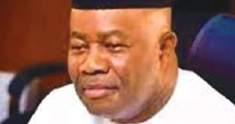
Former Director-General of APC Governors’ Forum, and one of the leaders of ADC, Mallam Salihu Lukman, revealed that the ADC structure would not be handed over to any member of the party contesting the presidential ticket in 2027.
Prominent among those believed to be aspiring for the presidential ticket of ADC are former Vice President Atiku Abubakar, former Governor Peter Obi, and former Governor Chibuike Ameachi.
Speaking on a television programme, Jigsaw, Tuesday, in Abuja, Lukman said the plan was to build the structures of the party in such a way that the party would be strong enough and could regulate the conduct of everybody, not just aspiring candidates, but even elected representatives when they win office and assume positions.
According to him, “The coalition didn’t go into this arrangement (ADC) with our eyes closed, desperate to have a political party. We took our time. We didn’t negotiate with just one individual, we negotiated with the whole leadership.
“What we are telling everybody in the coalition is that the structures of the party will not be handed over to aspiring candidates.
“We have to build the structures of the party in such a way that the party is strong enough and can regulate the conduct of everybody, not just aspiring candidates, but even elected representatives when they win office and assume positions.”
On how the coalition cleared all the legal crisis before the unveiling, he said, “I can tell you that we opened a negotiation with a wide range of parties. And we went through processes including conducting legal due diligence on the status of both the leadership and if there are any pending litigation that were there. And in the process, we were able to also check with INEC and get all the substantive issues.
“I can tell you, some of the issues being raised in the public about some of the litigation. There are issues which, even by INEC record, if you go there, you’ll find out that they have been
resolved long ago. At a point, we even had to sit down with all the members, in fact more than once, all the members of the National Working Committee of ADC.
“So I want to make it very clear and if you check with INEC, you’ll find out that even the Dumebi Kachukuhu, who came out to make noise, by the record, of INEC, based on the certified true copies of proceedings of organs, legitimate organs of the ADC, Dumebi Kachukwu and some others, I think about 15 of them, have been expelled from the party. I can’t remember exactly when. So, we didn’t go into this blindly.
“And we were very clear that we were in a very safe ground. And proceeding further, we are not supplanting the leadership of ADC. We have accepted to work with them as partners, they are stakeholders.
“And I’m sure in not too distant time from now, the interim leadership of the party led by Senator David Mark, and Aregbesola will release possible guidelines to guide the position at the state level, and how the whole reorganisation of the structures of the party will proceed.
“So, I want to make it very clear, we are not approaching this activity based on the conventional process of just going to hijack a structure and begin organise it in such a way we produce candidate and this led me to the critical point and I think we have to continue to talk to ourselves as members of the coalition we came this far largely because we have appealed to all our leaders to please suspend expression of their ambition until we are able to build structures.”
FG Blasts Coalition Backers for Bias over Alleged Stagnation of Reforms
The federal government dismissed the power blocs in support of the emerging coalition against the reelection of President Bola Tinubu in 2027 as elements with a predilection against the sustained focus on the economic progress the country was
However, since the beginning of July, the currency has appreciated, trading below the N1,600 threshold on the parallel market.
This, analysts noted, reflects a period of relative calm in the foreign exchange market, supported by improved forex liquidity and the gradual reactivation of naira debit cards for international transactions by several commercial banks.
President Bola Tinubu’s currency reforms have marked one of the most significant shifts in Nigeria’s economic policy in recent years. Upon taking office, Tinubu moved quickly to unify the country’s multiple exchange rates, effectively dismantling the long-standing system of parallel currency markets.
According to Bloomberg, the bold step was aimed at creating transparency, improve investor
In addition to unifying the exchange rate, the government allowed the naira to float more freely, letting market forces determine its value. This move, though initially leading to volatility and a sharp depreciation of the currency, was seen by many as a necessary correction to years of artificial support.
It also sent a strong signal to investors and international financial institutions that Nigeria was committed to economic reform.
To support the new policy direction, the Central Bank of Nigeria (CBN) began clearing forex backlogs, tightening monetary policy, and taking steps to stabilise inflation.
But after some initial volatility in the first half, the naira stabilised even as oil prices fell, a Bloomberg News report said yesterday.
Analysts from Deutsche Bank AG to Cardinal Stone expect the Nigerian currency to end the year
near N1,556 per dollar — its average exchange rate in the first six months of 2025 after it slumped 41 per cent in 2024. It traded around 1,530 on Tuesday, largely flat on a year-to-date basis, the Bloomberg report added.
The change in the naira’s fortunes could also be attributed to its undervaluation, higher non-oil exports and lower import demand, Chief Investment Officer at Emerging Markets Investment Management Ltd. in London, Ayo Salami said.
The currency is trading below its fair value based on purchasing power parity, he stressed.
A steady naira will offer relief to businesses after its steep losses in the prior two years caused by the central bank’s decision to allow it to trade more freely against the dollar, Bloomberg said.
The naira’s stability has also been helped by a weakening US dollar, which is down more than 10 per cent this year, and less dependency on imported refined products. Besides, Africa’s richest person,
Aliko Dangote, commissioned a 650,000 barrels-per-day refinery that turned Nigeria into a net exporter of the refined products. Foreignexchange reforms and investors’ scramble for investments outside the US have also benefited Nigerian assets, leading to increased dollar inflows.
A Bloomberg index for local bond performance is at a record high and has returned 19 per cent this year, its best first-half performance since December 2020. The gauge for emerging-market local debt has returned 12 per cent in the period. Stocks in the West African nation are up 18 per cent this year.
“The NGN has become more correlated with global risk conditions,” said the head of Africa strategy at Standard Chartered Plc, Samir Gadio stressed.
“Risk conditions have since improved materially; this has supported renewed portfolio flows into Nigeria debt even with oil prices currently below $70 per barrel,” Gadio explained.
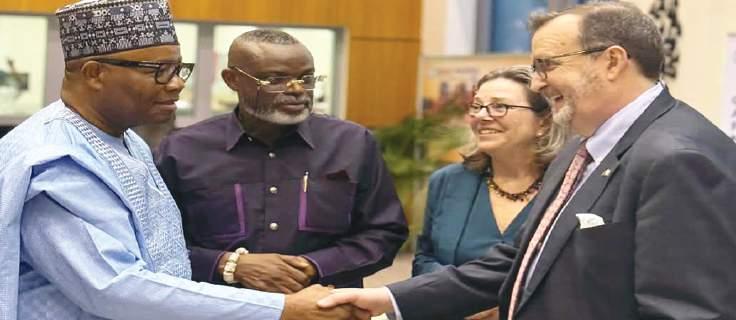
L-R: Senate President, Federal Republic of Nigeria, Dr. Godswill Akpabio; Foremost marketing communications entrepreneur and Chairman of Allianz Media and Marketing &
United States Embassy, Abuja,
and
Addeh in Abuja
Dangote Industries Limited (DIL) expects Africa’s biggest refinery to rely totally on Nigerian crude by the end of the year, a move that would replace hundreds of thousands of barrels a day of imported oil, Bloomberg reported yesterday.
The plant owned by Aliko Dangote, the continent’s richest person, received about half of its crude in June from local producers who will be able to sell more to the facility as their foreign supply obligations end, according to Vice President at DIL, Devakumar Edwin, who oversees the 650,000 bpd plant outside Lagos.
“We expect some of the long-term contracts will expire,” he said in an interview at the sprawling site. “Personally, and as a company, we expect that before the end of the year we can transition 100 per cent to local crude.”
Dangote sold the idea of the massive plant as a way for Nigeria, the top oil producer on the continent, to stop
sending barrels to Europe only to be refined and shipped back as costly imports — a process rife with corruption.
The gradual ramp up of the refinery has already made Nigeria a net exporter of petroleum products, with room to go before reaching capacity. Still, the effort required large quantities of overseas crude after domestic traders failed to
Adedayo Akinwale in Abuja
The Economic and Financial Crimes Commission (EFCC) has lamented that speculative earnings, unverified transactions, and poor oversight in the oil and gas industry have entrenched inefficiency and corruption in public finance.
Its Chairman, Ola Olukoyede, stated this yesterday in Abuja at the National Conference on Public Accounts and Fiscal Governance organised by the Senate and House of Representatives Public Accounts Committees (PACs).
meet demand.
OPEC-member Nigeria has seen a withdrawal of oil majors from onshore and shallow water fields that have been taken over by local companies with fewer resources.
Meanwhile, supply contracts with foreign companies, crude theft and attacks on pipelines in the Niger Delta have curbed production reducing the availability of oil at home.
Dangote was scheduled to take five cargoes from Nigeria’s state oil company in July, the same amount that it’s due to take up in August, according to a list of cargo allocations seen by Bloomberg News. Each shipment holds almost a million barrels of crude.
Meanwhile, Dangote has said that he intends to contribute to a Climate Fund that will target those vulnerable parts of the country which are susceptible to natural disaster.
In an open letter in which he praised President Bola Tinubu generously for his “ visionary leadership and farsightedness, Dangote lauded several initiatives of the Nigerian leader.
He also cited digital manipulation of government platforms such as the Government Integrated Financial Management Information System (GIFMIS) and the Integrated Payroll and Personnel Information System (IPPIS), which have become tools for payroll fraud in some Ministries, Departments and Agencies (MDAs).
Olukoyede noted: “Opaque financial reporting, especially in the oil and gas sector, where earnings remain speculative rather than factual, is one of the most disturbing vulnerabilities in our system. These weaknesses feed corruption and erode public trust.
“Despite years of reforms and
Olukoyede, who was represented by the Director of Public Affairs, Wilson Uwujaren, added that noncompliance with financial regulations, approval of spending beyond official limits, diversion of public funds to private accounts, and the padding of budgets to accommodate projects with no real developmental value continued to threaten Nigeria’s fiscal integrity.
development plans, the gap between policy intent and public impact remains wide. We must move from paper reforms to institutional enforcement.”
On asset recovery, Olukoyede revealed that the anti-graft agency has returned trillions of Naira in monetary assets to the national treasury, including what he described as “the largest real estate asset recovery in Nigeria’s history,” which was the 750 duplexes seized in Abuja.
He added that funds recovered from various corruption cases have been redirected into key national initiatives such as the Nigerian Education Loan Fund (NELFund) and the Consumer Credit Scheme (CREDICORP).
Olukoyede noted that the agency was working with the Federal
Michael Olugbode in Abuja
President Bola Tinubu has reite`rated Nigeria’s commitment to deepening bilateral relations with Vietnam, particularly in trade, investment, energy, mining, resource sustainability, infrastructure, and climate change action.
He stated this during a meeting with Vietnamese Prime Minister, Pham Minh Chinh, on the sidelines of the ongoing G20 Leaders’ Summit in Rio de Janeiro, Brazil. A statement by the Vietnamese
Ambassador to Nigeria, Mr. Bui Quoc Hung, disclosed the visit also included an invitation from President Luong Cuong for President Tinubu to soon make an official visit to Vietnam.
Tinubu emphasised the importance of Vietnam as a key partner for Nigeria in Southeast Asia, underscoring his eagerness to fortify the bonds between the two countries.
The president highlighted the significance of fostering economic, trade, and investment ties, given
the steady growth observed in their bilateral trade exchanges.
In his response, Prime Minister Chinh appreciated the warm welcome, while conveying Vietnam’s eagerness to strengthen bilateral collaboration and extended an invitation to President Tinubu to visit Vietnam officially.
Both leaders acknowledged the long-standing friendly relations between Nigeria and Vietnam which dates back to the establishment of diplomatic relations in 1976.
Ministry of Housing to convert seized properties into affordable housing for low-income Nigerians.
Despite these achievements, Olukoyede emphasised that the real work lies ahead. He called for the institutionalisation of real-time digital budget and project tracking, public access to expenditure data, and a strengthened whistleblowing system.
Since the Dangote facility opened, the company has bought crude from Brazil, Angola, Ghana and Equatorial Guinea, according to Edwin. Improved relations between the refinery, local oil traders and the government will result in a steady supply of Nigerian crude, he said.
That still requires a significant increase of local oil over the coming months. In June, the refinery sourced 53 per cent of its crude supply from domestic producers and 47 per cent from the US, according to data compiled by Bloomberg. The plant is currently processing 550,000 barrels of crude a day, according to Edwin.
“Our dear nation has also suffered significant losses in lives and property due to rising sea levels and incidents of flash flooding. In honour of your vision, the Aliko Dangote Foundation will soon be announcing plans of contributing to a Climate Fund that will target those vulnerable parts of our country which are susceptible to this natural disaster,” Dangote said in the open letter.
Michael Olugbode in Abuja
China has expressed its position on recent conviction of some Chinese nationals by Nigerian court over involvement in fraudulent practices, stating support for Nigeria’s efforts to combat telecommunications and online fraud.
China also expressed its support for Nigeria to strengthen law enforcement cooperation with the country, including joint operations targeting online gambling, scams, and other transnational crimes to foster a more peaceful and secure cyberspace.
In a statement on Tuesday by its embassy in Nigeria, China stated it is vehemently against any act of criminality by Chinese abroad, urging that while China remains committed to protecting its citizens’ interests abroad but would not condone any criminality from them.
The statement read: “The Chinese Embassy in Nigeria has recently noted that some Chinese nationals have been tried by Nigerian judicial authorities in connection with telecommunications and online fraud.
“The Embassy hereby states the following position regarding this matter: Over the past year, Nigeria’s law enforcement agencies stepped up efforts to combat telecommunications fraud and arrested a large number of suspects, including some Chinese nationals.
“Telecommunications and online fraud represent matters of common international concern, while containing such transnational criminal activities remains a shared challenge confronting governments worldwide.
“The Chinese government maintains an unwavering stance against
telecommunications and online fraud, and any form of cross-border illegal activities. This position is reinforced through stricter conduct regulations for citizens abroad and dedicated legislation efforts. The government mandates Chinese nationals overseas to strictly comply with local laws and regulations and abstain from illicit activities.
“China’s Anti-Telecommunications and Online Fraud Law, released in 2022, also demonstrates our zero-tolerance policy and resolute commitment to combating such crimes.
“Meanwhile, the Chinese government remains firmly committed to protecting its citizens’ interests abroad. Through diplomatic missions worldwide, it requests host governments to safeguard Chinese nationals’ legitimate rights and interests under local laws and regulations.”
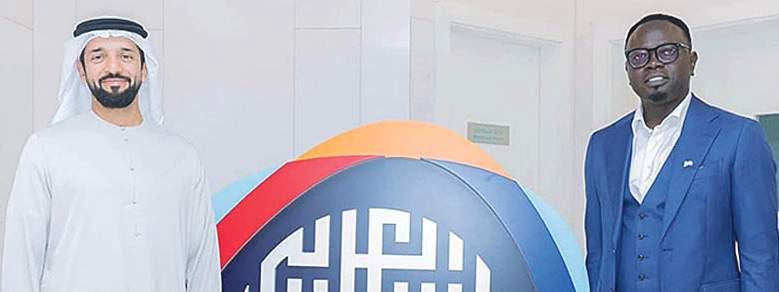
sTraTegic engageMenT in The UniTed
Minister of Youth, Hon. Ayodele Olawande, (R), alongside His Excellency Dr. Sultan AlNeyadi, Minister of State for Youth Affairs, UAE — strengthening bilateral ties for youth empowerment through education, digital innovation, entrepreneurship, and exchange opportunities, during a strategic engagement in the United Arab Emirates on Monday
The federal government on Tuesday said over 3.5 million passports has been issued in less than two years, adding that a massive N1 billion plus have been saved annually through reforms in the nation’s passport processing system.
The Minister of Interior, Hon. Olubunmi Tunji-Ojo, disclosed this on Tuesday in Abuja at the inauguration of the Ministry’s new Passport Front Office.
Tunji-Ojo said the reforms were implemented in line with President Bola Tinubu’s Renewed Hope Agenda to enhance efficiency, security, and service delivery.
The minister while stating the administration met a backlog of over 200,000 unprocessed passports and a debt of nearly ₦20 billion in the sector when it assumed office in 2023, disclosed the backlog and debt have since been cleared.
He said: “While 3,080,141 passports were issued locally, 466,117 passports were also issued in the diaspora since August 2023. This brings the total of 3,546,258 passports issued.”
Tunji-Ojo noted the ministry also fully automated the upload of
breeder documents, such as birth and marriage certificates, which previously cost government about N1 billion annually.
He said: “This is a major reform. We no longer pay contractors for what Nigerians can upload themselves. That money stays with government now.”
The Minister revealed that the number of centres issuing enhanced e-passports had increased from 26 to 44 in Nigeria and from five to 47 in the diaspora, while stating that all passport offices now issue harmonised enhanced passports in line with global best practices.
He said: “We inherited a system where different types of passports were issued. That affected our credibility. Today, every Nigerian passport is ICAO-compliant and globally verifiable.”
Tunji-Ojo promised that a new passport central personalisation centre with modern technology, provided at no cost by Iris Smart Technologies, would become operational by August 2025.
He commended the company for supporting the government’s reform efforts and providing advanced passport production equipment without cost to the treasury.
He said Nigeria now produces passports in more than 50 locations, both within the country and abroad, and has joined the International Civil Aviation Organisation (ICAO) Public
Key Directory for global passport authentication.
He announced that effective July 31, all applications for Special Expatriate Permits and Temporary Work Permits
must be submitted online.
“Manual processing will no longer be allowed. We must have the data, biometrics and documentation of every applicant for national security,”
and
As 10 institutions benefit from mechanisms farming in 2025 intervention
Kuni Tyessi in Abuja
A high-powered Steering Committee on Alternative Energy Solutions inaugurated by the Tertiary Education Trust Fund, TETFund, has recommended the adoption of hybrid solar photovoltaic, PV, battery storage, grid integration, and gas-fed backup power systems as the most cost-effective energy solution for Nigeria’s tertiary institutions. The recommendation followed a nationwide energy audit and technical assessment conducted in collaboration with the Rural Electrification Agency, REA,
Francis sardauna in Katsina
The Katsina State Government in collaboration with the United Nations Development Programme (UNDP) has unveiled a Policy and State Action Plan on Durable Solutions to Internally Displaced Persons (IDPs) in the state.
The policy and action plan which were unveiled Tuesday at a town hall meeting targeted the return of 270,000 internally displaced persons across the 34 local government areas of the state to their ancestral homes.
While the 45-page Katsina State IDP Policy centres on the protection, assistance and reintegration of IDPs in accordance with the national standard, the State Action Plan is expected to provide basic amenities to the displaced persons. Presenting an overview of the State Action Plan, the Academic Lisson, Solid Project, Dr. Abubakar Imam, said Katsina has 270,000 displaced persons as a result of banditry and farmers/herders’
conflicts.
He said 36,288 households have been affected by the nefarious activities of the bandits, farmers-herders clashes, flood, desertification and communal conflicts across the 34 local government areas of the state.
Describing Batsari, Faskari, Kankara, Sabuwa and Danmusa as the hotspot local government areas in the state, Imam said most of the IDPs in the state were living without access to education, health, food security and proper shelters.
“The vision of the State Action Plan is to ensure a peaceful, resilient, and inclusive Katsina State where all displaced persons can return, integrate or relocate safely with access to livelihoods, services and protection”, he said.
He explained that 2,389 housing units with gender-sensitive designs, 10 primary healthcare centres with solar-powered Water, Sanitation and Hygiene (WASH) and 63 basic schools with inclusive facilities would be provided to the IDPs.
He reiterated that vocational training, farming inputs and grants would be provided to over 30,000 restored homes, adding that 60 per cent of the displaced children in the state would be enrolled in basic schools.
In his remarks, Governor Dikko Umaru Radda, affirmed the state government’s commitment to ensuring that the policy and the action plan are validated and fully operational in the state.
Radda, represented by his Deputy, Hon. Faruk Lawal, explained that his administration would monitor the policy and provide adequate funds for the operationalisation and sustainability of the policy.
He said: “This policy is a direct response to the displacement crisis that has affected many communities across the state. Armed conflict, banditry, poverty and climate change have all contributed, displacing families from their homes, distracting livelihoods in the communities.
covering universities, polytechnics, and colleges of education grappling with suffocating energy costs and unreliable supply.
Also, TETFund, has assembled a team of experts to commence the selection of ten beneficiary universities for the establishment of mechanised commercial farms and livestock operations in its 2025 intervention.
While presenting the report yesterday before the TETFund Board of Trustees in Abuja, the Chairman of the Steering Committee on Alternative Energy Solutions Initiative, Sunday Adepoju, stressed that conventional grid power remains unreliable and cost-ineffective, while diesel generators are no longer sustainable for long-term use.
“Institutional energy demands must be met through resilient and cost-efficient solutions. Gas-fired
generators offer cleaner backup where natural gas is available, while diesel units should be phased out or retrofitted for cleaner alternatives,” he said.
Adepoju explained that to pilot the initiative, institutions were selected based on geographical representation, student population, infrastructure readiness, and absence from REA’s existing Electrified Education Programme.
According to him, following the audit, the committee reached the conclusion that hybrid energy systems, comprising solar PV, battery storage, grid, and gas-powered backup, present the most resilient and scalable option for Nigerian tertiary institutions.
Earlier, the Executive Secretary of TETFund, Arc. Sonny Echono, praised the committee’s diligence, technical depth, and patriotic
commitment.
It is expected that that the recommendations would guide TETFund’s investments in clean, reliable energy infrastructure in tertiary institutions across the country.
Similarly, Chairman of TETFund Board of Trustees, Aminu Bello Masari, said the criteria for selection of the merchandised farming must be Universities of Agriculture or having a robust Faculty of Agriculture. Masari added that such universities must own at least 50 hectares of unencumbered land, and operating a functional commercial farm with at least one agricultural value chain.
“Most of the institutions have submitted their Expressions of Interest, and it became necessary to constitute this committee to ensure objectivity and transparency in the selection process,” he said.
So also looked at new projects that also make meaning to the people on the Niger Delta.
Managing Director of the Niger Delta Development Commission (NDDC), Dr. Samuel Ogbuku, has restated the commitment of the interventionist agency to continue to partner donor agencies and major stakeholders across the Niger Delta region with the resolve to target the completion of abandoned legacy projects that would serve the people of the Niger Delta region.
Ogbuku, at a press conference in Asaba on Monday, as part of activities to kick start the NDDC’s 25th anniversary celebration, said the commission was also fired up to also take some more new projects.
“We felt we needed to balance between completing old projects and also carrying out new projects.
“And we tasked ourselves that whatever project we start let us be sure that we are going to finish those projects. So, a few of those projects were the projects that you saw us commissioning this year”, he said.
Ogbuku disclosed the commission had come up with the policy of transiting from transaction to transformation adding, “When we say transiting from transaction to transformation, this is actually built on the basis of the renewed hope agenda, because we believe for NDDC to progress faster, we needed a lot more of transparency, and transparency is what brings about probity and accountability. We look at those areas where we are failed.
“We have to look at our contracting process, our procurement process, first
thing first; that is one area where people have accused NDDC in the past. We decided to digitalize our procurement process by ensuring that nobody can fit our award letter.
“Today, if you have the NDDC award letter, you snap the backward, you will know that, yes, nobody can come back to you to say, I gave him fake award. We decided to sanitize every process that was actually giving NDDC a bad name, starting from procurement; we digitalized that”, he added.
Ogbuku, who also used the opportunity to highlight the institutional reforms and the successes recorded by the commission under his leadership, stated that the NDDC, poised to sanitise the commission in different facets, has transited from transaction to transformation to better the lives of Niger Delta people.
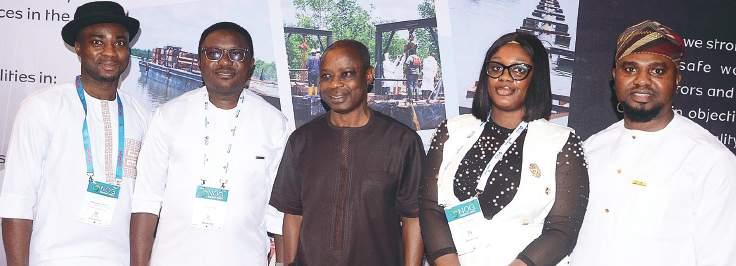
L-R: Manager, Business Development, Pipeline Infrastructure Nigeria, Ms.
The Julius Abure-led Labour Party, yesterday, said the party would convene a National Executive Committee (NEC) meeting for the
sole purpose of expelling its 2023 presidential candidate, Peter Obi. In a swift reaction, the Senator Nenadi Usman-led National Caretaker Committee urged Obi to ignore the rantings of people it described as impostors.
Abayomi Arabambi, a member of the faction, said Obi would be expelled for joining the African Democratic Congress (ADC) coalition.
Speaking on Tuesday during “The
Morning Brief”, a programme on Channels Television, Arabambi said the ex-Anambra governor had committed anti-party activities and no longer had a place in LP.
Arabambi was spokesperson of
The Policy Innovation Centre (PIC), an initiative of the Nigerian Economic Summit Group (NESG), yesterday said that the upcoming Gender and Inclusion Summit 2025, the largest gathering of its type in the country, would ensure that the issues besseting some of Nigeria’s most vulnerable groups are mainstreamed.
Tagged GS-25, the gender and inclusion summit was conceptualised in 2022 as an annual event to provide an inclusive platform to explore transformative ways to advance gender equality, inclusion and gender responsive governance in Africa.
The summit aims to bring together cutting-edge gender-related research and practice providing an
opportunity for attendees to share perspectives, exchange ideas, learn and expand their networks for future policy and programmatic work.
Themed: “New Voices and New Approaches for Accelerating an Inclusive Society”, Executive Director of PIC, Dr Osasuyi Dirisu, stressed that the event will serve as a platform to accelerate progress towards harnessing innovative approaches and amplifying new voices as a strategy for advancing economic and social development for all.
Speaking at a press briefing in Abuja to herald the event slated for September 2 to 4, Dirisu stated that the platform will ensure that usually ignored voices are well represented when the issues of
gender and inclusion are discussed.
“So as we look through evidence, look through literature, it became clearer to us that if our platform, the Gender and Inclusion Summit, is going to be truly inclusive, then we now have to bring those voices into the room.
“ Many times, we programme for inclusive development from our own lens…How then can I ensure that I’m able to reflect on what bringing development to these people exactly what it means? And so this year, we want to explore new voices.
“And by new voices, we mean bringing the critical voices into the room to ensure that we are better solving for problems that have been clearly identified. We also want to ensure that we’re giving voice to
Kuni Tyessi in Abuja
The federal government has declared that any admission into tertiary institutions conducted outside the Central Admissions Processing System remains illegal.
It has also pegged 150 bencmark for university admissions while 100 is for polytechnics and colleges of education in the 2025- 2026 admission.
Education Minister, Dr. Tunji Alausa, gave the directive in Abuja on Tuesday at the 2025 policy meeting of the Joint Admissions and Matriculation Board.
Mr. Alausa therefore warned universities, polytechnics, and colleges of education across the country against illegal admission.
He said institutions and individuals involved in such practices would be prosecuted and severely sanctioned.
“Any admission conducted outside CAPS, regardless of its intentions,
is illegal. Both institutions and the candidates involved in such practices will be held accountable.
“Sanctions may include withdrawal of institutional assets and prosecution of culpable officers or governing council members,” he said.
CAPS, introduced in 2017, automates the admission process to eliminate human interference and administrative bottlenecks.
Mr. Alausa however reiterated the government’s commitment to strengthening transparency, fairness, and accountability in the nation’s tertiary education system.
He explained that while the responsibility for initiating admissions rests with the academic boards of each institution, JAMB, as a statutory regulatory body, is mandated to oversee and regulate the process to ensure fairness and equity.
The minister urged vice-chancellors, rectors, provosts, and governing
councils to intensify oversight functions to prevent unauthorised practices.
He assured that the ministry would monitor compliance closely in collaboration with JAMB.
The minister also reaffirmed the policy mandating the integration of the National Identification Number into the JAMB registration process.
“The NIN requirement has proven vital in safeguarding the integrity of our admission system by curbing identity fraud and multiple registrations. Any abuse of the NIN system will be identified and punished,” he said.
He highlighted the need for data-driven policies in the admission processes.
The minister also presented statistics showing a mismatch between available admission quotas and actual student intake across many programmes, especially in agriculture, education, engineering, and the health sciences.
people who either have been silenced or lack the agency or platform to end their abuse,” she stated.
For the first time in four years, she stated that the platform will veer off the traditional conversations and the prescriptive approach to doing things, whether in terms of leveraging technology or using data differently and raise voices that will help to review and evaluate how policy interventions work for vulnerable citizens.
Also speaking, the Minister of Women Affairs, Imaan SulaimanIbrahim, stated that government agencies were already institutionalising gender responsiveness, and looking at gender budgeting, procurement and every aspect of the work of the government.
the Lamidi Apapa-led faction of LP.
His comments came in the wake of Obi’s attachment to the ADC coalition, a political alliance he said was aimed at strengthening democracy and building a new Nigeria.
Obi had said his decision to join the coalition was not made lightly, adding that the move aligned with his vision of creating an inclusive political alternative.
In reaction, the leadership of the Abure-led LP issued a 48-hour ultimatum, asking Obi to resign from the party for aligning with the ADC coalition. The Abure group stated, “We only have one leadership under Barrister Julius Abure as the national chairman, and Alhaji Farouk Umar Ibrahim as the national secretary.
“Probably, the people you are referring to are those associated with Nenadi Usman, whom Mr Peter Obi has graciously appointed as the chairman of their yam festival committee.”
But in a statement by Ken Asogwa, Senior Special Adviser, Media, to Usman, the faction urged Obi and party members to ignore those they described as impostors.
The statement said, “The attention of the Labour Party has been drawn to plans by a group of political jesters – unknown. to the Party but parading themselves as members – to convene
a kangaroo meeting with the aim of sowing confusion and mischief in the ongoing coalition efforts involving His Excellency, Mr. Peter Obi.
“These impostors, acting on behalf of shadowy interests, intend to purport an expulsion of Mr. Obi from the Labour Party - a move as laughable as it is illegal.
“We urge Nigerians to disregard the desperate rantings of these meddlesome interlopers whose only mission is to undermine the credibility and towering influence of Mr. Peter Obi in the coalition-building process aimed at rescuing Nigeria.
“For the avoidance of doubt, the Labour Party, through a widely circulated statement issued on the 25th of May, 2025, made it categorically clear that Mr. Peter Obi’s involvement in the coalition talks enjoys the full backing and blessing of the leadership of the party.”
The statement added, “The media and the general public are hereby enjoined to ignore these comedians of politics who are merely performing for their paymasters.
“They are well aware that the sun is fast setting on their charade, and their relevance - anchored solely on attacking Peter Obi - will evaporate the moment he completes his signified intention to join the newly birthed platform.”
concerns, particularly on issues of security and infrastructure.
Senator Ireti Kingibe, representing the Federal Capital Territory, has said the forthcoming area council elections in the Federal Capital Territory (FCT) will serve as a referendum on the performance of the Minister of the FCT, Nyesom Wike.
Speaking to news men in Abuja, the senator who represents the FCT said many residents of Abuja are dissatisfied with the minister’s leadership and feel disconnected from his style of governance.
According to her, “Local government elections are coming early next year. That is when the people of the FCT will show minister, ‘we like you or we do not like you.’
“The local government election is going to tell whether Wike controls FCT, because nobody does”, she said.
Kingibe said Wike is out of touch with the needs of residents and has not responded adequately to their
“Most of Abuja is pitch dark. So, I go there, put solar lights in between the places, and light up the place so that young people will at least be safer. They will come give me awards, commend me for looking out for them. It’s not that he wouldn’t have done it too, except he doesn’t know what they need”, she stated.
She explained that communities often reach out to her directly to raise security concerns, and she responds by installing solar lights in public spaces to improve safety.
“I know Karu Market is pitch dark. I put lights there. Communities will write to me: ‘There’s so much insecurity around this place. A few lights will make a difference.’ I put it.
“Solar lights are cheap, but how many can I put? For where I can put one, the minister can put a thousand. Do you see the difference?”, she added.
Responding to Wike’s recent statement that she would not return to the Senate in 2027, Kingibe said she was not desperate for reelection but remained confident in her chances if she chose to contest.
“You know, I was not interested in running, you want to bet? I know for certain that when I decide to run, it’s a sure thing,” she said. Kingibe said residents of the FCT are independent-minded and increasingly united in their resentment towards Wike’s approach.
“It’s only people who have lived here for a long time who know that the people of the FCT have their independent mind.
“You walk on the streets, and you will know that the one thing that unites us all in the FCT is our resentment of the minister.
“It’s not just about development. It’s about treating us with levity, treating us with disregard and contempt”, Kingibe submitted.
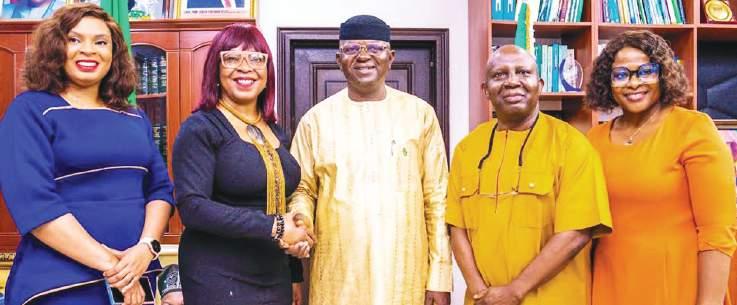
L-R: Corporate Affairs Manager, Nestle Nigeria, Toju Egbebi; Corporate Communications, Public Affairs and Sustainability Lead, Nestle Nigeria, Victoria Uwadoka; Minister of Water Resources and Sanitation in Nigeria, Prof.. Joseph Terlumun Utsev; Global Head and Nigeria National Coordinator, Organised Private Sector in Water, Sanitation and Hygiene, Dr. Nicholas Igwe; and National Vice President, Association of Professional Women Engineers of Nigeria (APWEN) and OPS-WASH Head of Zonal Coordinator, Engr. Nnenna Igwegbe, during a visit to the Minister to discuss partnership on a national Water Quality Advocacy campaign in Abuja ... recently
Seriki Adinoyi in Jos
No fewer than 70 vigilantes have been reportedly killed in a clash with bandits at Kukawa and Bunyun communities of Kanam Local Government Area of Plateau State. Residents of the communities said the clash happened yesterday afternoon about 2pm, when hundreds of vigilantes from Wase Local Government Area were ambushed while on their way to bandits’ hideouts.
Chairman of the vigilante group, Kukuwa, Aliyu Baffa, told journalists that “over 70 vigilantes were killed” in the ambush. Baffa added that more bodies could be recovered in the bushes as they were still searching.
He said the clash occurred just a kilometre away from Kukawa town, when bandits ambushed the vigilantes as they were heading to the hideouts at Government Forest Reserve, which shares borders with Bauchi and Taraba states.
Baffa stated that the remains of some of the vigilantes were recovered from farmlands after the clash.
He said, “We have buried more than 60 of the 70 bodies in Kukawa alone. It’s likely that more bodies could be recovered. Some of the vigilantes who escaped confirmed that they were overwhelmed by the bandits.”
A resident of Bunyun, Musa Ibrahim, who also confirmed the clash, said the bandits attacked the community and killed 10 vigilantes
who were providing security in the area, adding that they also burned many houses in the community.
communities. Muftwang had set up a fact-
finding committee currently working to proffer lasting solution to the menace.
Speaker of the House of Representatives, Hon. Abbas Tajudeen, yesterday, announced that the House of Representatives was contemplating constitutional amendments to allocate 10 per cent of elective positions in the
National Assembly to women and five per cent to individuals with disabilities.
Abbas said if the proposal was approved and signed into law, it would result in the creation of 82 additional seats, 55 in the House of Representatives and 28 in the Senate for women.
Justice Maryann Anenih of the Abuja High Court will on July 17 decide whether former governor of Kogi State, Mr. Yahaya Bello, can go abroad for medical attention. Anenih fixed the above date for ruling on Tuesday, after lawyers representing the former governor and the prosecution made their submissions for and against the grant of Bello’s application for permission to travel abroad in
order to attend to some health issues.
Bello is standing trial in an alleged money laundering case filed against him by the Economic and Financial Crimes Commission (EFCC). He pleaded not guilty to all the charges and had since been admitted to bail.
When the matter came up on Tuesday, his lead lawyer, Joseph Daudu, SAN, drew the court’s attention to an application filed on June 20, 2025, seeking an order
for the release of the 1st defendant/ applicant’s international passport by the Registrar of the court to enable him travel for medical attention.
But counsel for EFCC, Chukwudi Enebeli, SAN, objected to the grant of the application on grounds that it could delay further proceedings.
He added that the application was an abuse of court process since a similar one had already been filed before the Federal High Court in Abuja, where the former governor
was also standing trial.
Responding, Daudu pointed out that the defendant was already enjoying bail from the two courts, and added that it was the complainant that instituted the two separate charges in the separate courts.
“It will be a futile exercise to apply in one court and not to apply in the other court,” Daudu submitted.
After listening to both parties, Anenih adjourned the case to July 17, 2025 for ruling.
During the second edition of House’s Legislative Open Week, Abbas explained that the newly created reserved seats would offer equal rights, privileges, and access to committee work, ensuring that the representatives were fully integrated into legislative activities.
In discussing the broader constitutional amendment process, Abbas revealed that 109 bills were currently under consideration, addressing reforms in electoral, judicial, legislative, and inclusive governance sectors.
He stated, “Among the 12 electoral reform bills are provisions for holding all general election on the same day, allowing independent candidates, and forming a new commission dedicated to local government elections. Meanwhile, 21 judicial reform bills aim to simplify the appeals process and bolster judicial autonomy.”
He emphasised that the heart of the inclusive governance agenda was the establishment of constitutionally mandated reserved seats for both women and persons with disabilities.
According to the proposal, 10 per cent of Senate and House seats
would be set aside for women, distributed evenly across states to ensure geographic balance. These seats would be contested via direct elections on separate ballots, with staggered terms to foster continuity and mentorship.
“For persons with disabilities, five per cent of the seats would be allocated, and candidates would be nominated by certified disability advocacy organisations,” he said. Abbas, while citing historical statistics to underscore the need for such reforms, said, “At independence in 1960, women held fewer than one per cent of National Assembly seats. By 1990, this number had only reached two per cent. With the return to democratic rule in 1999, women’s representation increased marginally to 3.9 per cent in the House and four per cent in the Senate.
“Despite making up half the population, women’s representation has not seen meaningful improvement since then.”
He also pointed to international examples where quotas dramatically improved female participation in governance.
Bassey inyang in Calabar
The Cross River State Government has flagged-off the cultivation of 30 million coffee seedlings across the 18 local government areas of the state, signaling a major leap in the state’s agricultural revival efforts under the leadership of Governor Senator Prince Bassey Otu.
Speaking during the launch ceremony held at state executive council chamber, Otu described the initiative as a bold and strategic move to reposition the state as Nigeria’s coffee capital, and an emerging player in the global coffee market.
The governor said the project aligns with the administration’s “People First” agenda and is aimed at empowering farmers, creating jobs, promoting sustainable liveli-
hoods, and boosting agro-industrial development.
“With 30 million robust and climate-appropriate seedlings being distributed across our 18 local government areas, this project offers much more than cultivation.
“It is about job creation, wealth generation, ecological restoration, and building an inclusive economy,” Otu declared.
He praised the strategic partnership with JR Farms, a globally recognized agrifood company with operations across Africa and Europe, for bringing technical expertise, market access, and international best practices into the project.
He also acknowledged the role of development partners, stakeholders, and local communities whose support has been vital to the project’s
rollout.
With the coffee initiative now underway, Otu expressed confidence that each seedling planted will grow into a tree of prosperity, bringing long-term benefits to farmers, communities, and the entire state.
“Together, we will make Cross River a reference point in agricultural innovation, ethical practices, and green development,” the governor declared.
The governor used the occasion to encourage further investment in the state’s vast agricultural value chains, including cocoa, oil palm, rice, cassava, and livestock. “Cross River remains open for business,” he said, inviting investors to explore opportunities beyond coffee.
The state Commissioner for Agriculture and Irrigation Development,
Hon. Johnson Ebokpo, described the launch as a “historic moment” and a practical expression of the state’s agricultural transformation vision.
He credited the governor’s visionary leadership for driving the initiative and facilitating the partnership with JR Farms.
“The 30 million Robusta and Arabica seedlings will be distributed and cultivated based on ecological suitability,” Ebokpo said.
“This project transcends mere coffee production; it promotes inclusive growth, sustainable investment, ethical practices, and green development,” the commissioner said.
He acknowledged the successful enumeration process led by the ministry and applauded the involvement of traditional rulers,
women, and youth. The Commissioner also thanked Her Excellency, Bishop Mrs. Eyoanwan Bassey Otu, for her role in mobilizing women’s participation in the project.
In his remarks, Mr. Olawale Rotimi, Chief Executive Officer, CEO, of JR Farms Group, praised Cross River’s leadership for creating an enabling environment that made the coffee initiative a reality.
He revealed that JR Farms, which has worked with over 4,000 coffee farmers across East Africa, had considered other Nigerian states for similar investment but found the commitment and organization lacking, until Cross River came calling.
“What we are witnessing today is not just an event, but a demon-
stration of vision, leadership, and commitment that will place Cross River on the global map of coffee production,” he said.
Rotimi outlined JR Farms’ contributions, including technical training, post-planting support, development of coffee washing stations, and a global market access framework for Cross River coffee.
The company is also committed to off-taking the coffee produced in the state and sharing Cross River’s coffee story with the world through media and global platforms. He commended the efforts of the governor, the deputy governor, the Commissioner for Agriculture, and other stakeholders, and expressed gratitude to the French Embassy and international partners supporting the project.
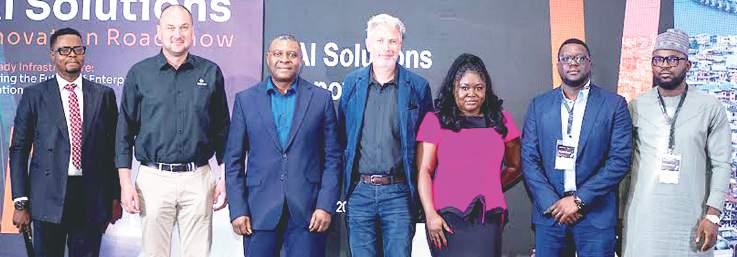
L-R: Director, Africa Hyperscalers, Mr. Temitope Osunrinde; Managing Director, Africa, Vertiv, Mr. Wotjek Piorko; CEO, Kasi Cloud Data Center, Mr. Johnson Agogbua; Technologies Director, Colocation and Hyperscale, Vertiv, Mr. Jon Abbott; Marketing Lead, Central Africa, Vertiv, Ms. Olajumoke Rufus; Country Director, Turner and Townsend, Mr. Gerald Madondo; and Director, Solutions, Mr.
Oshadami, during the Vertiv AI Solutions Innovation Roadshow held in Lagos… recently
The Renewable Energy Service Providers of Nigeria (RESPON) yesterday kicked against a recent warning by the federal government against the installation of rooftop solar panels in the country.
The position of RESPON was contained in a press statement signed by its President, Osaze Ize-Iyamu, who noted issuing a blanket warning against rooftop solar installations without proper clarification may
unintentionally discourage the adoption of clean energy.
But he acknowledged that as a coalition of licensed and experienced renewable energy professionals, it fully acknowledged the government’s concerns regarding safety, quality assurance, and the need to protect Nigerian households from substandard solar products and unqualified installers.
“However, we believe that issuing a blanket warning against rooftop solar installations without proper clarification may unintentionally
one of the most ambitious fiscal overhauls in the country’s history.
discourage the adoption of clean, decentralised energy solutions at a time when Nigeria faces critical power supply challenges.
“Rooftop solar is globally recognised as a vital and scalable solution for households, SMEs, and institutions seeking reliable and sustainable power. We support efforts by government agencies such as NEMSA and SON to ensure installations meet safety and quality standards. However, the focus should be on strengthening enforcement, not discouraging legitimate and professionally executed
ADC: T I nubu’S FAI lure b e HI n D u S’ Snub; APC: ADC IS ‘MorTA llY Woun D e D ’ recording. Minister of Information and National Orientation, Mohammed Idris, said this yesterday in a statement in light of the political discourse ahead of the 2027 election.
He said the Tinubu administration remained undeterred, focused, and committed to building a more prosperous Nigeria for all and would not be drawn into distractions engineered by those who would prefer stagnation over reform.
Idris reaffirmed that Tinubu was committed to the core mandate of his administration, which was delivering meaningful reforms and real economic growth for the Nigerian people, rather than being bogged by distraction of coalition by some political big wigs in the country.
While asserting the right of all Nigerians to freely exercise their constitutionally guaranteed freedoms of association and of speech, the minister stressed that the Tinubu administration would not be provoked by politicking or political distractions.
Idris said, “The clamour in the media about the emergence of a new political ‘coalition’ is understandable, but Nigerians entrusted President Tinubu with a bold and transformative mandate, anchored in the Renewed Hope agenda.
“In just two years, this vision has already begun yielding tangible results. Crude oil theft has plummeted, investor confidence in the oil and gas sector is rebounding, inflation is easing, the Naira is stabilising, security challenges are being confronted head-on, and millions of Nigerians—households, students, artisans, small business owners—are benefitting from initiatives such as student loans, access to consumer credit, CNG vehicle conversions, and improved government services and infrastructure.”
The minister recalled that Tinubu recently signed into law four groundbreaking tax reform bills, marking
He added that the reforms that were set to be implemented from 2026, would significantly boost prosperity for households and businesses nationwide.
Idris said, “Just before then, the President commissioned the single largest mechanisation drive ever undertaken in Nigeria’s history— marking the launch of the Renewed Hope Agricultural Mechanisation Programme.
“This is just one of several highimpact agricultural mechanisation programs being undertaken to guarantee food security.”
APC: Tinubu Won’t Give Valuable Time to Confusion in Mortally Wounded ADC
APC said there was no reason for Tinubu or the ruling party to spend valuable time and energy trying to sow confusion within ADC, a party it said was already mortally wounded by confusion delivered by its invaders.
National Publicity Secretary of APC, Felix Morka, in a statement, said ADC was unsurprisingly trudging the beaten path of lies and deception, like opposition Peoples Democratic Party (PDP) and Labour Party (LP).
Citing “credible intelligence”, ADC had claimed that state chairmen in the North-east and North-west zones of the country were summoned to a “secret meeting with officials of the federal government”, in a plot to intimidate and coerce the opposition coalition.
But Morka stated, “Beyond the rash of poorly imagined accusations, the statement did not offer substantiation of any kind. Its vague reference to ‘officials of federal government’ only belies
the mischievous intent of its makers to whip up sentiments, manipulate public opinion, and distract Nigerians from the patent hopelessness of their political phishing expedition.
“Otherwise, why is it so impossible for ADC to provide Nigerians the details of the alleged secret meeting at which its senior party officers were coerced and intimidated. Rather, the party cites nonsensical credible intelligence as basis for its devious allegations.
“Clearly, there was no such meeting, and certainly, no one could have been coerced or intimidated at a meeting that never was. This could have happened only in the warped imagination of masters of deception and marauding invaders of the ADC.”
APC said, “There is no reason for Mr. President or APC to expend valuable time and energy trying to sow confusion within ADC that is already mortally wounded by confusion delivered by its invaders.
“The ADC needs no help from our great party to unravel as it must from its own internal dissonance, contradictions and discord of self-serving and vainglorious personalities that executed a gestapo-like takeover of the party to the chagrin of bonafide leaders and members of the party.
“The ADC’s statement is just a calculated pre-emptive excuse for its evident ill-fated future of disintegration, like Humpty Dumpty whose great fall could not be put back together again.”
Morka added that the party had placed on public display the incompetence and inability of its leadership to manage its impending internal crisis, in the same way they proved incapable of managing the internal affairs of opposition parties they had plundered serially before ADC.
rooftop systems,” the group added. RESPON encouraged the federal government to collaborate with industry associations in promoting certified training programmes and developing a national registry of approved installers to safeguard consumers and professionalise the sector.
Besides, it urged regulators to intensify crackdowns on counterfeit solar products and unscrupulous actors while enabling market access for reputable local providers committed to global best practices.
Rather than general warnings, RESPON recommended targeted public sensitisation to educate citizens on how to identify certified professionals and quality components for solar installation.
RESPON stated that it remains committed to working with all relevant ministries, agencies, and stakeholders to build a safer, well-regulated, and vibrant solar ecosystem, stressing that it is open to a roundtable dialogue with the government to co-create solutions that support Nigeria’s renewable energy targets under the Energy Transition Plan (ETP).
Rooftop solar, when done right, it said, is not a risk, but a lifeline for millions of Nigerians, noting that it is the reason that like-minded renewable energy business operators came together in Abuja Nigeria and
set up an organisation.
Ize-Iyamu stated that the organisation was set up to encourage and provide support to renewable energy professionals to meet on a regular basis through workshops, symposia and lectures.
Meanwhile, the Nigerian Communications Commission (NCC) has formally inaugurated the NCC-REA Collaboration Committee, marking a step towards advancing Nigeria’s digital and energy inclusion objectives by developing modalities for the deployment of renewable energy to support telecom infrastructure in Nigeria.
The inauguration, held at the NCC Headquarters in Abuja recently, was presided over by the Executive Vice Chairman and Chief Executive Officer of the NCC, Dr. Aminu Maida, who was joined by the Managing Director of the Rural Electrification Agency (REA), Abba Aliyu, along with senior executives and committee members from both organisations.
In his address, Maida described the collaboration between NCC and REA as a timely and strategic alignment of national priorities, aimed at bridging the connectivity and power gaps that continue to limit development in Nigeria’s rural and underserved areas.
He noted that while telecommunications infrastructure would
require reliable and sustainable energy to function optimally, renewable energy solutions would also benefit from the demand generated by expanding digital services and connected communities.
According to Maida, “Whether it is powering a base station or enabling a child to access digital learning, this partnership has the potential to transform realities and bring opportunity closer to the people.
“This initiative is about more than infrastructure - it is about driving inclusion, bridging inequalities and creating the conditions for shared prosperity,” he remarked.
Through this collaboration, we are supporting His Excellency, President Bola Ahmed Tinubu’s Renewed Hope Agenda by ensuring that no community is left behind in Nigeria’s digital and energy transformation.”
He charged the committee members to approach their assignment with clarity, innovation, and a shared determination to deliver tangible results.
Speaking on behalf of REA, Aliyu expressed optimism about the transformative potential of the collaboration, reaffirming REA’s commitment to working closely with NCC to unlock sustainable development opportunities for millions of Nigerians living beyond the reach of traditional infrastructure.
Sylvester Idowu in Warri
Coordinators of Tantita Security Service Nigeria Limited and President Generals of all Urhobo Communities yesterday rejected the call by the leaders of Urhobo Progress Union (UPU) on the federal government to terminate the running contract of oil pipeline surveillance awarded to the company.
At a press briefing, held yesterday at Ughelli and attended by over 3000 Tantita employees, the coordinators and president generals unanimously passed a vote of confidence on the management of Tantita Security Services Nigeria Limited and Tompolo.
They noted the services of Tantita have engaged more Urhobo youths, and communities than ever experienced.
The Urhobo leaders and coordinators were reacting to a
call by some said youths under Urhobo Youths Progress Union calling for the termination of the contract awarded Tantita Security Services Limited and award same to their ethnic group.
The leaders and coordinators held that over 3,500 Urhobo youths are currently being employed by Tantita from 88 communities in 16 Kingdoms of Urhobo land.
According to the statement read by Daniel Okpetsagha, PG, Ugborhen Community, “As of today, Tantita employes over 3,500 Urhobo indigenes covering 88 Urhobo Communities in 16 Urhobo Kingdoms, making Tantita the highest employer of labour in Urhobo land.
“Anyone familiar with Tantita’s operations knows that all oil-bearing communities participate directly in securing facilities within their territories.
“In Ijaw land, they provide the
bulk of patrol teams; the same is true of the Itsekiri, Isoko, Kwale and most certainly Urhobo-communities.
“Almost 4,000 Urhobo indigene earn a monthly wage as Tantita operatives and coordinators. From Iwhremeragha to Unenurhie, from Kokori to Oguname-Olomu, from Ovwiamuge-Agbarho to Ugbomro, from Mosogar to Ibada-Elume to Arhavwarhien, Tantita is on the ground through Urhobo indigenes. These communities amongst many others are protecting the nation’s national assets in collaboration with Tantita.
“Every single kilometer of pipeline traversing Urhobo land is protected by Urhobo indigenes 100%. Every community in Urhobo land has been given slots as operatives and coordinators and are responsible for the safekeeping of the pipelines in their domain”, they added.

L-R: Managing Director (MD), Agbeyewa Farms, Seyi Aiyeleso; MD, National Agricultural Land Development Authority, Segun Adebayo, Chairman, Senate Committee on Agriculture, Senator Saliu Mustapha; Director-General, Nigeria/China Strategic Partnership, Joseph Tegbe, and Vice President/Executive Director, Government and External Affairs, Cavista Holdings, Olumide Olayomi, at the 2025 World Cassava Day celebration in Abuja...recently
Emmanuel Ugwu-Nwogo in
Umuahia and Omon-Julius
Onabu in asaba
Abia State Government has launched security operation targeted at wiping out cult activities and drug abuse across the state.
The decision to hit hard on cult groups was taken by the
State Executive Council, the highest decision making body in the state, during its meeting last Monday. Similarly, worried by the worsening incidence of abuse of hard drugs and other illicit substances especially by youths in Asaba and environs, the Asagba of Asaba, Obi Prof Epiphany Azinge (SAN), has
Olawale Ajimotokan in abuja
The Nigeria Union of Teachers (NUT) FCT wing has called off the ongoing strike by primary school teachers in the FCT over the non-payment of its nine months arrears and the new minimum wage salary.
The calling off of the strike was contained in a communique issued at the end of an emergency State Wing Executive Council (SWEC) meeting of NUT FCT Wing in Abuja on July 4.
The communique was signed by the State Chairman, Abdullahi Shafas, Secretary Mrs Margaret
Jethro and Publicity Secretary Ibukun Adekeye. It said the emergency session resolved to call off the strike after it deliberated on the offer by the FCT Minister Nyesom Wike, who though conceded that the payment of teachers salary was the responsibility of the Area Councils, however, offered the release of the Area Councils’ six months 10 per cent FCT accrued Internally Generated Revenue (IGR) amounting to N16 billion to augment the payment of the New Minimum Wage for June and 60 per cent of its nine months arrears.
Dike Onwuamaeze
The Executive Director of CIG Motors Group, Mr. Arogundade Bankole, has doled out scholarship awards to 25 Nigerian university undergraduates during the “Jubril of Lagos Scholarship Award Ceremony 2025.” Bankole, who is the “Jubril of Lagos,” said that the scholarship award is his own way of giving back to the society as a fellow recipient of scholarship award that enabled him to study Information Technology at the Eastern Mediterranean
University of Cyprus.
He said that it was scholarship award that opened the doors of foreign university to him when his mother could not afford to sponsor his quest for tertiary education after finishing his O’Level with 7As.
He said: “Education is very important and giving education to people is like giving them hope.
“I work as an executive director of CIG Motors Group that assembles, sells automobiles. We are now into partnership with the Lagos State Government for the LagRide project.”
LaleyeDipoinMinna
The Niger State House of Assembly has passed into law the establishment of the Hydrocarbon and Minerals Development Agency bill.
This is just as a People’s Democratic Party (PDP) member of the satate House of Assembly defected to the All Progressives Congress (APC). The bill was passed after the chairman of the Assembly Committee on the Environment and Climate Change, Minerals Resources,
Power, and Renewable Energy, Alhaji Mohammed Nura Garba, presented its report to the committee of the whole. In the report, the committee enumerated the benefits of the proposed Bill, including encouraging investments in the hydrocarbon sector, promoting economic growth through hydrocarbon and minerals development, enhancing environmental management and protection, and ensuring revenue generation for the state through hydrocarbon activities.
begun exploring collaborative avenues with the Delta State Government to tackle the menace headlong. There have been noticeable upsurge in cult activities in the
state in recent time. Last week, members of a cult group were at the verge of killing a youth in Umuahia, the capital city, before security agents intervened and saved the victim.
At Uturu, a cult-related killing was reported when persons suspected to be cultists opened fire and shot dead a man riding on his motorbike.
The state Commissioner
for Information, Prince Okey Kanu, told journalists that security agencies in the state have been given the go-ahead to deal decisively with the perpetrators of the cult violence.
Linus Aleke in abuja
The Nigerian military, however, regretted that regional and sub-regional operations in the continent of Africa lack underpinning doctrines and concepts.
The Defence Headquarters (DHQ) has unveiled a plan to develop a joint doctrinal template to comprehensively tackle the menace of insurgency, terrorism, banditry, kidnapping, transnational organised crime and other emerging security threats in Nigeria, West Africa, and by extension, the continent of Africa.
Speaking at the official unveiling of the Armed Forces of Nigeria’s Joint Doctrine and Warfare Centre in Abuja yesterday, the Chief of Defence Operations, Major General Emeka Onumajuru, stated that the newly established centre will fill this identified gap by developing doctrines and concepts that will drive multinational joint task forces in Economic Community of West African States (ECOWAS) and African Union (AU) operations. General Onumajuru said: “The establishment of the joint doctrine and warfare centre is borne of the need to consolidate jointness in the Armed Forces of Nigeria and to address inherent challenges in some joint operational areas.
Kemi Olaitan in Ibadan
Oyo State Commissioner for Culture and Tourism, Dr. Wasiu Olatubosun, has said the commitment of Governor ‘Seyi Makinde to developing the tourism sector and ensuring that it forms a key component of his economic expansion agenda has
yielded many positive results in the last two years.
This is just as he pointed out that with the government putting in place key tourism enablers such as road infrastructure, security and the political will as well as the creation of the Ministry of Culture and Tourism in 2023, the state has witnessed
tremendous turnaround in the tourism sector.
He added that the turnaround has also led to increased tourists inflow as well as a massive boost in the hospitality sector, noting that while the state had a record of 1,328 hospitality businesses as of May 29, 2019, the number of investments in hospitality businesses increased to 12,128 by December 2024.
Olatubosun, who stated this during the Omituntun 2.0 Inter-Ministerial Briefing in Ibadan, noted that the last two years of Governor Makinde’s second term of office has also seen Oyo State recording an influx of tourists.
Segun Awofadeji in Bauchi
The Bauchi State Government has announced plans to set up an audit committee to investigate the management of Sa’adu Zungur University, Gadau, with a focus on all funds collected from students and other internal revenue sources.
As part of immediate actions, the government has also relieved the university’s acting Bursar, Ayuba Mohammed Gital, of his appointment over alleged irregularities surrounding his engagement.
The state Governor, Bala Mohammed, made these announcements while receiving the report of the Visitation Panel constituted to address the lingering industrial disputes within the university.
The governor noted that although the government had previously refrained from interfering in the financial operations of the institution, it would now take decisive steps to ensure transparency and accountability in the university’s affairs. He commended the panel for its thorough work and actionable recommendations assuring the state that the report would be presented to the State Executive Council for deliberation and necessary action.
David-Chyddy
Eleke in awka
Anambra State Governor, Professor Chukwuma Soludo, has told Anambra indigenes resident in the US that criminals terrorising the South-east were not Fulani but Igbo.
There has been speculation that most of the kidnap activities
taking place in the South-east were done by Fulani terrorists living in bushes in the zone and disguising as herdsmen.
But addressing indigene of Anambra in the US during a town hall meeting in Maryland, the governor insisted that 99.99 percent of criminals arrested in Anambra were not Fulani, but Igbo.
Soludo stated, “The so-called liberators hiding in the forests are home-grown criminals feeding fat on blood money. They come under the guise that they are the ones protecting you from Fulani herdsmen.
“They live in the bushes for months, but no one has ever asked how these so-called liberators survive in the forest. They have to feed, who is paying for their services, don’t they have needs?
“In my three years and three months in office, 99.99 per cent of the kidnappers and other criminals we’ve arrested are Igbo. Let’s stop the lies. Igbo are kidnapping and killing fellow Igbo, not Fulani.”
The Administrator of the Presidential Amnesty Programme (PAP), Dr. Dennis Otuaro, has urged the people of the Niger Delta to support the declaration of the leaders of the South-South All Progressives Congress (APC) to support President Bola
Tinubu for a second term.
Otuaro spoke while reacting to the position of the South South APC leaders and governors to adopt President Tinubu as their sole candidate in the 2027 presidential election in an interview with journalists in Abuja yesterday.
The PAP boss said that what the South-South APC leaders and the governors did was the right way to reward a sincere and committed leader who has shown, in practical terms, his love for the region and the people.
Leaders of the APC in Edo, Delta, Cross River and Akwa Ibom States in collaboration with other members of the party in the South-South zone had met in Benin on July 5, 2025 where they unanimously endorsed President Tinubu for a second term in office.
Super Eagles striker Victor Boniface is edging closer to a potential switch to AC Milan with initial talks already underway between the Italian giants and the player’s representatives.
According to Soccernet.ng, Boniface, who has made a positive impression with Bayer Leverkusen since joining the club, is said to be open to a permanent move to the San Siro, where he could link up with fellow Nigerian international Samuel Chukwueze.
Sources close to the negotiations reveal that preliminary discussions have taken place between Milan officials and the forward’s camp. With this, a strong mutual interest in completing the transfer.
Transfer expert Sacha Tavolieriearlier reported that the 24-year-old has “opened the door” to the move, while Italian outletLa Gazzetta dello Sportconfirmed that AC Milan have officially “entered negotiations” to sign the Nigerian.
Chelsea have beaten Fluminense 2-0 to reach the FIFA Club World Cup final.
They will play either Real Madridor European champions Paris Saint-Germain in Sunday’s final at MetLife Stadium.
Joao Pedrowas the star of Tuesday’s game. The £60million ($81.5m) signing from Brighton & Hove Albionscored two wonderful goals either side
of the half-time break to send Chelsea through.
But the game ended on a sour note for Chelsea as the superb Moises Caicedo suffered a concerning-looking ankle injury.
That win puts Chelsea’s earnings from this tournament up to a minimum of $104 million if they finish as runners-up on Sunday, rising to $114 million if they win the final.
The annual Value-Jet Lagos World Para-Table Tennis Championship which is in its sixth edition will serve off today at the Molade Okoya Thomas Sports Hall of the Teslim Balogun Stadium, Surulere, Lagos.
At the Press conference to herald the competition, President of the Paralympic Committee of Nigeria, who is the brain behind the Lagos Valuejet Para Table Tennis Open, Sunday Ojebode, said everything to make this year’s edition a huge success have been put in place, just as he confirmed that seven countries, among which are Ghana, Togo, Benin, Cote d’Ivoire have sent in entries for their participation in the event.
On his part, the Chief Operating Officer (CEO) of the African Table Tennis Federation (ATTF), Dr. Kweku Tandoh, thanked Ojebode for his perseverance and consistency at getting the tournament going inspite of all the daunting challenges.
“This is the first of the five backto-back table tennis competition to be held in Lagos and we’re really looking forward to a wonderful tournament. Lagos will be agog for table tennis in the next one month,” Tandoh noted.
One of the top players participating in the tournament, Faith Obiora hailed Value-Jet for consistently supporting the tournament, saying it has discovered many table tennis talents for Nigeria.
One of Nigeria’s representatives in the CAF Champions League, Rivers United Football Club of Port Harcourt have confirmed participation in the forthcoming Eko International Cup.
SKI-Hi Entertainment in collaboration with the Lagos State Government is staging the competition expected to feature a total of eight teams.
The pre-season football tournament which is to run between July 13 and 20 will take place at the Mobolaji Johnson Stadium, formerly Onikan Stadium with two matches to be played on a daily basis.
In a letter addressed to the organis-
ers and signed by Club Secretary, Ahmed Abdulrahman, Rivers United acknowledged receipt of invitation, adding that the team will participate with a strong squard in readiness for the new season.
“We are thrilled to accept your invitation letter to participate in the upcoming pre-season tournament.
We are honoured to be part of this prestigious event and look forward to competing with top-notch teams.
“Our team is committed to give its best performance. We appreciate the opportunity as we confirm our participation,” the letter read in parts.
permanent transfer of Osimhen to the RAMS Park in Istanbul.
Galatasaray Vice President, Abdullah Kavukcu, is expected in Italy within the next few hours to lead face-to-face discussions with Napoli officials.
The top transfer source hinted that
Galatasaray are now ready to pay the full €75 million release clause on Osimhen contract with Napoli although to be spread over three years at €25 million annually.
Crucially, Osimhen now appears to have resolved any doubts about his future. The 26-year-old forward has reportedly informed Galatasaray of his desire to stay, turning down a record-breaking offer from Saudi
Arabian club Al-Hilal, who had tabled a jaw-dropping €40 million per year for four seasons—€160 million in total for the Nigerian.
Despite the financial lure, Osimhen is said to prioritise competing in the UEFA Champions League, and per their recent success by winning the Turkish league title, this is something Galatasaray can offer.
Earlier this week, Galatasaray

terms of the
However, the Turkish club returned with renewed urgency, buoyed by Osimhen’s commitment and the backing of local sponsors ready to support the financial package. Napoli also rejected the improved €60million offer.
It is the insistence of Napoli on the payment of the full €75million release clause that made the Turkish Lig team to do this latest offer of ready to pay the entire release clause but spread over three years.
The Turkish champions have also agreed to pay the striker an annual salary of €15million with a signing-on bonus of €10million.
Osimhen had long been linked with a move to the Premier League, with Manchester United and Liverpool among his top suitors.
But neither club has made a formal offer this summer, which has allowed Galatasaray to move ahead in the race.
The player’s reported acceptance of a €16 million annual salary also shows his willingness to continue with the Turkish champions, who are planning to build their Champions League campaign around him.
Should the two clubs reach an agreement in the coming days, Osimhen’s transfer move is set to become one of the biggest in Turkish football history.
The Napoli pre-season training camp opens a week from today and Osimhen’s future will have to be resolved before then.
The release clause of the player will also expire same day and thereafter, it will be left for Napoli to decide on the transfer fee they will receive that is if they are unable to arrive at an agreeable terms before then.
Duro Ikhazuagbe
Newly appointed General Manager of Kano Pillars FC, Ahmed Musa, has dismissed reports in social media linking him with gifting officials and players of the Sai Masu Gida with brand new Toyota Land Cruiser SUVs.
The Super Eagles Captain, in a post on his official handle on X , dismissed the reports as not true.
“It has come to my attention that false information is being circulated claiming that I distributed cars to players and officials following my appointment as General Manager of Kano Pillars Football Club. This
claim is entirely untrue,” observed the new Kano Pillars GM.
He urged news men to always verify their reports from credible sources before rushing to press.
“I urge the public, media outlets, and individuals on social media to verify information from credible sources before sharing.
“Spreading unverified news not only misleads the public but also undermines the integrity of the club and its leadership,” stressed the former Leicester City winger.
Ahmed Musa hinted that his immediate task now as new helmsman of the Kano club, “is to focus on
building a strong, disciplined, and successful Kano apillars FC. Thank you for your understanding and continued support,” concludes Ahmed Musa on X yesterday evening.
Earlier in the day, the social media was agog with the news that Ahmed Musa gïfted all the players and officials new Toyota Land-cruiser jeeps as he assumed office as General Manager.
Musa’s appointment was confirmed by the Kano State’s government last Saturday and he assumed office this week.
The Super Eagles forward was part of the club’s playing staff last season.

Sabalenka survives Siegemund’s scare to reach semis

Two-time defending champion Carlos Alcaraz produced a Wimbledon masterclass to end British hope Cameron Norrie’s run and move into the semi-finals once again.
Second seed Alcaraz underlined why he is the tournament favourite with a scintillating 6-2 6-3 6-3 win.
The Spaniard will face Taylor Fritz - the American fifth seed bidding for a first major title - in the last four.
Victory over Norrie marked a 23rd win in a row for Alcaraz, who is bidding to become the fifth man to win three successive Wimbledon titles in the Open era.
“I’m really happy – to play another Wimbledon semi-final is super special,” said Alcaraz, who secured victory in one hour and
Fritz secured his place in the Wimbledon semi-finals for the first time with a 6-3 6-4 1-6 7-6 (7-4) victory over Russia’s Karen Khachanov. Alcaraz is seeded behind Italian rival Jannik Sinner because of their respective world rankings, but his superior record on grass courts - and current hot streak - makes him the man to beat.
39 minutes. Elsewhere, World Number One, Aryna Sabalenka, narrowly avoided a seismic shock as she fought back to beat Laura Siegemund and claw her way into the Wimbledon semi-finals. Title favourite Sabalenka had to twice come back from a break down in the deciding set to beat the 37-year-old German 4-6 6-2 6-4. Sabalenka has reached the final of the past three majors and, with most of her rivals falling in the first week of SW19, she has an incredible chance of reaching Saturday’s showpiece.

L-R: Deputy Comptroller-General, Nigerian Immigration Services (NIS),Ayeni Afolayan; Comptroller-General,NIS, Kemi Nandap; Minister of Water Resources & Sanitation, Prof. Terlumun Utsev; Permanent Secretary, Ministry of Interior; Dr. Magdalene Ajani; Honourable Minister of Interior, Dr. Olubunmi Tunji-Ojo; Permanent Secretary, Ministry of Industry, Trade and Investment, Mr. Richard Pheelangwah; Secretary, Civil Defence Correctional Fire and Immigration Services Board, Abdulmalik Jibrin, and Deputy Comptroller- General,NIS, Ada James Umanah, at the inauguration of Ministry of Interior Passport Front Office in Abuja…yesterday

On Tuesday, July 29 it will be the 50th anniversary of the overthrow of General Yakubu Gowon GCFR. He was overthrown in a bloodless military coup on the same Tuesday, July 29, 1975. Most of us remember where we were at 6.00 a.m. on Tuesday, July 29, 1975, when the Commander of the Brigade of Guards made the following announcement.
“Fellow countrymen and women, I, Colonel Joseph Nanven Garba, in consultation with my colleagues, do hereby declare that in view of what has been happening in our country in the past few months, the Nigerian Armed Forces decided to effect a change of the leadership of the Federal Military Government.
As from now, General Yakubu Gowon ceases to be head of the Federal Military Government and Commander-in-Chief of the Armed Forces of Nigeria. The general public is advised to be calm and to go about their lawful duties.
However, in view of the traffic situation in Lagos area, all workers other than those on essential services like NEPA, Medical Services, Water Works, NPA, the P & T, all workers and all Tanker Drivers will observe today, 29th of July, 1975, as a work free day.
A dusk to dawn curfew is hereby imposed until further notice. Nigeria Airways operations are suspended and all Airports and Borders are closed till further notice. Fellow countrymen, this has been a bloodless operation and we do not want anyone to lose his or her life. You are therefore warned in your own interest to be law abiding. Anyone caught disturbing the public order will be summarily dealt with.
We appeal to everyone to co-operate in the task ahead. Further announcements will be made in due course. Long live the Federal Republic of Nigeria.”
On a personal note, on that day I rushed to see my friend, late Richard Tokunbo Amayo of THE NIGERIAN OBSERVER, who was living nearby at Isale Ososami, Oke-Ado, Ibadan, to discuss what Colonel Garba has just announced on the radio. I was then the Western state Chief Correspondent for the Kwara Government state owned newspaper, THE NIGERIAN HERALD.
Colonel Joseph Garba (17 July 1943 – 1 June 2002) was from Langtang in the then Benue-Plateau state which was near Gowon’s aboriginal village in Angas.
As a lieutenant in November 1964, Joe Garba was originally handpicked (by then Lt. Col. Yakubu Gowon) from the 4th battalion in Ibadan, to the Federal Guards Company where he became the second-in-command to Major Donatus Okafor. He remained there until July 1965 when he was posted to 2 Brigade HQ as GSO III under Major Emmanuel Ifeajuna who served as Brigade Major to Brigadier Zakari Maimalari from the present Yobe state.
General Yakubu Gowon (Rtd.) (90) GCFR ruled Nigeria uninterruptedly for nine years.
On October 1, 1970, General Gowon announced a six-year nine-point plan, which he said, must be accomplished “before the government of the country can be handed over with a full sense of responsibility”. The points were as follows: reorganization of the armed forces; implementation of a national economic development plan, including reconstruction of war damaged areas, eradication of corruption; establishment of more states; adoption of a new constitution; introduction of a formula for allocating revenue; completion of a national census; organization of national political parties; and elections at federal and state levels.
However, in another nationwide broadcast on October

1, 1974, General Gowon announced that the 1976 date was ‘unrealistic,’. He failed to announce a new date. He was overthrown because he broke his pledge to the people.
While declaring a state of emergency, on May 27, 1967, during which he created twelve states, General Gowon declared “My duty is to all citizens. I propose to treat all sections of the country with equality. The main obstacle to future stability in this country is the present structural imbalance in the Nigerian Federation. Even Decree No. 8 or Confederation or Loose Association will never survive if any one section of the country is in a position to hold the others to ransom.”
General Gowon then appointed twelve governors of which only two of them are still alive. Those alive are Brigadier General Christpher Oluwole Rotimi (Rtd.) of defunct Western state (90) and Lt Commander Alfred Papapreye Diete-Spiff (Rtd.) of defunct Rivers state (82), the Amayanabo (King) of Twon-Brass, Bayelsa State.
The other governors he appointed from time to time and who have answered the final call were Mr. Joseph Dechi Gomwalk (13 April 1935– 15 May 1976) (Benue/ Plateau), Brigadier Musa Uman (Rtd.) (1940-1991), North East, Brigadier Abba Kyari (Rtd.) (17 November 1938 – 25 November 2018), North-Central, Brigadier Femi David Lasisi Bamigboye (7 December, 1940-21 September, 2018), Kwara state, Brigadier Jacob Udokaha Esuene (1936-1993), South Eastern state, Anthony Ukpabi Asika (28 June 1936-14 September 2004), administrator, East Central state, Brigadier Mobolaji Olufunso Johnson (Rtd.) (8 February, 1936- October 30, 2019), Lagos state, Major General Robert Adeyinka Adebayo (9 March 1928 – 8 March 2017) Western state, Alhaji Usman Farouk (1932-18 December 2020), North West, Lt. Colonel David Akpode Ejoor (10 January 1932 – 10 February 2019) and Colonel Samuel Osaigbovo Ogbemudia (17 September 1932 – 9 March 2017), Mid-West State and Alhaji Audu Bako (1924-1980), Police, Kano state.
The interesting thing is that General Yakubu Gowon survived them all including most of his Ministers, who were then classified as Federal Commissioners.
Those of the Federal Commissioners still alive are Brigadier Olusegun Obasanjo GCFR (Works and Housing) (88), Colonel Ahmadu Alli (Education) (89) and Alhaji Lateef Olufemi Okunnu (Works and Housing) (92). Those of them who are now deceased were Major-
General Eyo Okon Ekpo( Agriculture and Natural Resources), Professor Adebayo Adedeji (Economic Development and Reconstruction), Dr Okoi Arikpo (External Affairs), Alhaji Aliyu Usman Shehu Shagari (Finance) GCFR, Brigadier Emmanuel Olumuyiwa Abisoye (Health), Colonel Mohammed Inua Wushishi (Industries), Chief Edwin Kiagbado Clark(Information), Mr Adamu Suleman(Internal Affairs), Brigadier Henry Edmund Olufemi Adefope (Labour), Mr Gabriel Chukwuemeka Akwaeze(Trade) and Captain Olufemi Olumide (Transport).
Others were Colonel Dan Suleiman(Special Duties), Chief Anthony Enahoro (Special Duties), Alhaji Shettima Ali Monguno (Mines and Power), Major General Hassan Usman Katsina (Labour), Mallam Aminu Kano (Health), Chief Joseph Sarwan Tarka (Communications), Brigadier Murtala Mohammed GCFR (Communications), Chief Abudu Yesufu Eke (Education), Chief Obafemi Awolowo(Finance) GCFR, Dr. Taslim Elias (Justice), Mr. B.O. Mafeni (Agriculture and Rural Development), Chief Wenike Opurum Briggs (Education and later Trade), Colonel I.D. Bisala (Defence) and Mr. Russel Aliyu Barau Dikko (Mines and Power).
During General Gowon’s tenure, for the first ten months there was no FEDERAL CABINET. Permanent Secretaries dealt directly with General Gowon. That was during the era of Super Permanent Secretaries. Except for Chief Phillip Chikwuedo Asiodu (91) almost all of them have passed on.
Under General Gowon, there was the Central Planning Office, under the Ministry of National Planning and Reconstruction. That office was the engine room of the second and third development plans.
Other top government officials who worked with General Gowon in that Planning office were Owelle Gilbert Prince Obiajulu Chikelu (94), Chief Samuel Oluyemisi Falae (87), Chief John Odigie Oyegun (86), Chief John Dikenwiwe Edozien (born April 20, 1943), Boye Ilori, Wole Okunfulure, Gbenga Tiamiyu, Chief Ayo, Dr. Chukwuemeka Ezeife (20 November 1937 – 14 December 2023) and others.
There were other Permanent Secretaries who worked directly with him including the then Secretary to the Government, Chief H. A. Ejueyitchie, an Itsekiri from the then Mid-West, Chief Ufot Ekaette (his private secretary for 8 years), Alhaji Yusuf Gubir, Chief Allison Ayida, Chief Charles Olatunde Lawson, Ime James Ebong, Alhaji Musa Daggash, Abdul Aziz Atta, Chief Stanley Olabode Wey, S.S. Waniko, Chief Eniolorunda Ojumu, Mr. B. Popo, Imafidon Akade, Prince Solomon Akenzua, M. A. Tokunboh, Chief B.M. Okagbue, Chief Edwin Ogbu, Chief Victor Adegoroye, E. E. Nsefik, Alhaji Umaru Sanda Ndayako, who later became the 12th Etsu Nupe from 1978-2003 and others.
General Gowon also worked with the members of the Federal Public Service Commission in which Alhaji Sule Katagum was the chairman. Other members were Dr. Samuel Manuwa, Alhaji Yusuf Jega and Dr. L.O. Wochia.
During General Gowon’s tenure, Nigeria had the finest civil servants that any country could boast of. At that time, they were the envy of Africa and the Commonwealth of nations.
Mention must be made of Chief Jerome Oputa Udoji, Chief Augustus Oladipo Adebayo, Chief Peter Odumosu, Chief Simeon Olaosebikan Adebo, Chief Christopher Sunday Olatunde Akande, Chief Samuel Oyewole Asabia, Chief Sam Epelle, Mr. M.I. Alege, Mr. L. A. Nsefik, Mr. Benjamin Akinnusi Osunsade, Dr. Christopher Kolade, Chief N.U. Akpan, Chief D.P. Lawani, Alhaji Ali Akilu,
Chief (Mrs) Folayegbe Akintunde-Ighodalo (17 December 1923 – 14 February 2005), the first woman Permanent Secretary and lots of them. There were other top officials like Mr. C. Olumese, Mr. Gboyin Alabi, Mr. Olufemi Akande, Mr. Nyalander, Chief Olu Awotesu (Registrar of Ships), Mr. Felix Bankole Cardoso (Accountant-General at that time), father of the present Governor of Central Bank of Nigeria (CBN), Chief (Mrs.) Ebun Oyagbola (Accountant), Mr. Adeyinka Samuel George Nelson (government’s Printer) and others. On January 2, 1975, General Yakubu Gowon appointed the following as Permanent Secretaries. A.S.N.Egbo (Cabinet Secretariat), Yaya Abubakar (Political), Dr. J.O. Adekunle (Economic), Mrs. F.Y. Emmanuel (Public Service), M. Saidu Gwarzo (Police Affairs), B.S. Oloruntoba (Agriculture and Rural Development), F.M.C. Obi (Civil Aviation), I. Akade (Co-Operatives and Supply), S.A. Musa (Health), Festus I. Adesanoye (Housing, Urban Development and Environment), A. Fika (Internal Affairs), J. Taggert (Social Development, Youth and Sports), J. A. Adeyeye (Trade), M.E.P. Udebiuwa ( Works) and J.D. Ogundele (Justice).
Others were S. O. Williams (Communications), Sunday B. Awoniyi (Defence), I.J. Ebong (Economic Development), A. Lima Ciroma (Education), G. A. E. Longe (Establishments), J.T.F. Iyalla (External Affairs), I.M. Damcida, Ahmed Joda (Industries), A. Tatari-Ali (Information), S.O. Koku (Labour), G.A. Ige (Mines and Power), P.C. Asiodu (Petroleum and Energy), Y. Gobir (Transport) and Dr. Bukar Shaib (Water Resources).
In overthrowing General Yakubu Gowon, on the evening of July 30th, 1975, Brigadier General Murtala Ramat Mohammed (8 November 1938 – 13 February 1976) declared “Fellow Nigerians the events of the first few years have indicated that despite our great human and material resources, the government have not been able to fulfill the legitimate expectations of our people. Nigeria has been left to drift. This situation, if not arrested, would inevitably have resulted in chaos and even bloodshed.
“In the endeavour to build a strong, united and virile nation, Nigerians have shed much blood.
The thought of further bloodshed, for whatever reason must, I am sure, be revolting to our people. The Armed Forces, having examined the situation, came to the conclusion that certain changes were inevitable. After the civil war, the affairs of state hitherto a collective responsibility, became characterised by a lack of consultation, indecision, indiscipline and even neglect.”
“Indeed, the public at large became disillusioned and disappointed by these developments. This trend was clearly incompatible with the philosophy and image of a corrective regime. Unknown to the general public, the feeling of disillusionment was also evident among members of the armed forces whose administration was neglected but who, out of sheer loyalty to the Nation, and in the hope that there would be a change, continued to suffer in silence.”
“Things got to a stage where the head of administration became virtually inaccessible even to official advisers; and when advice was tendered, it was often ignored. Responsible opinion, including advice by eminent Nigerians, traditional rulers, intellectuals, et cetera, was similarly discarded. The leadership, either by design or default, had become too insensitive to the true feelings and yearnings of the people. The nation was thus plunged inexorably into chaos.”